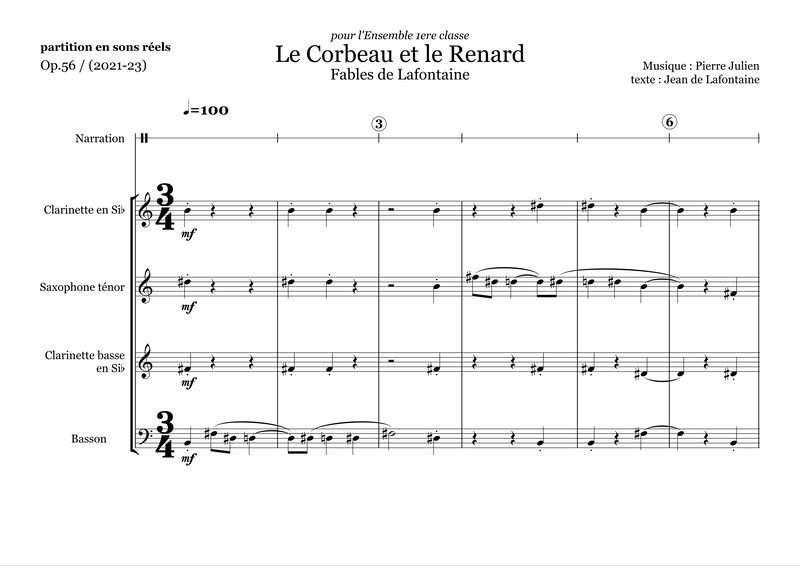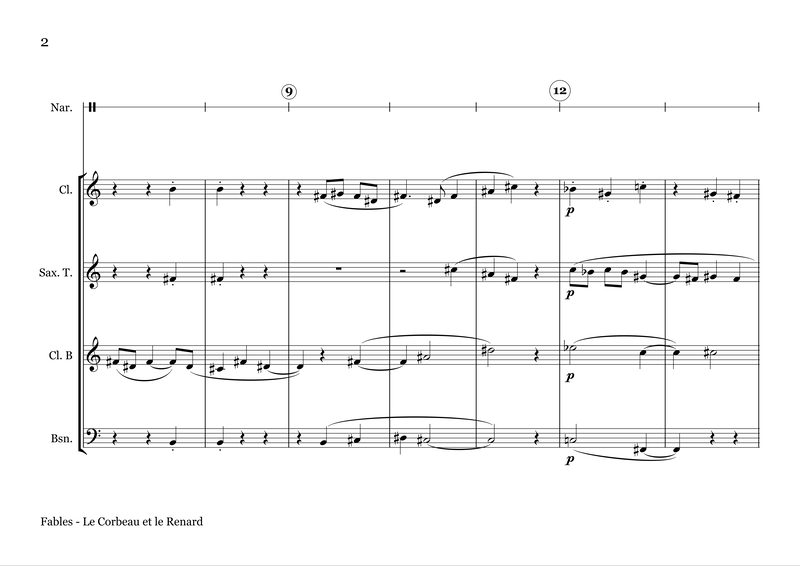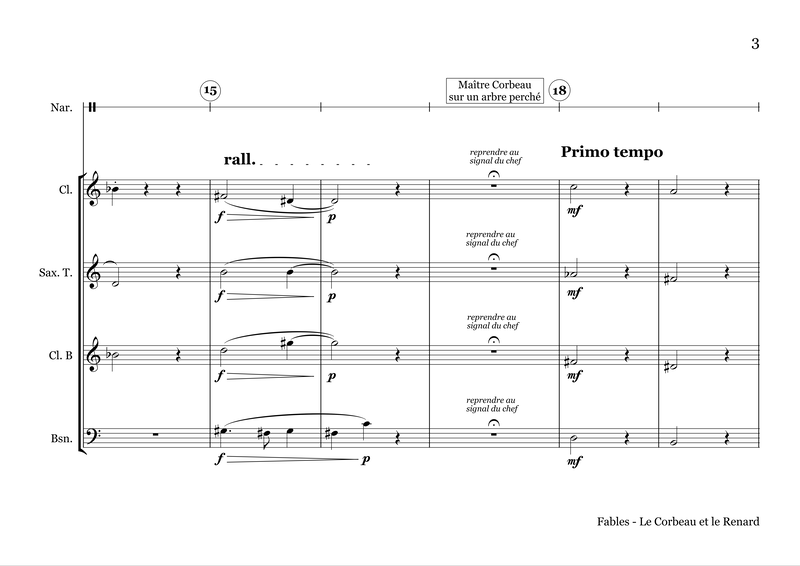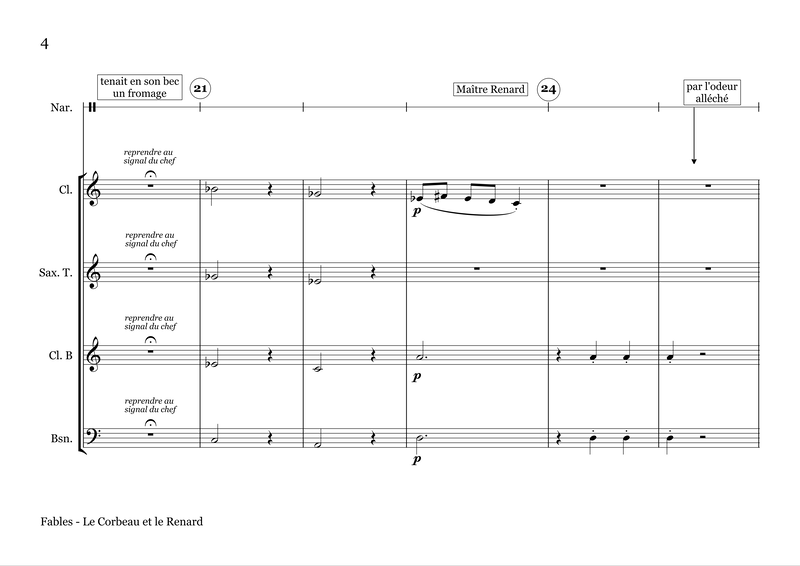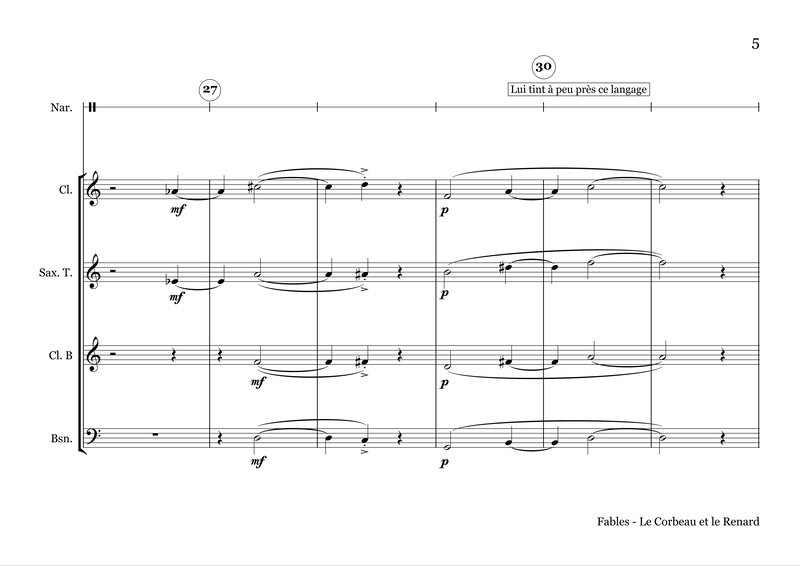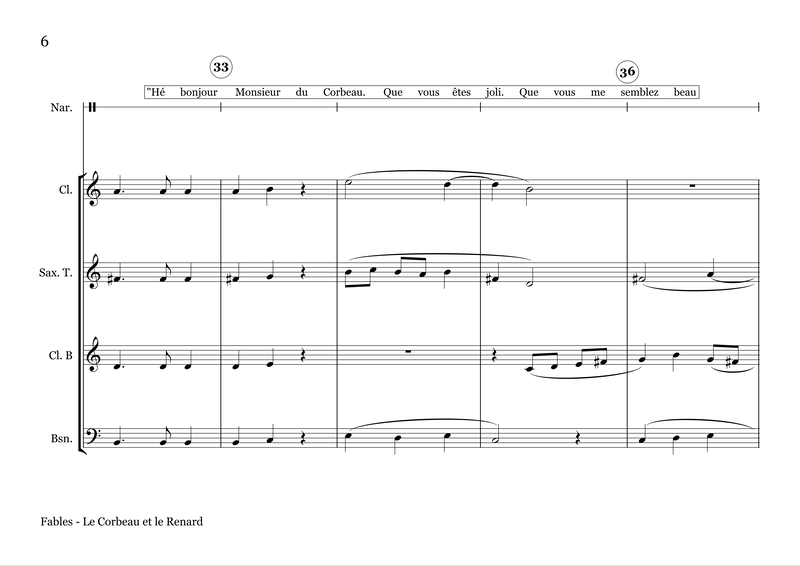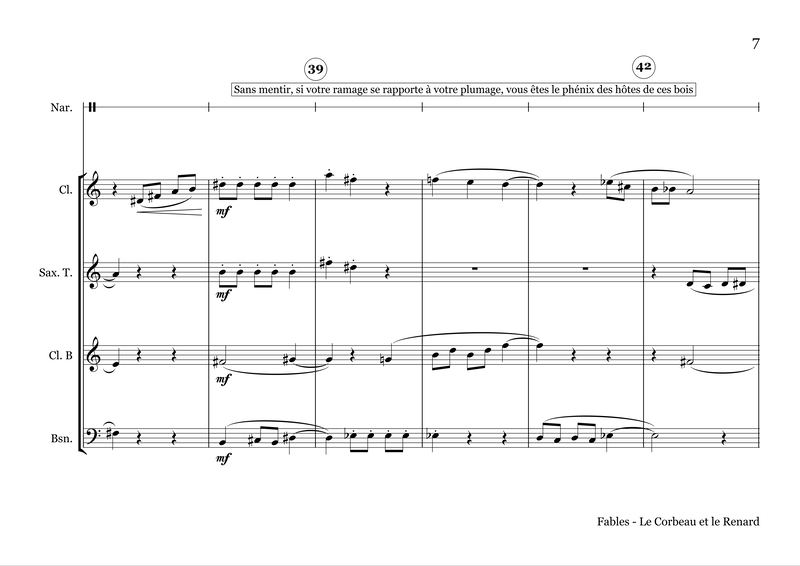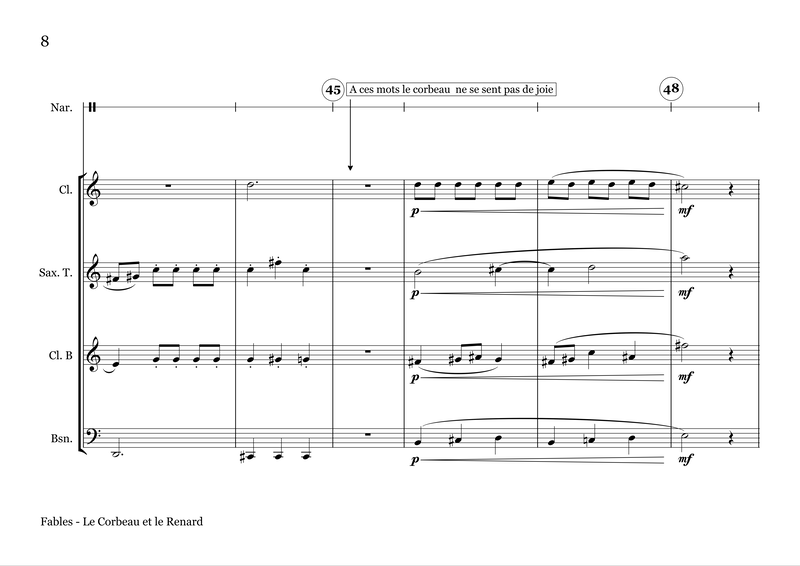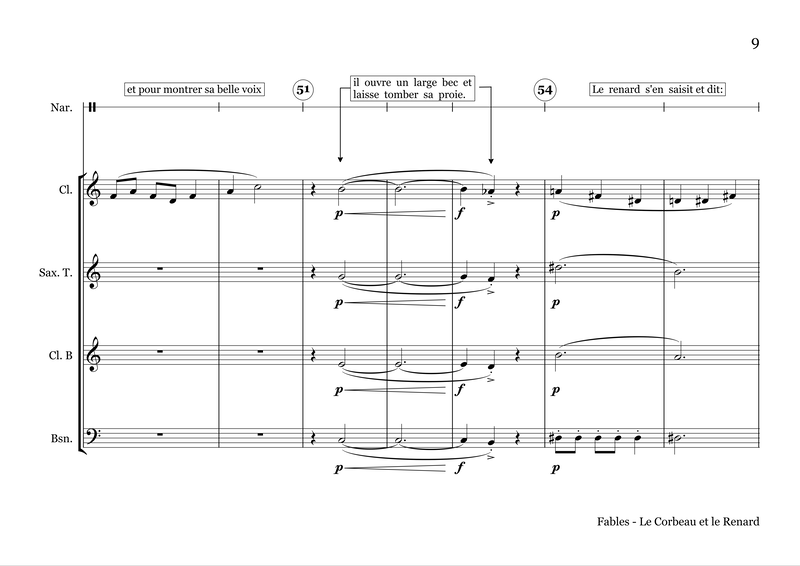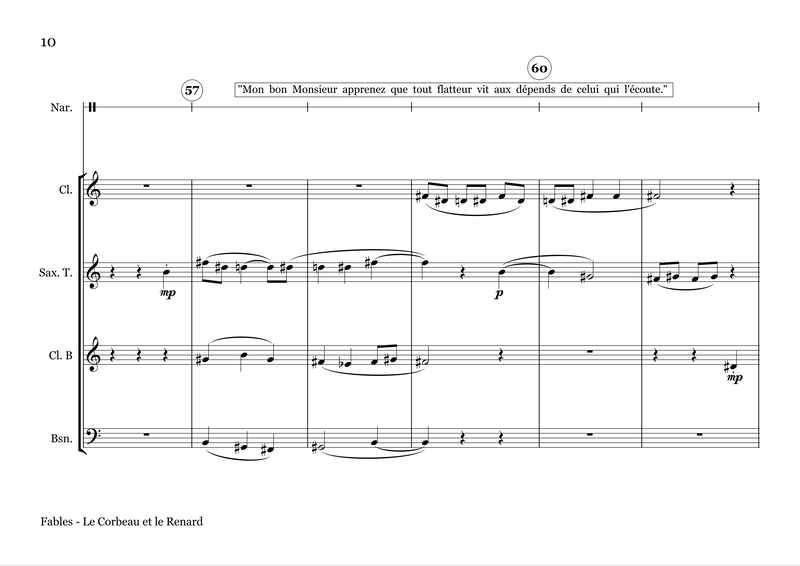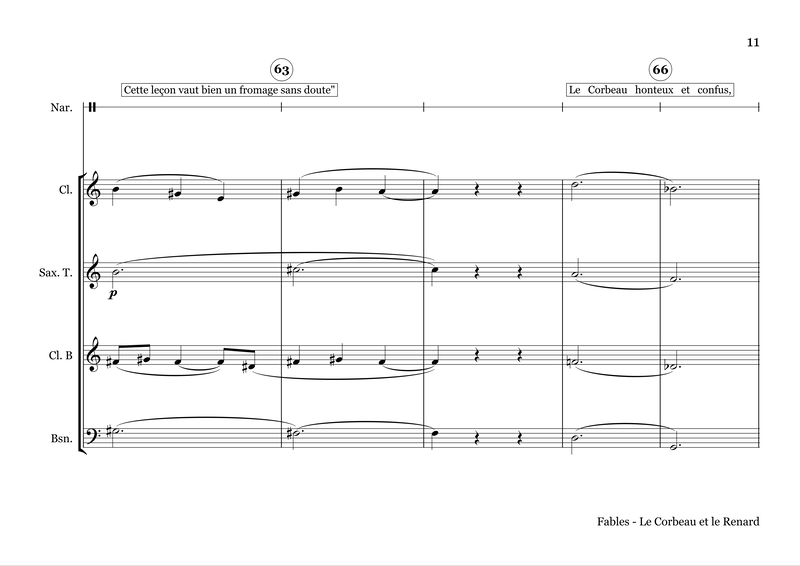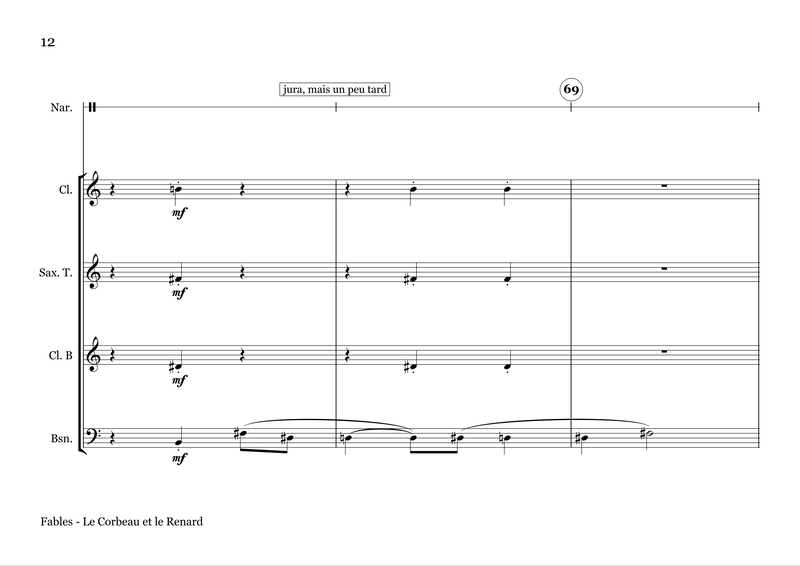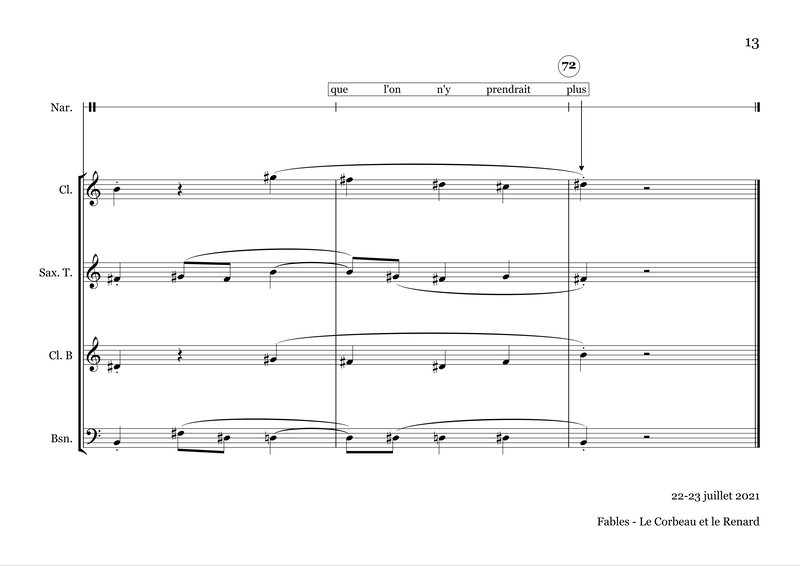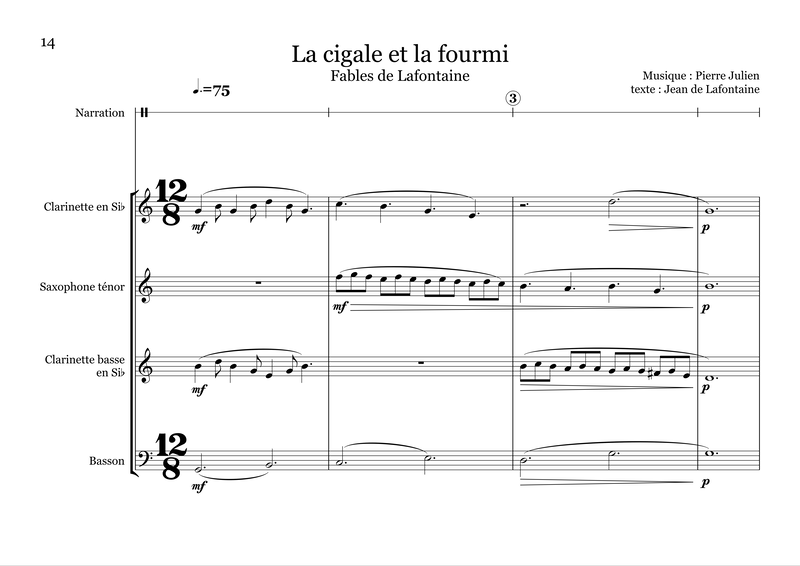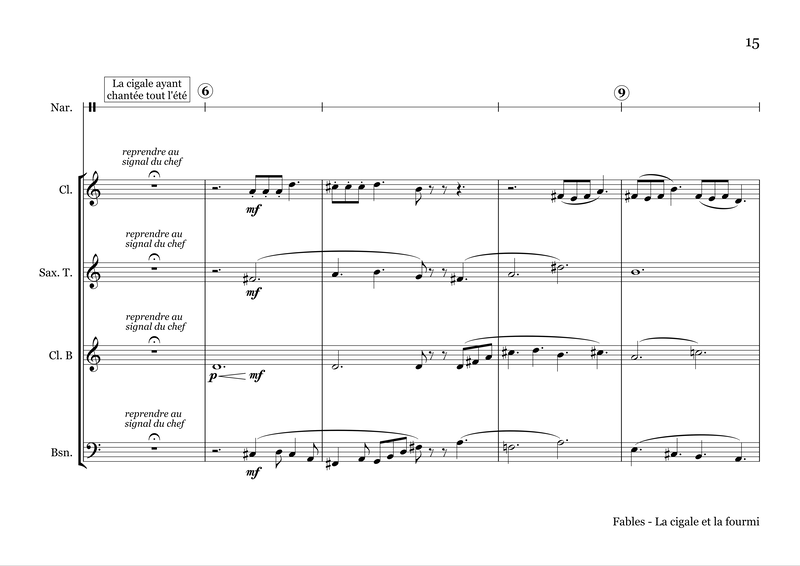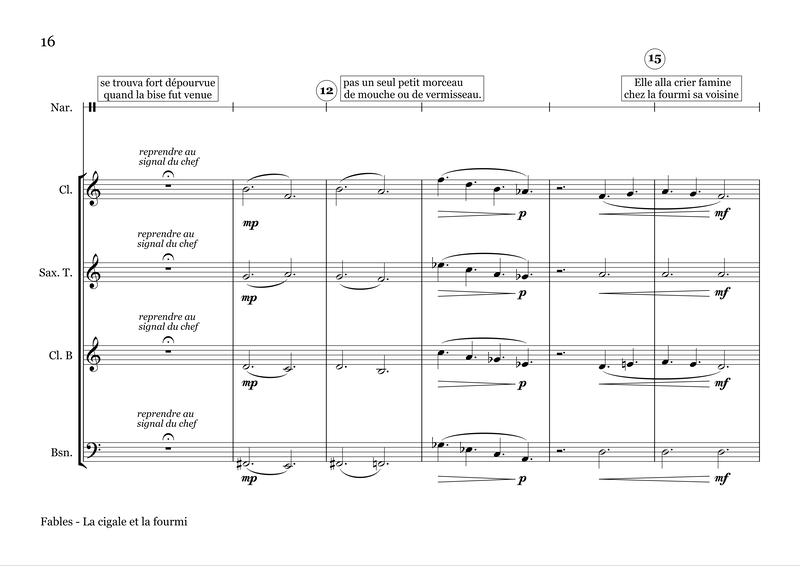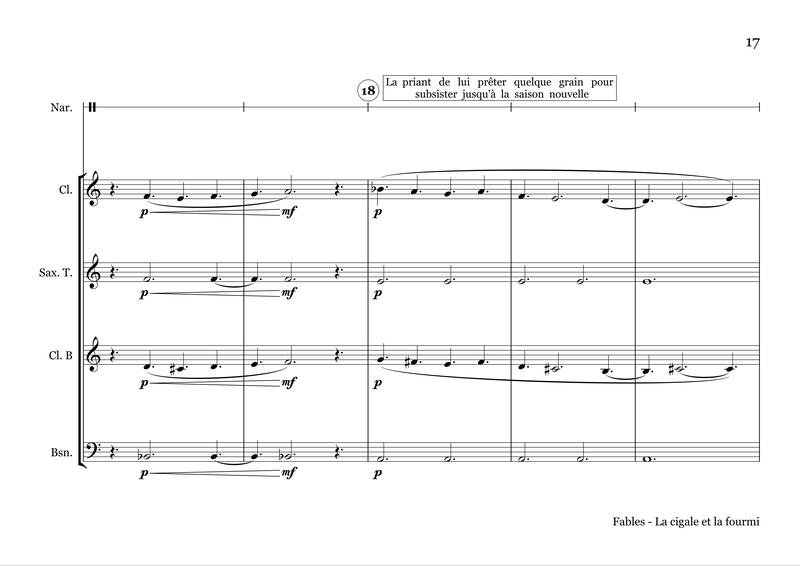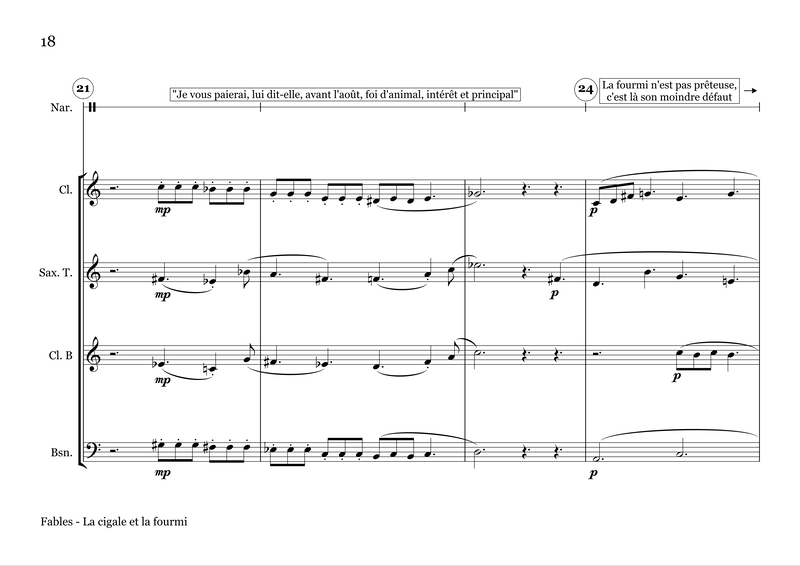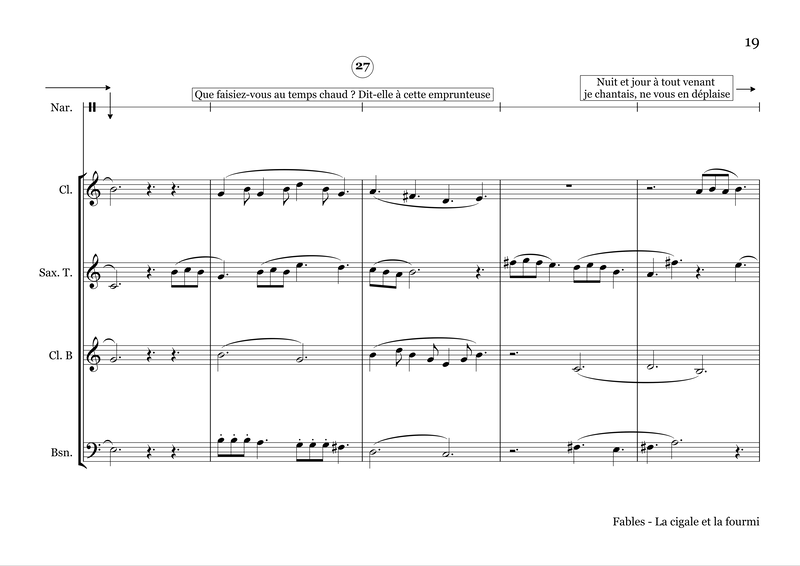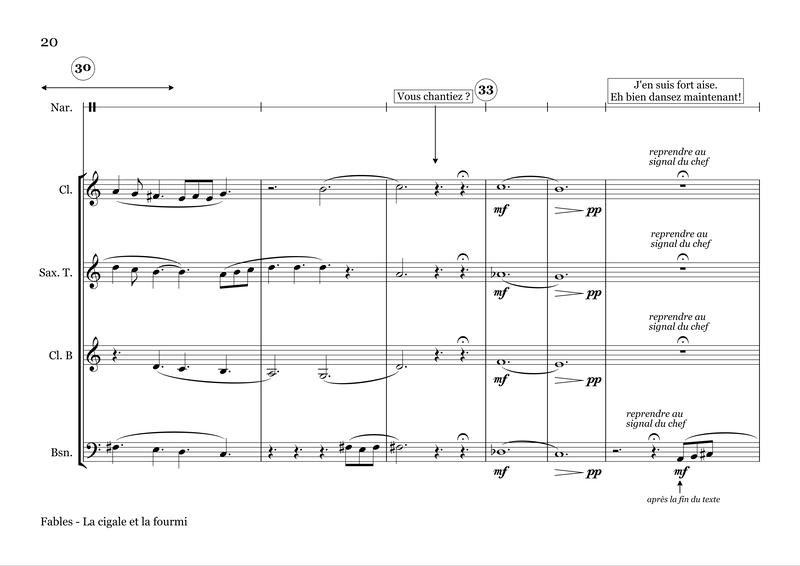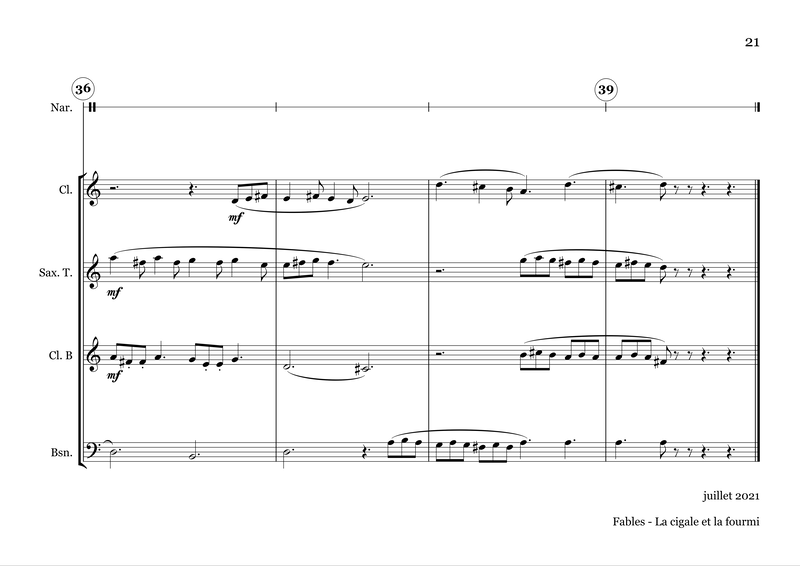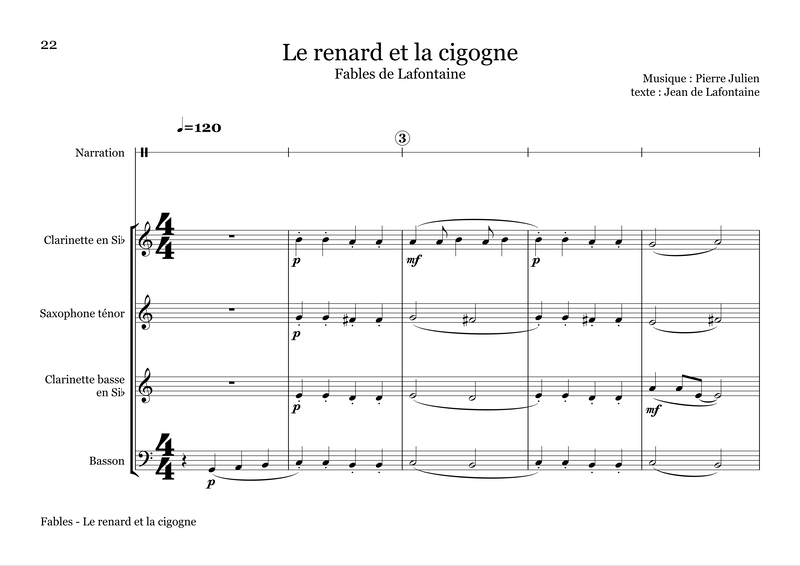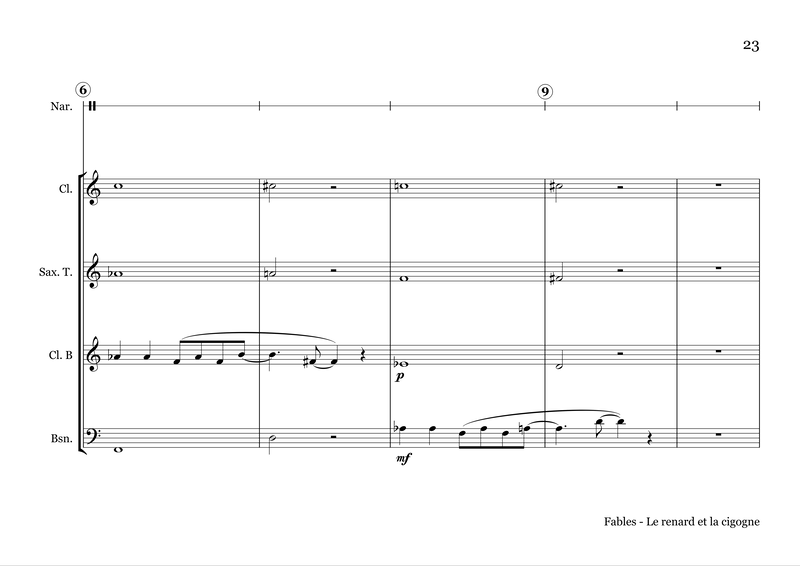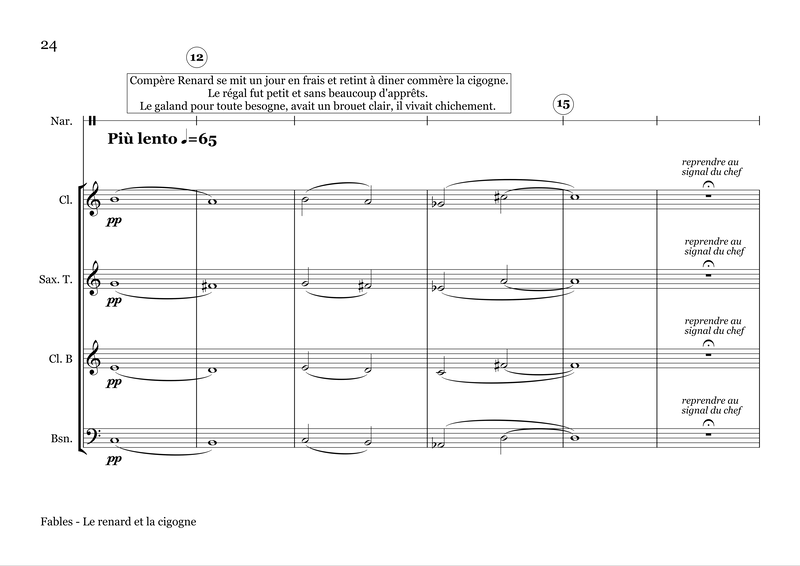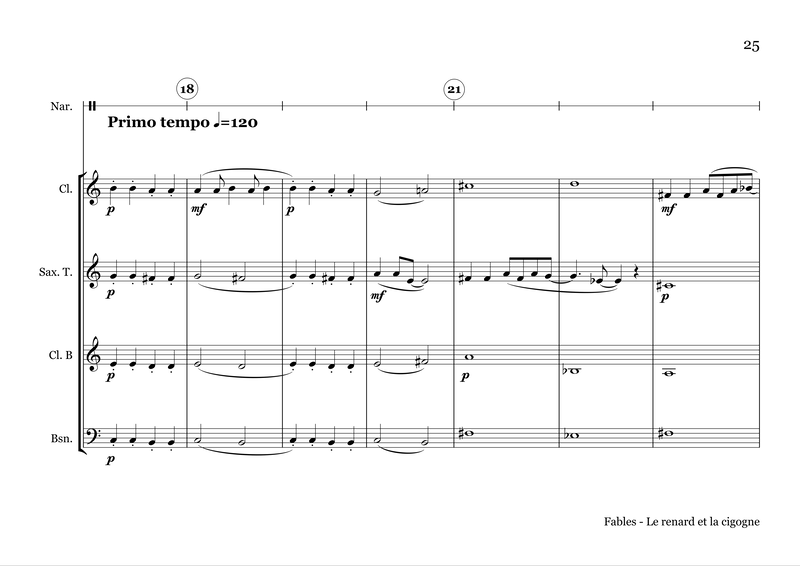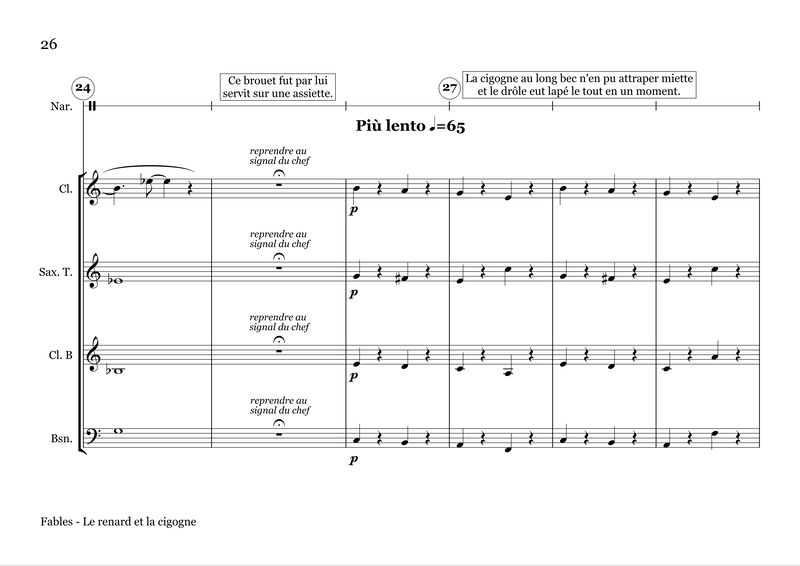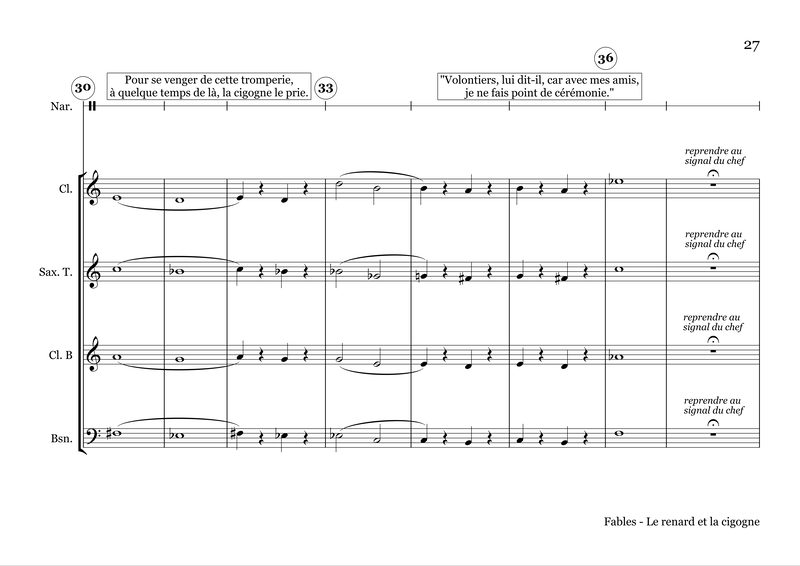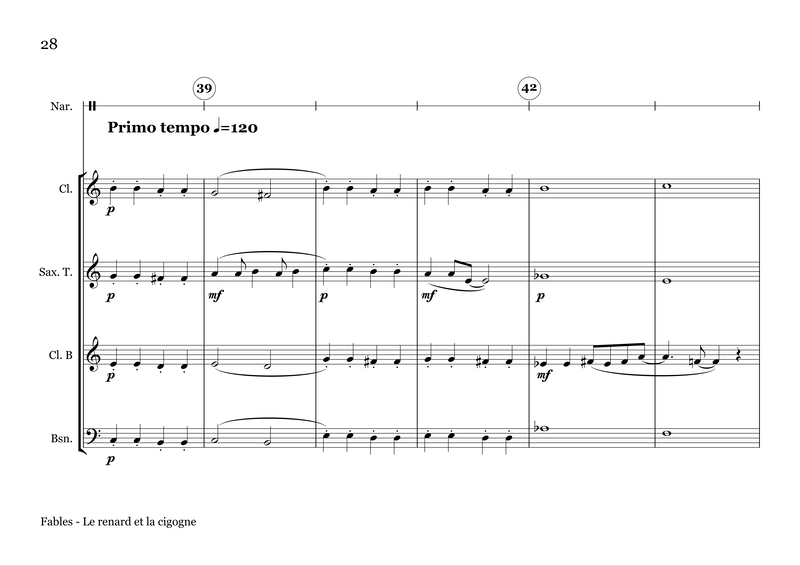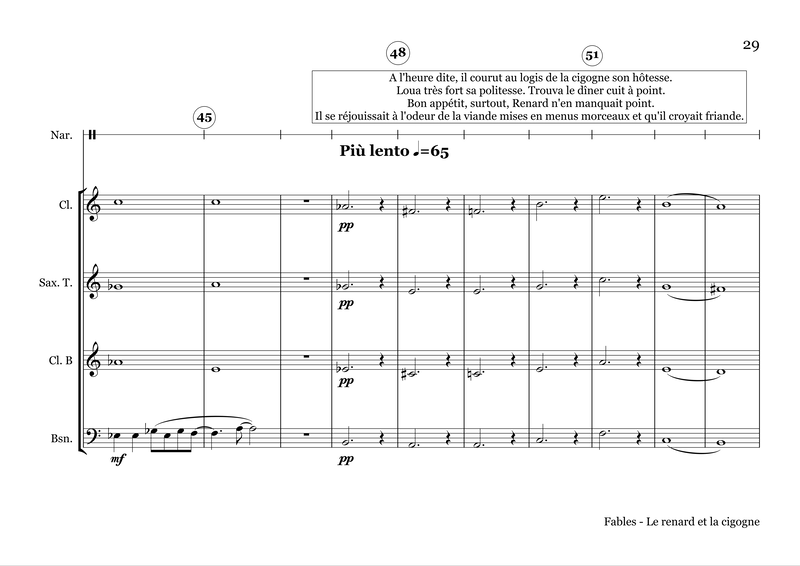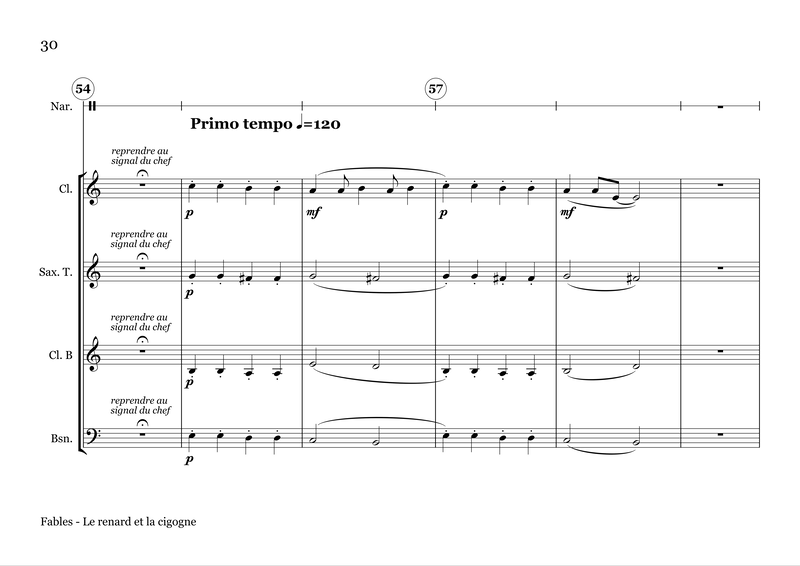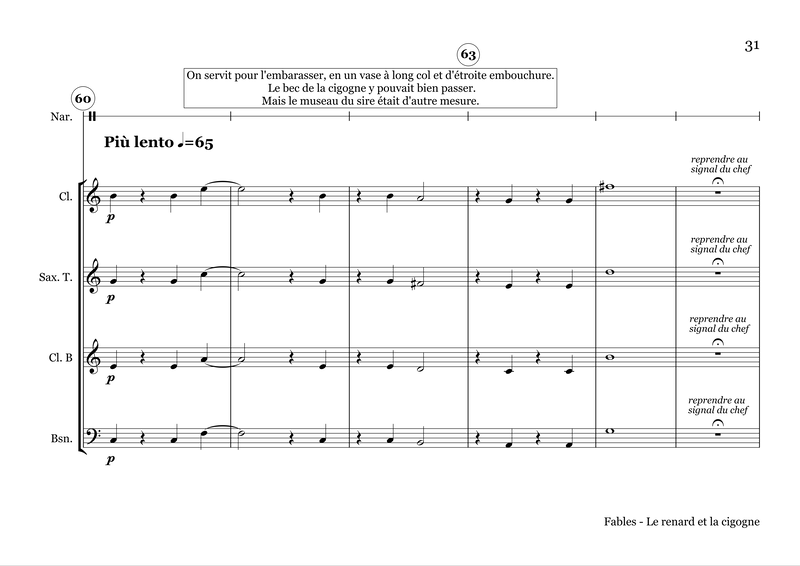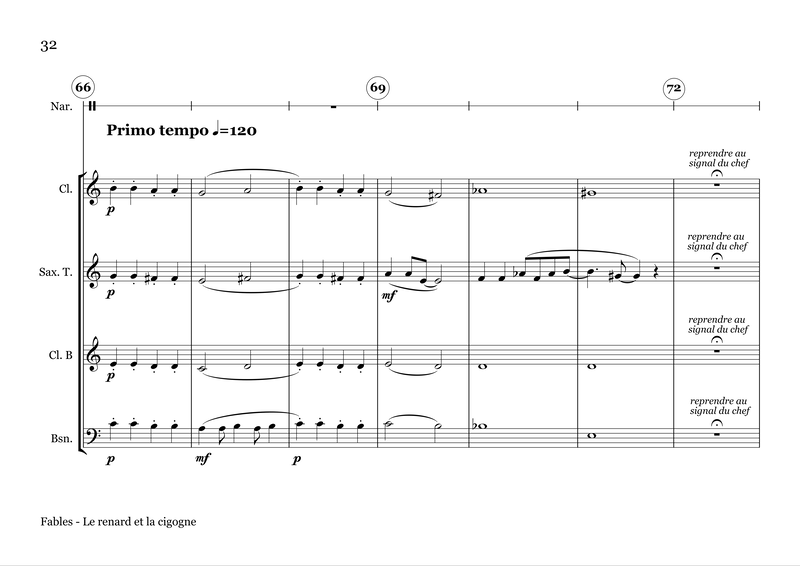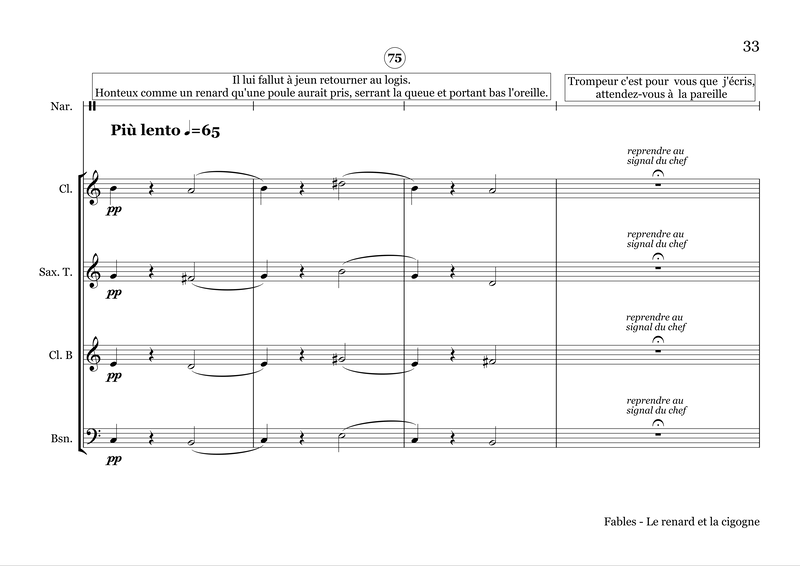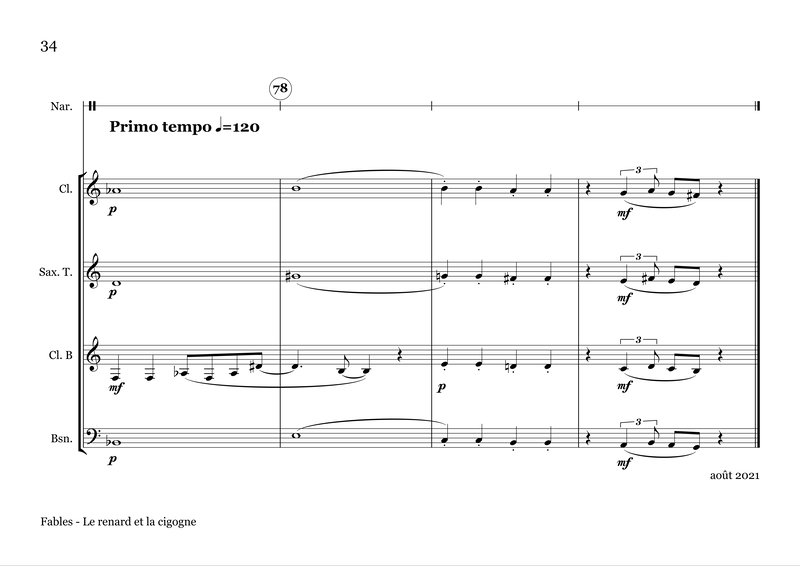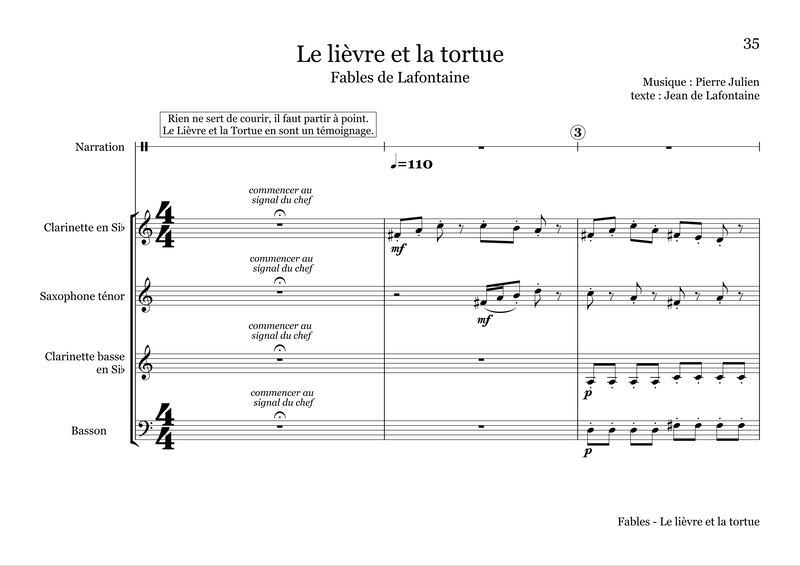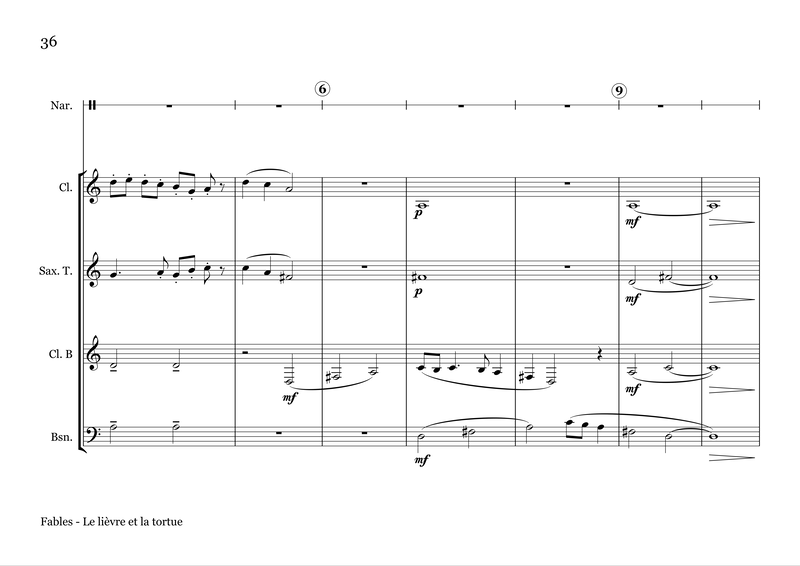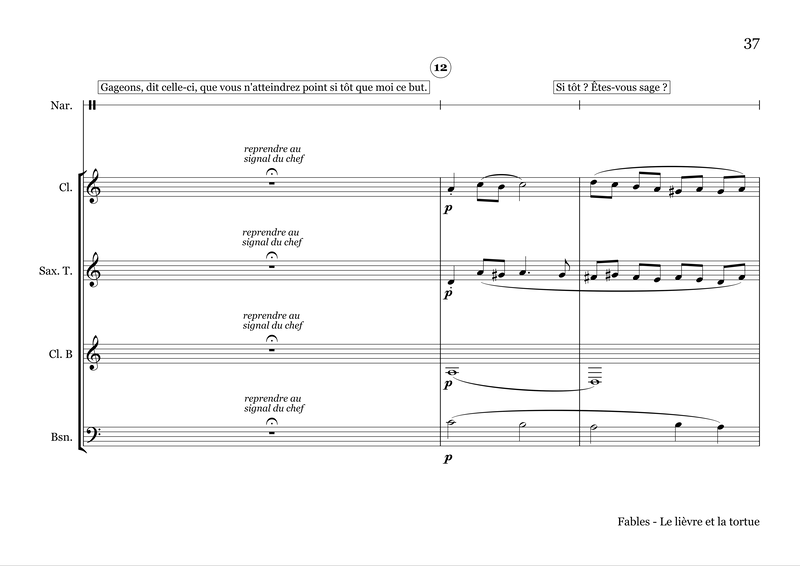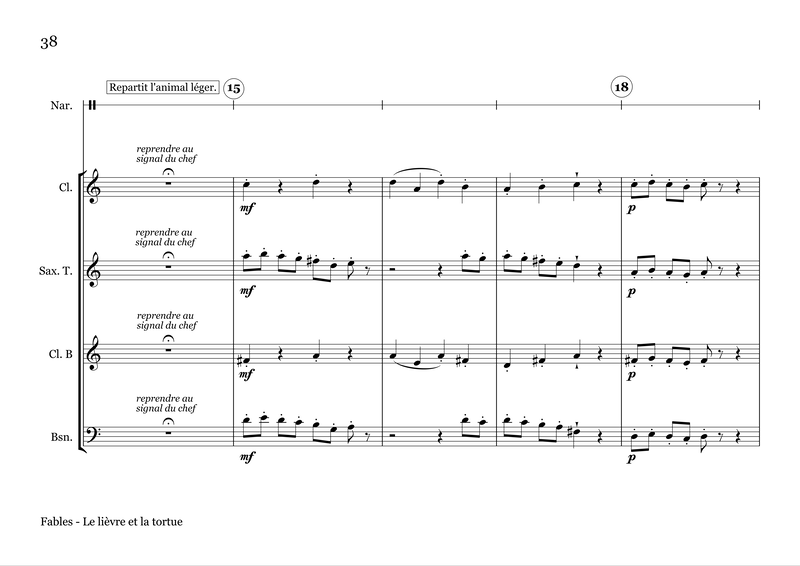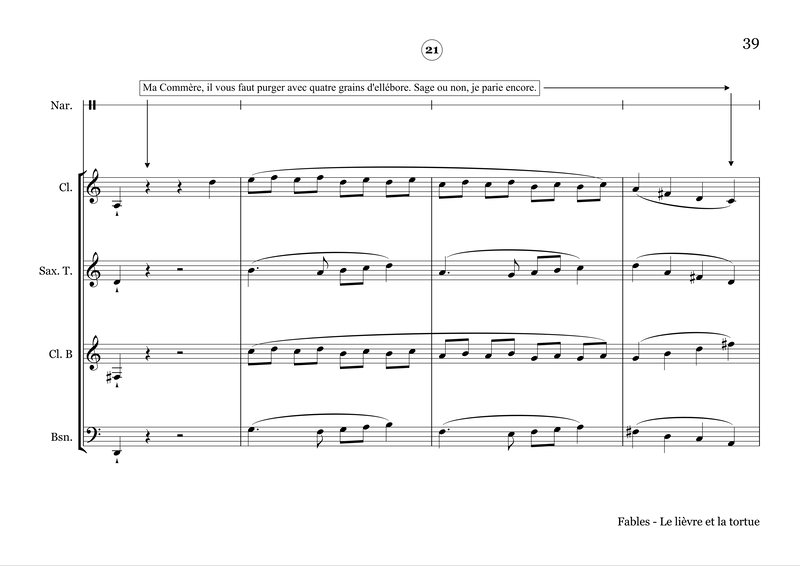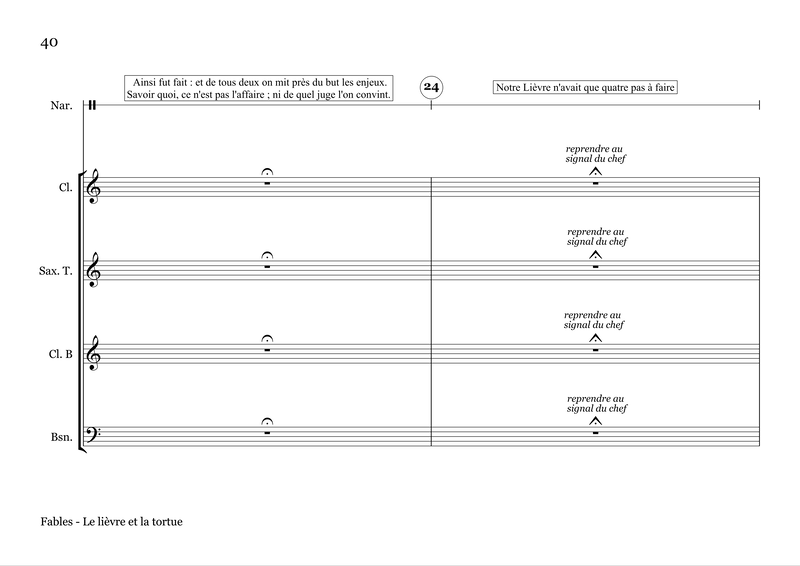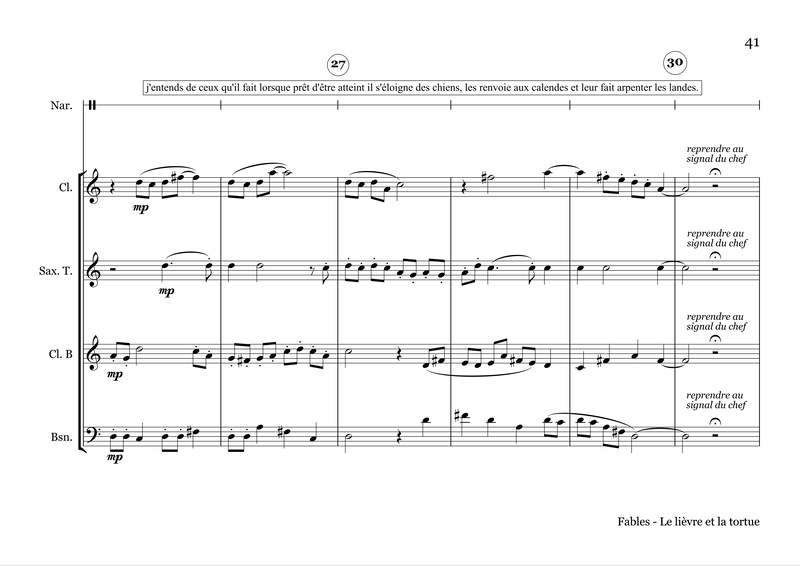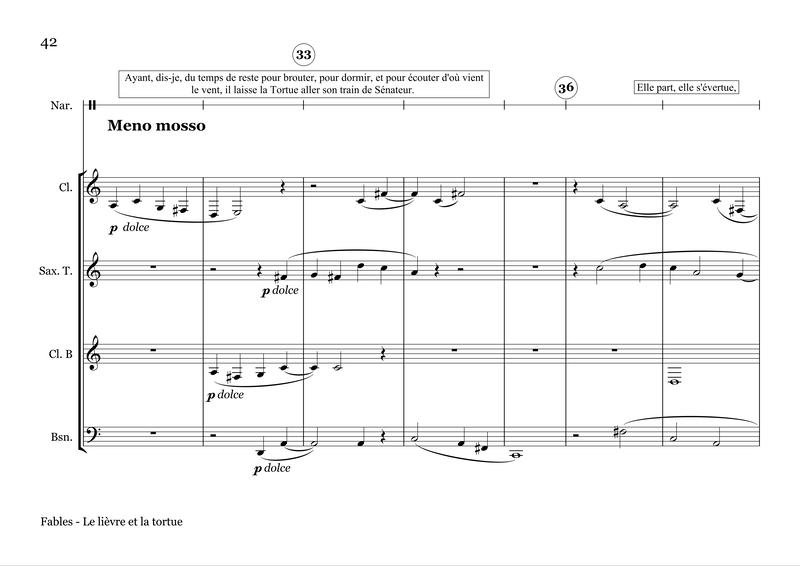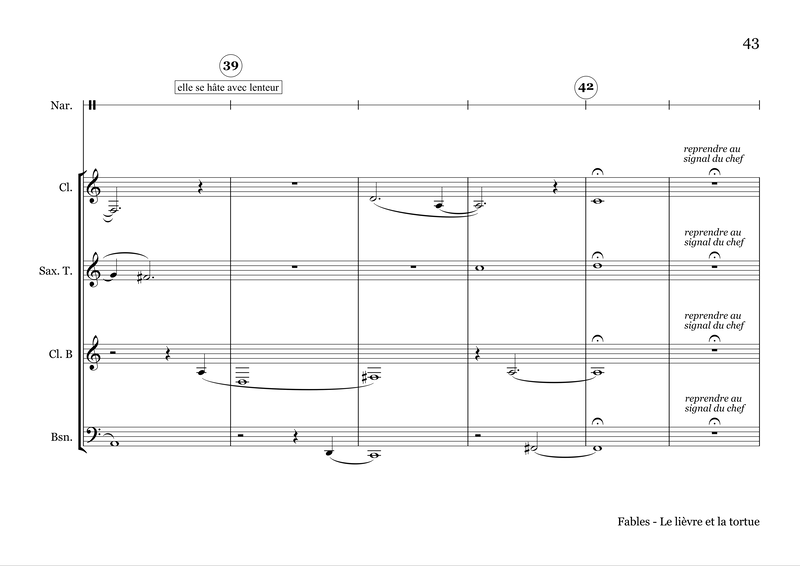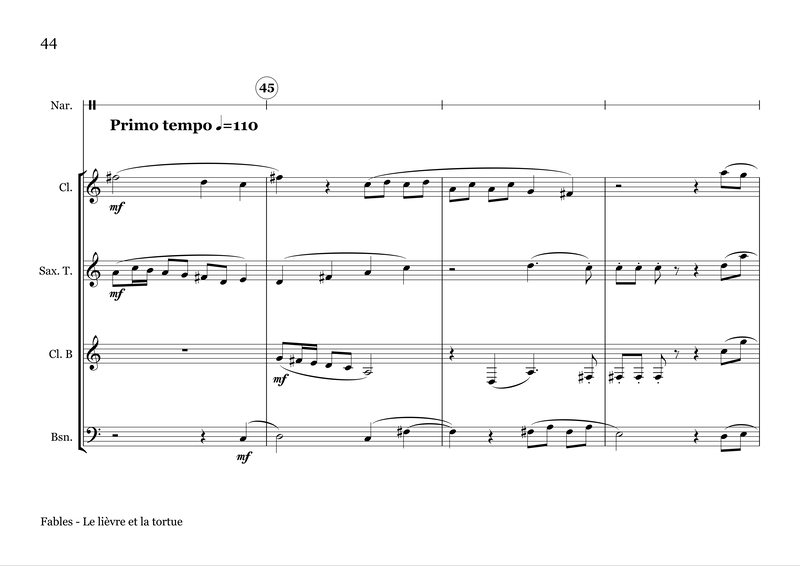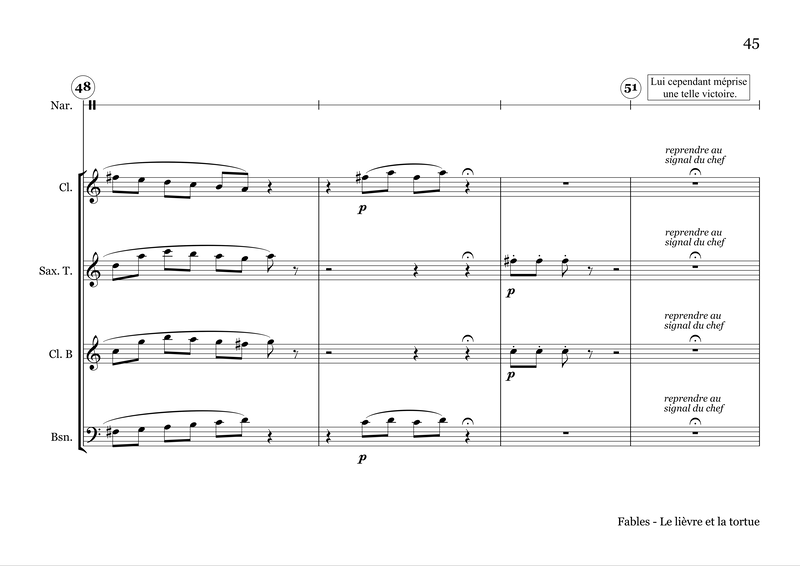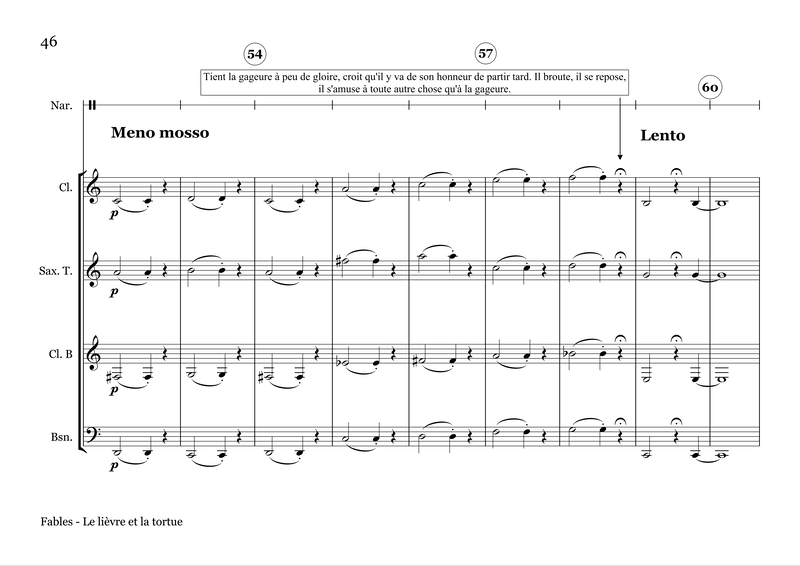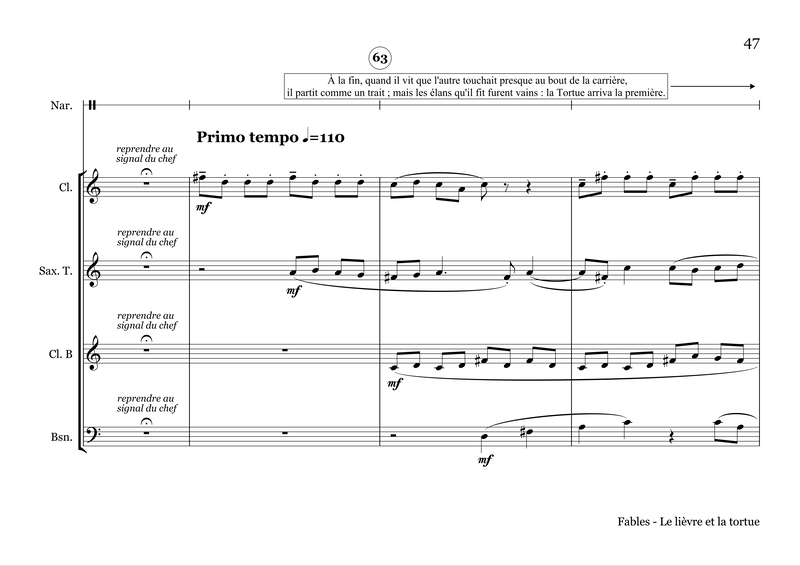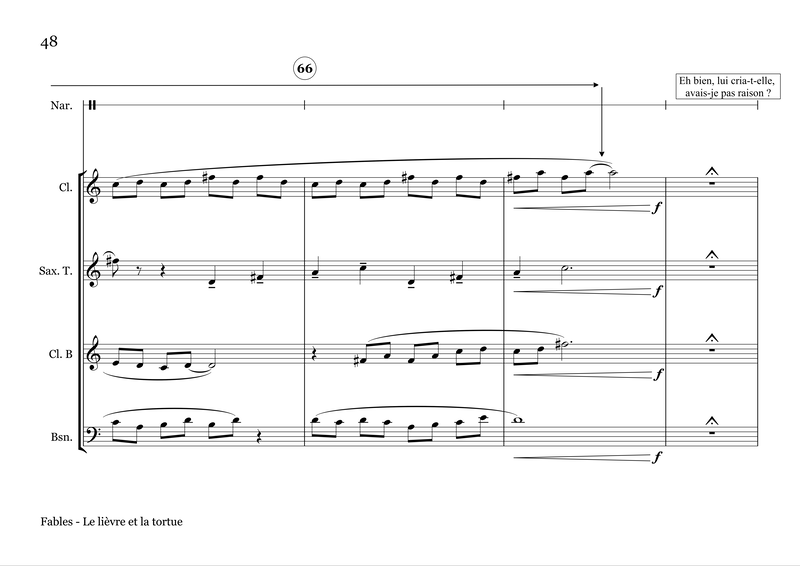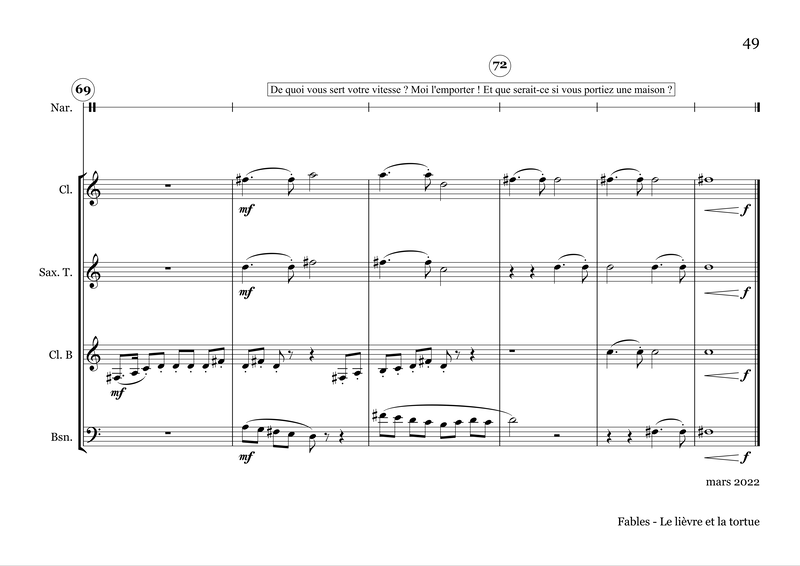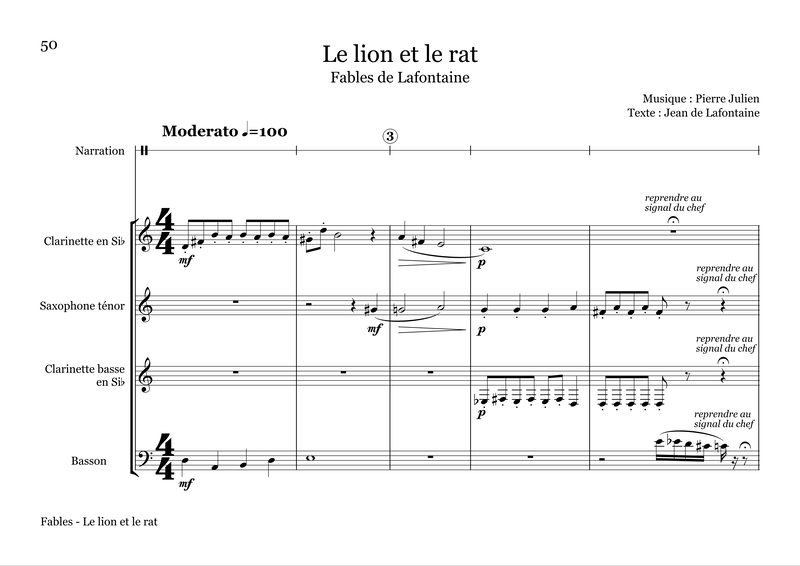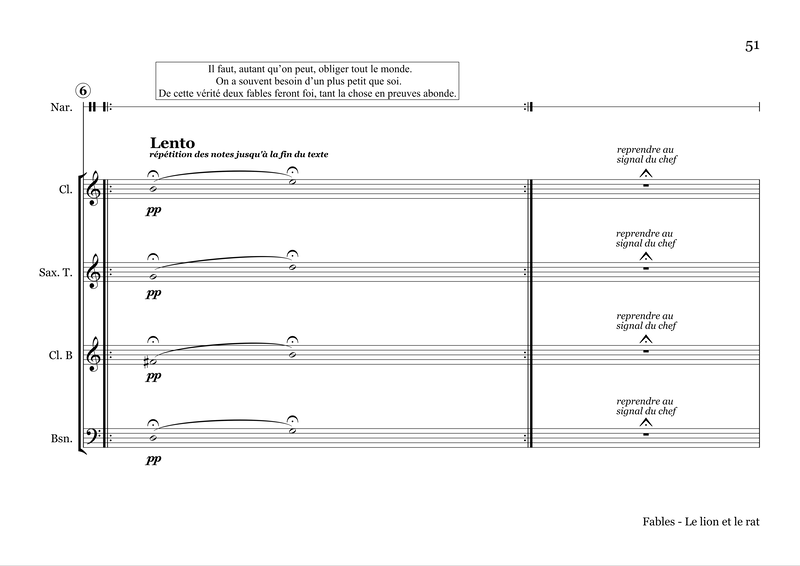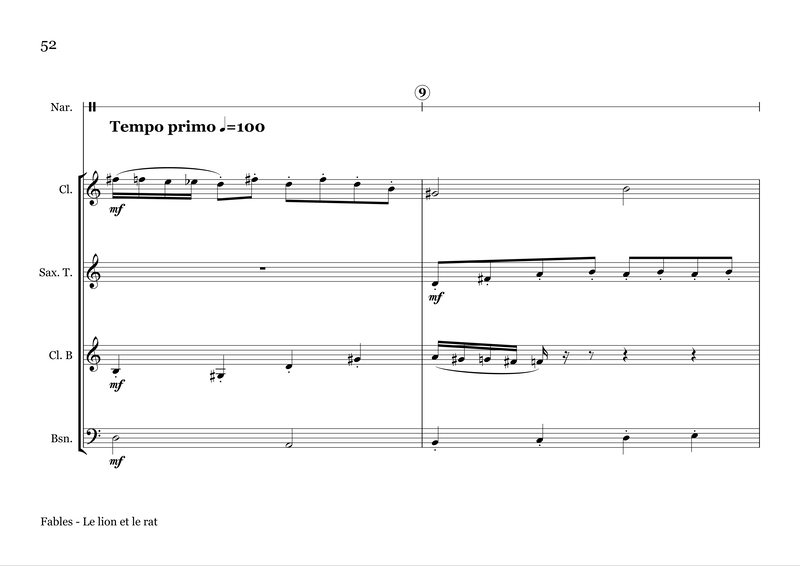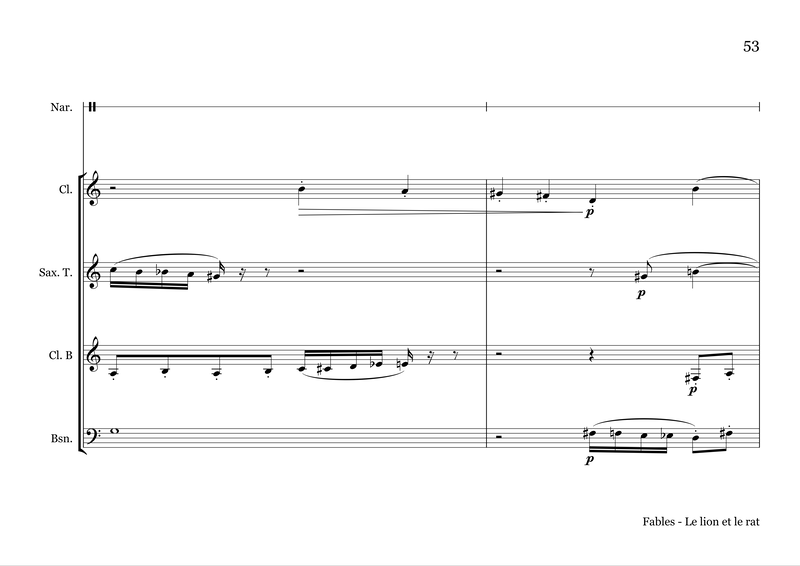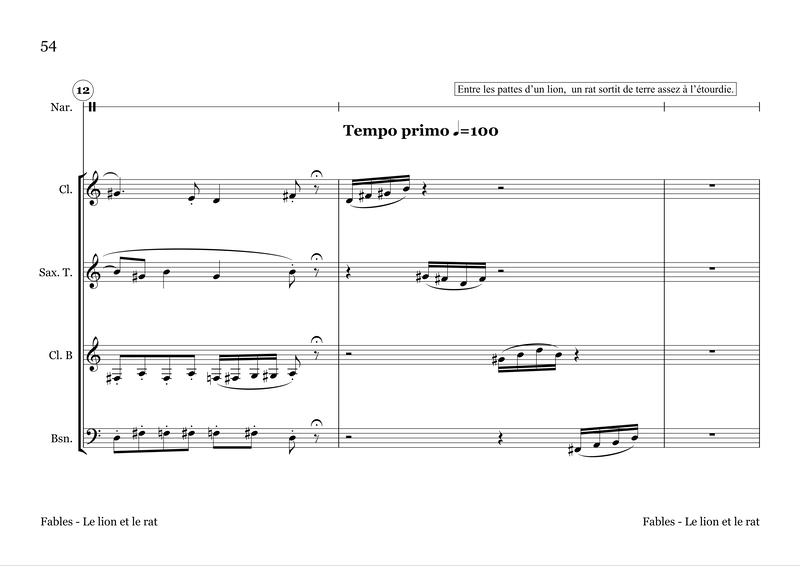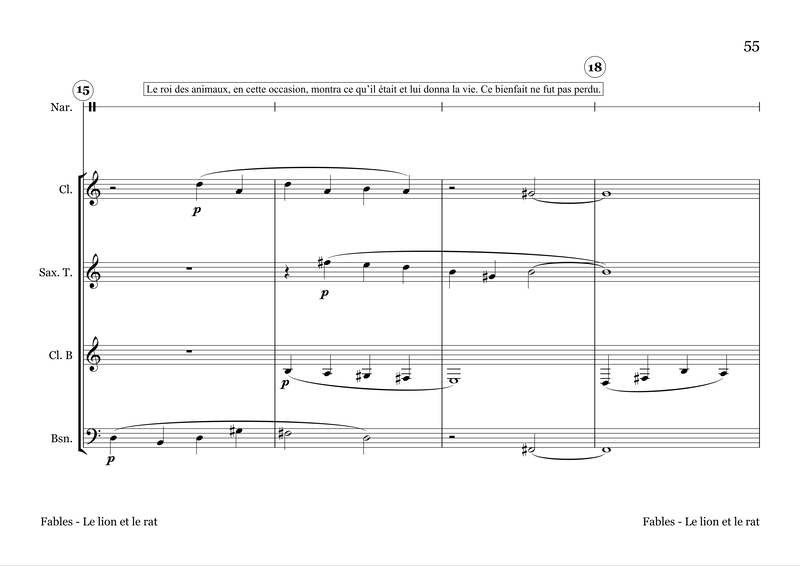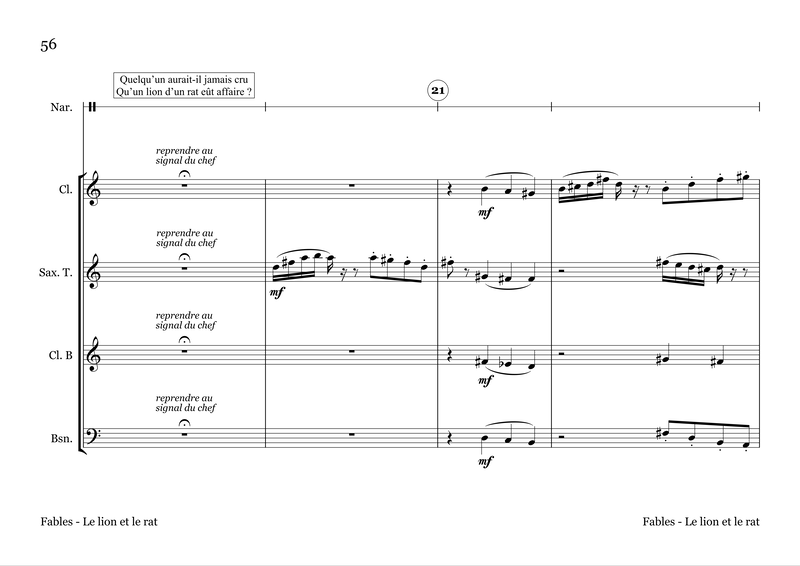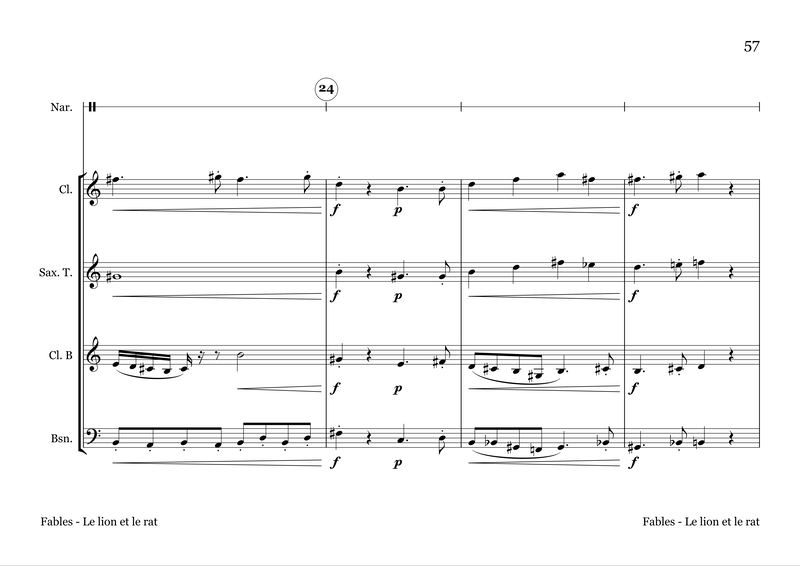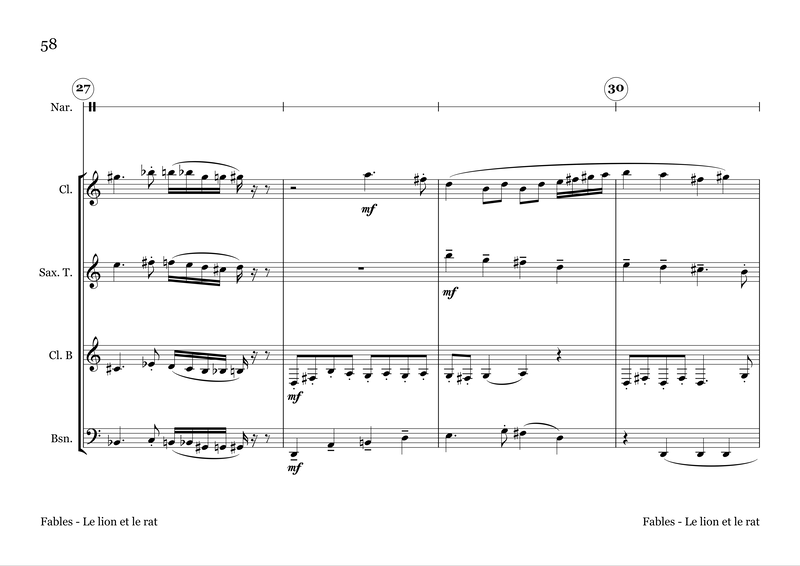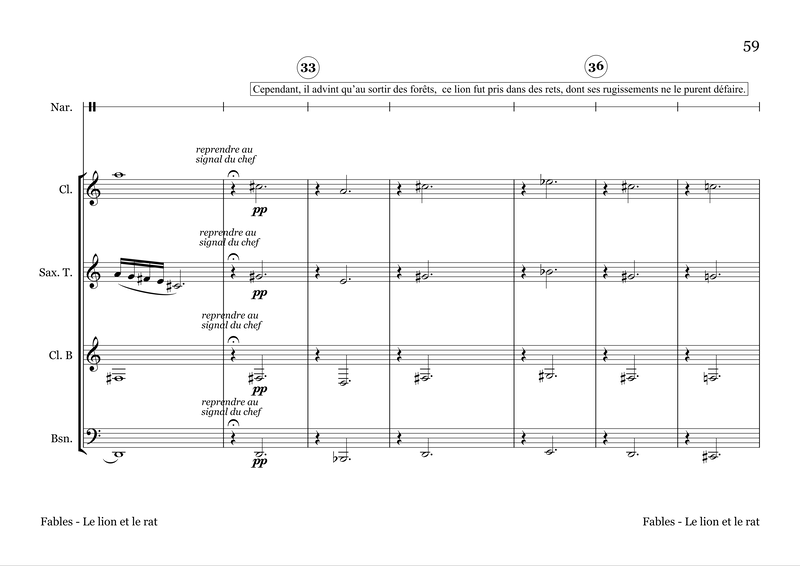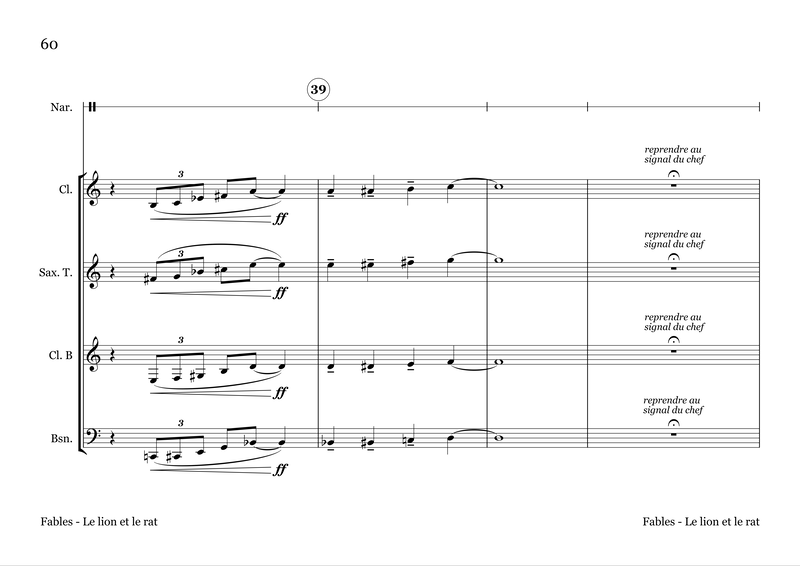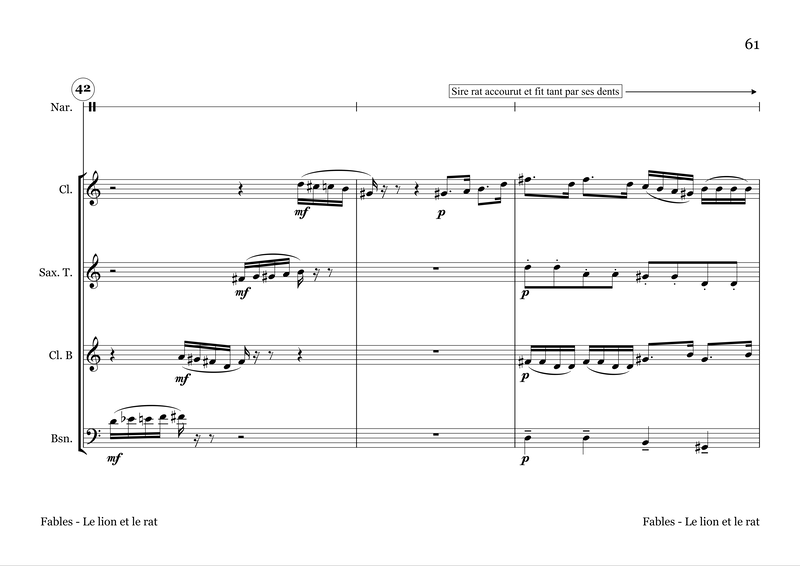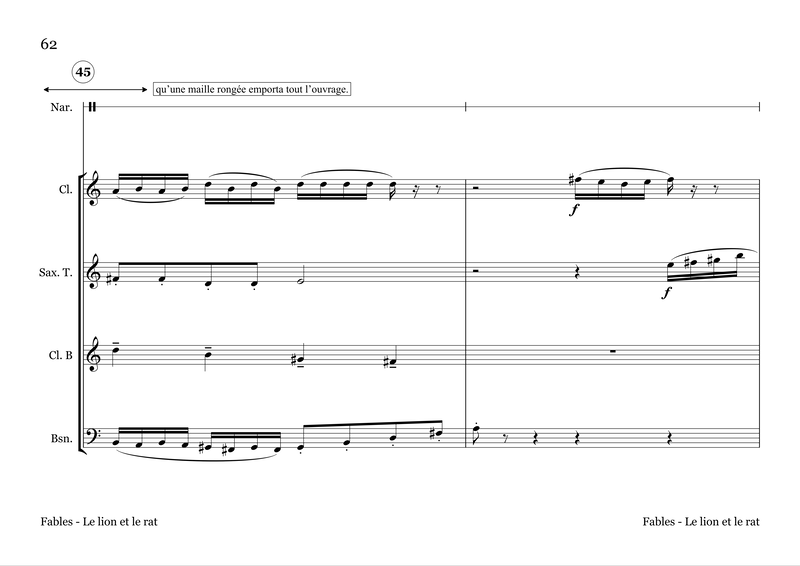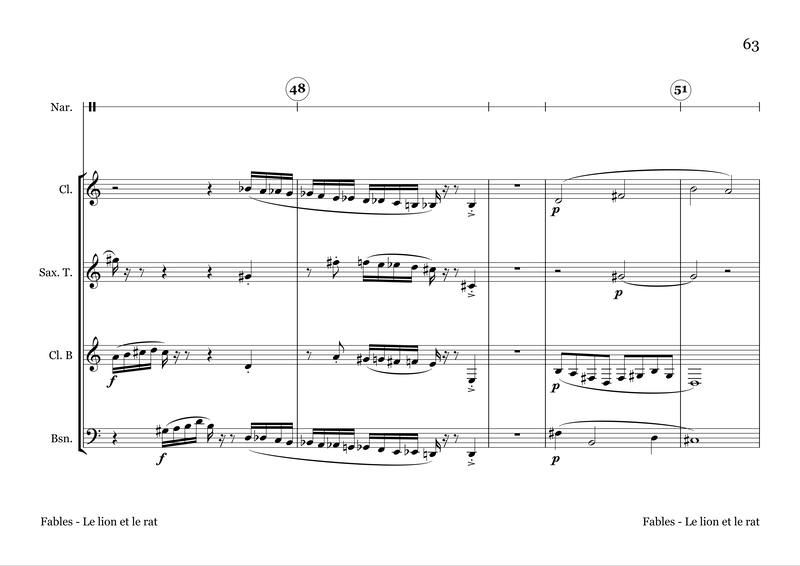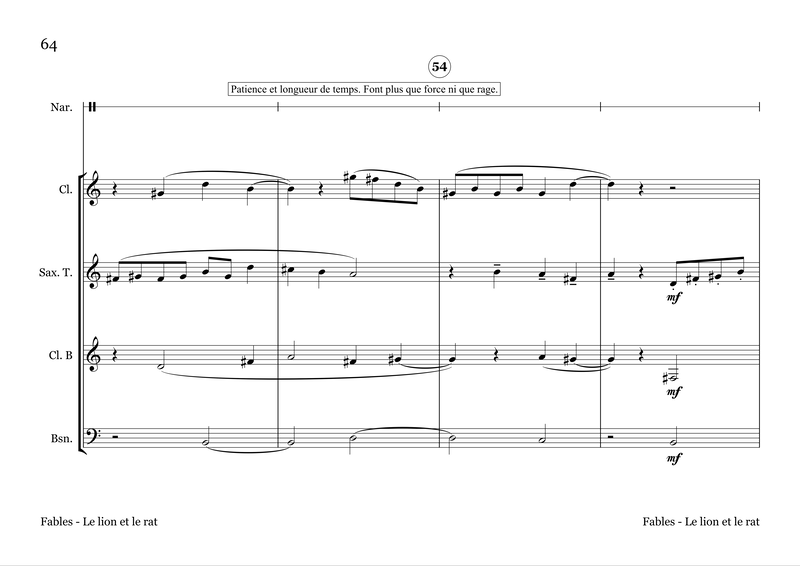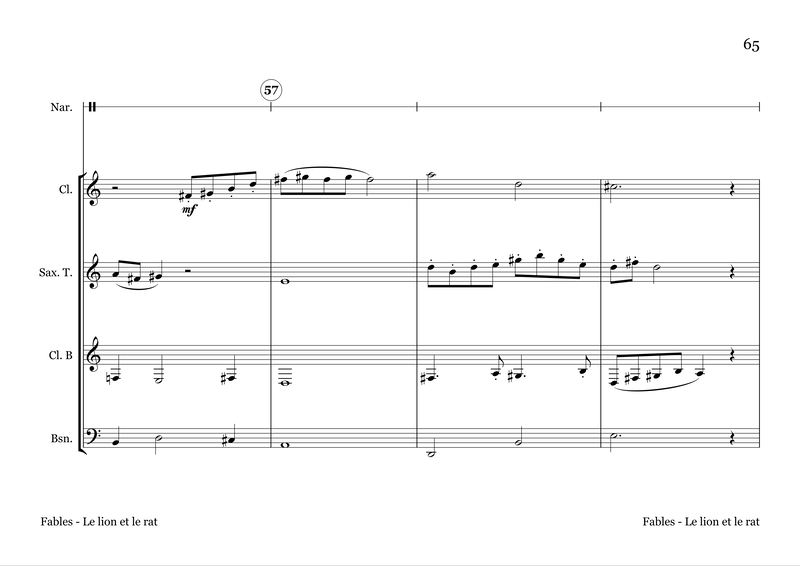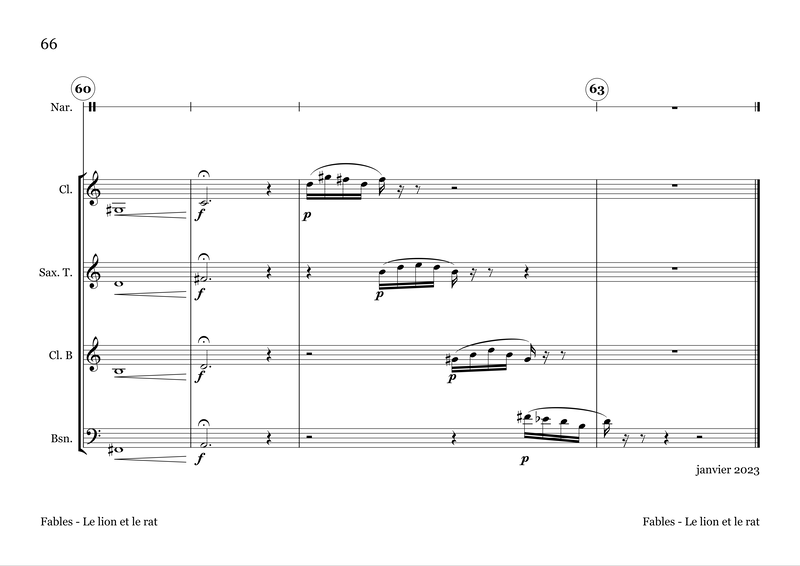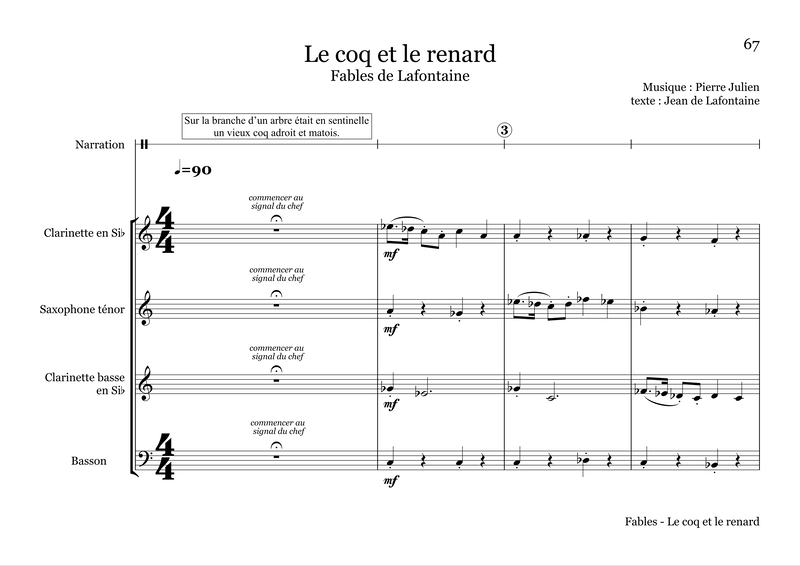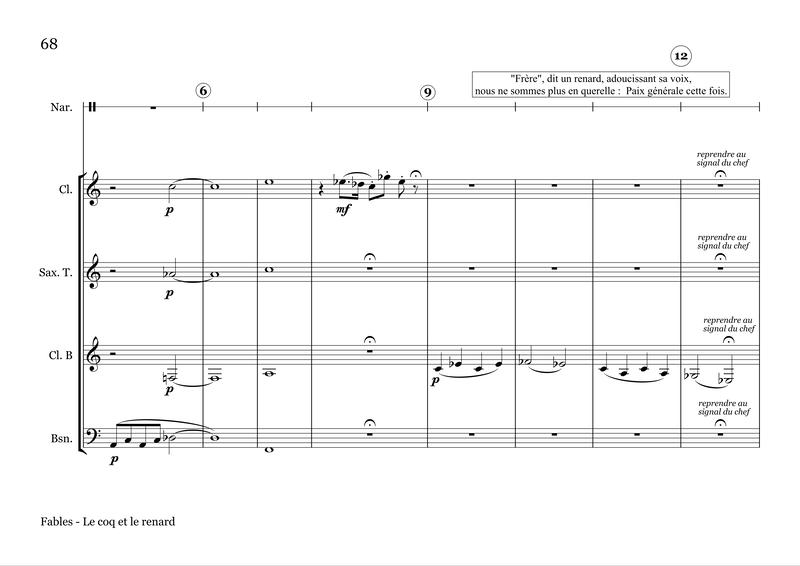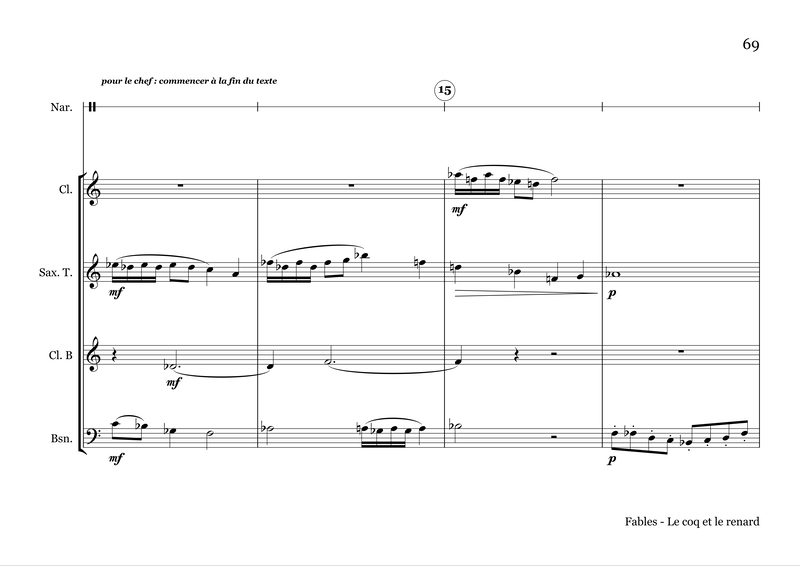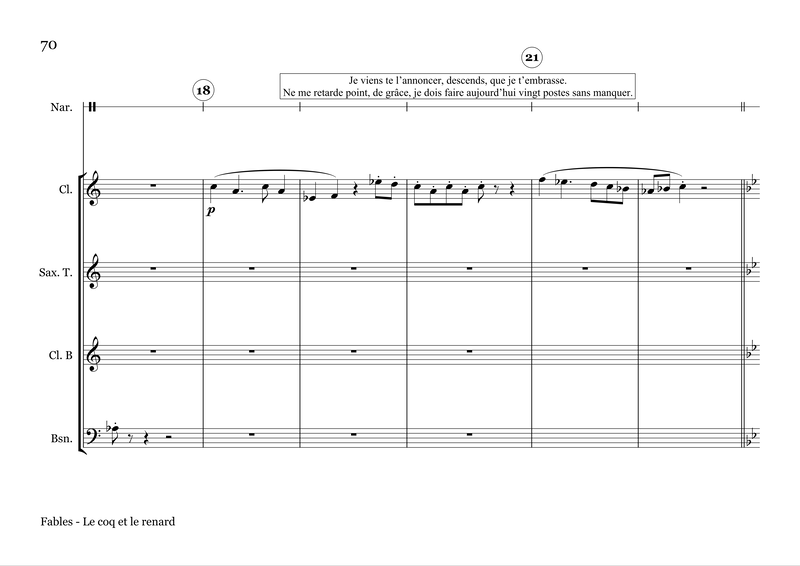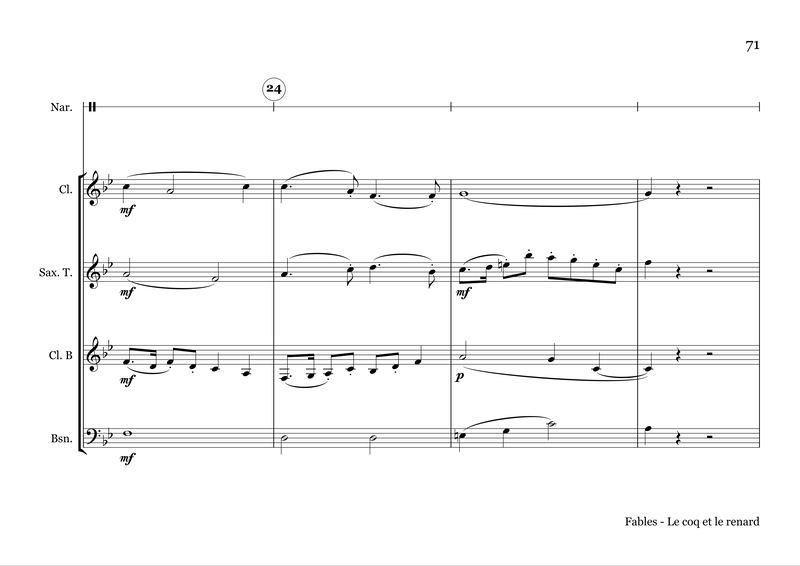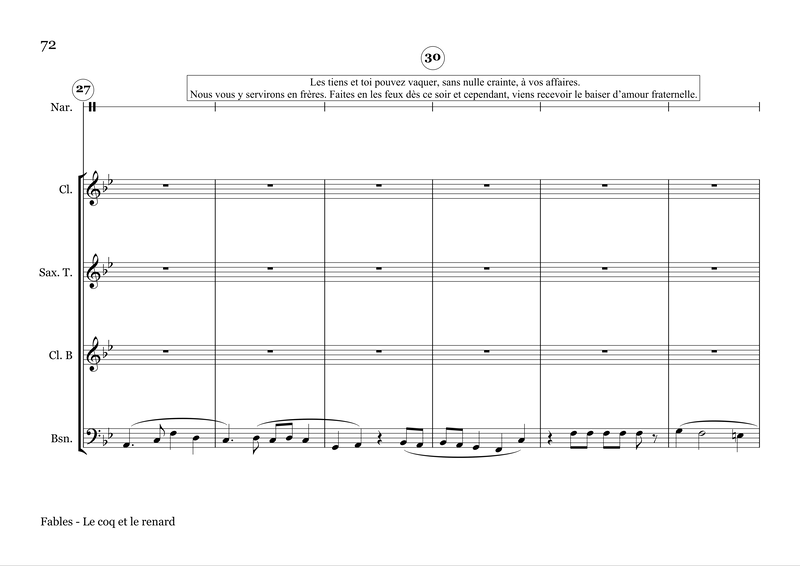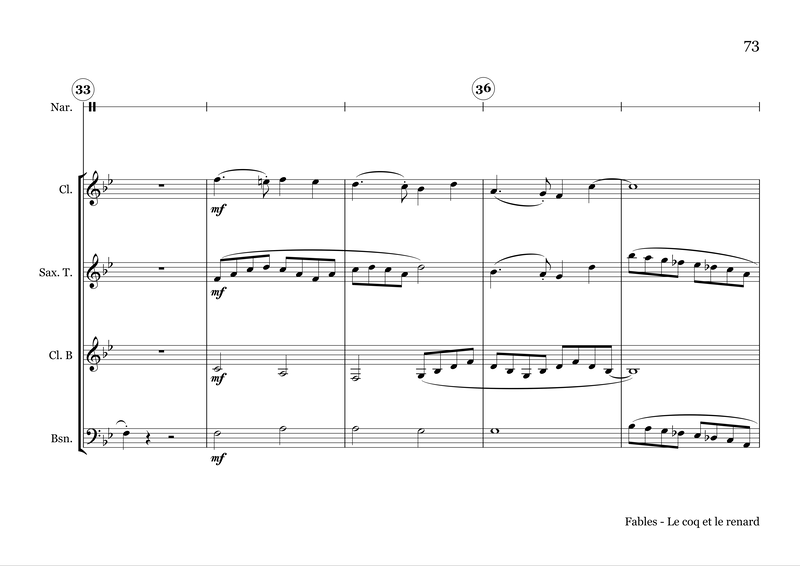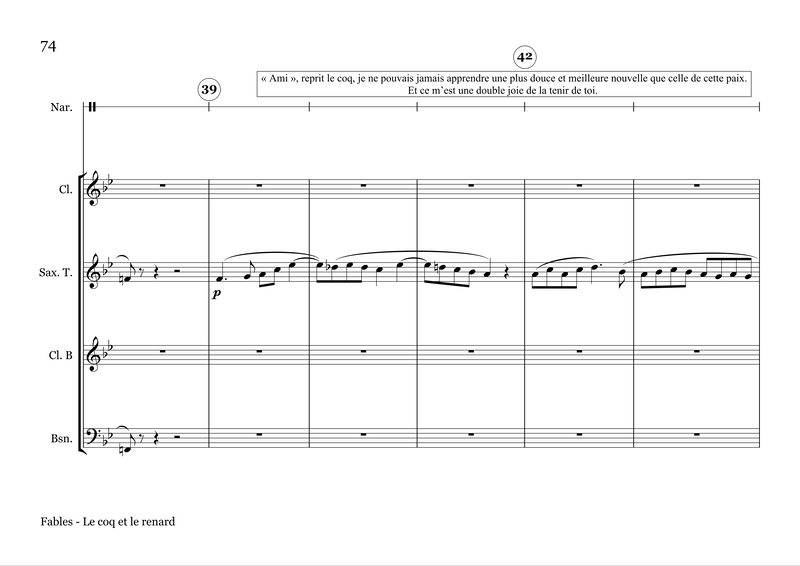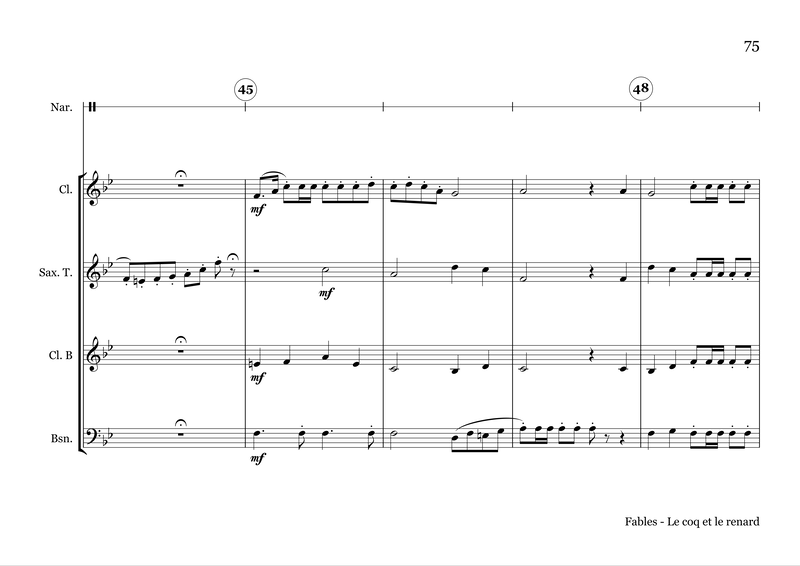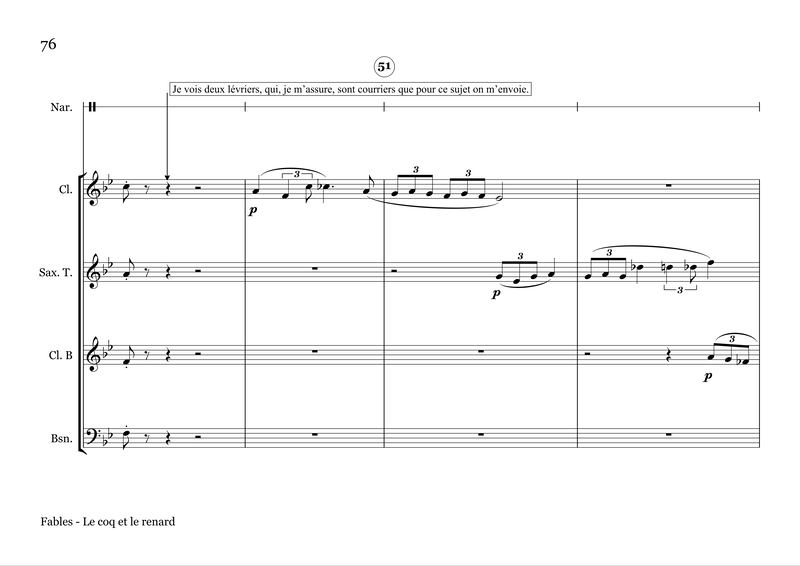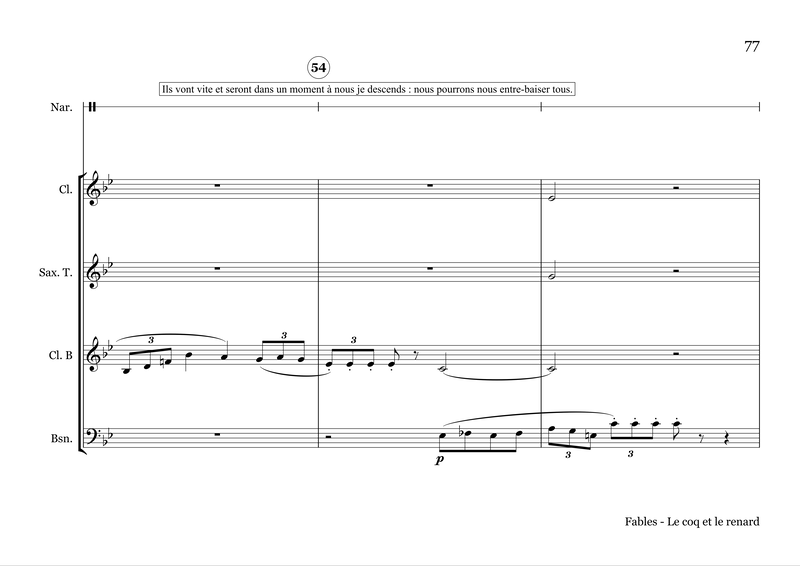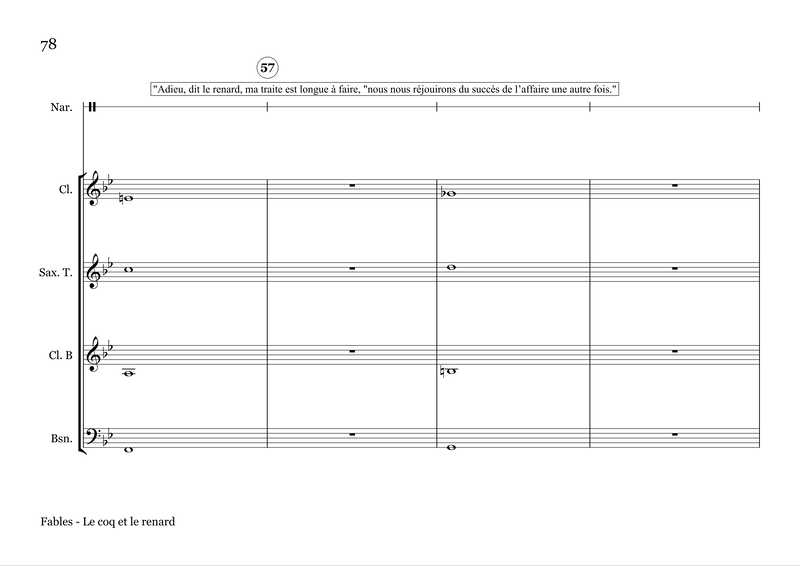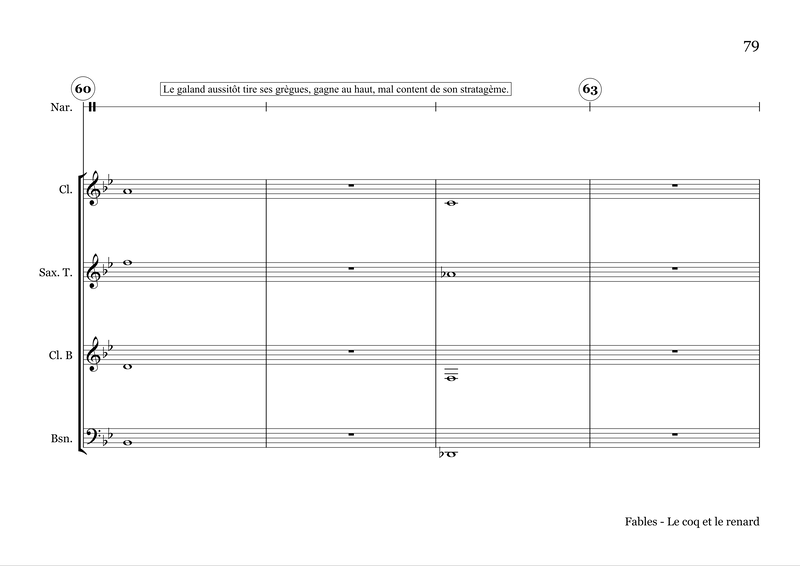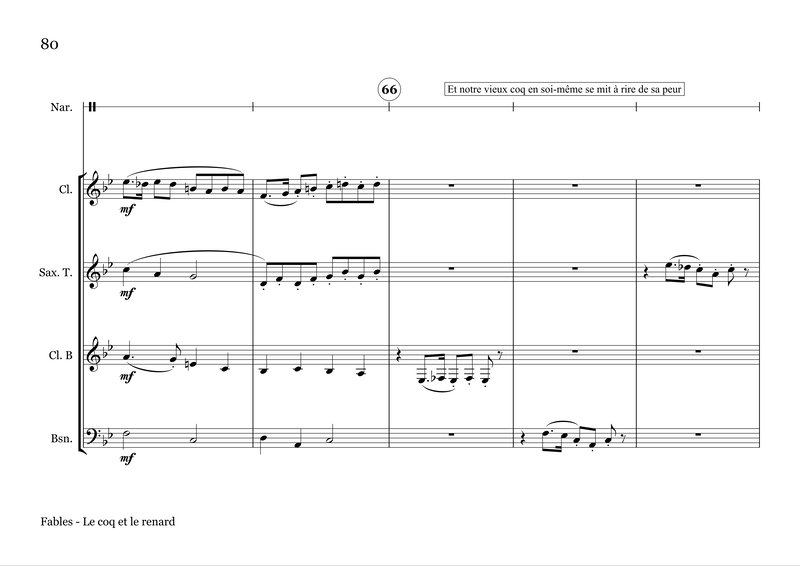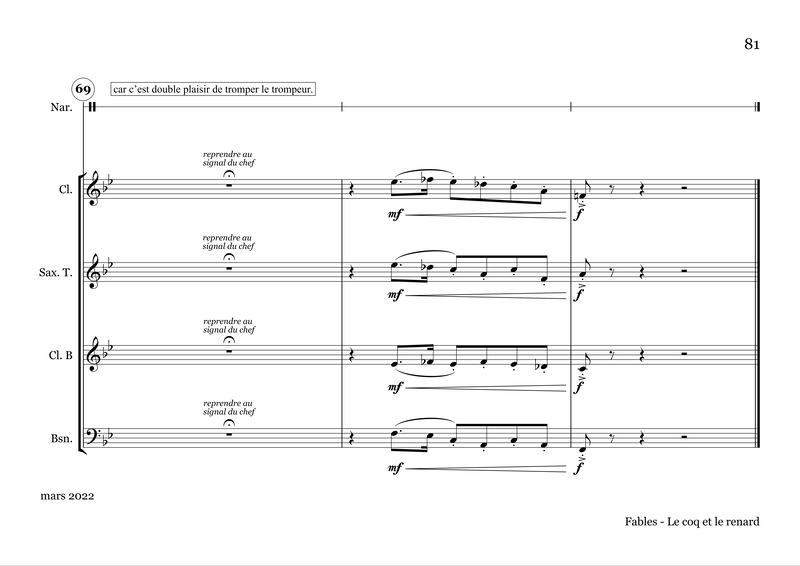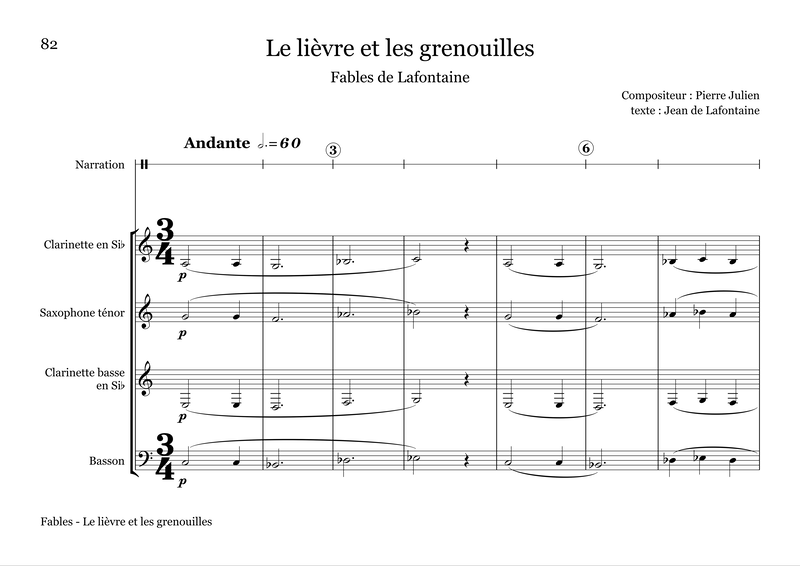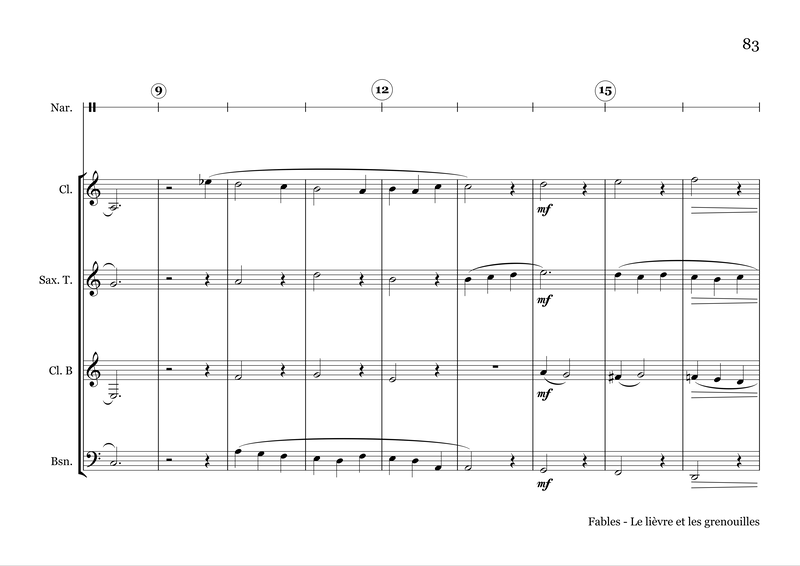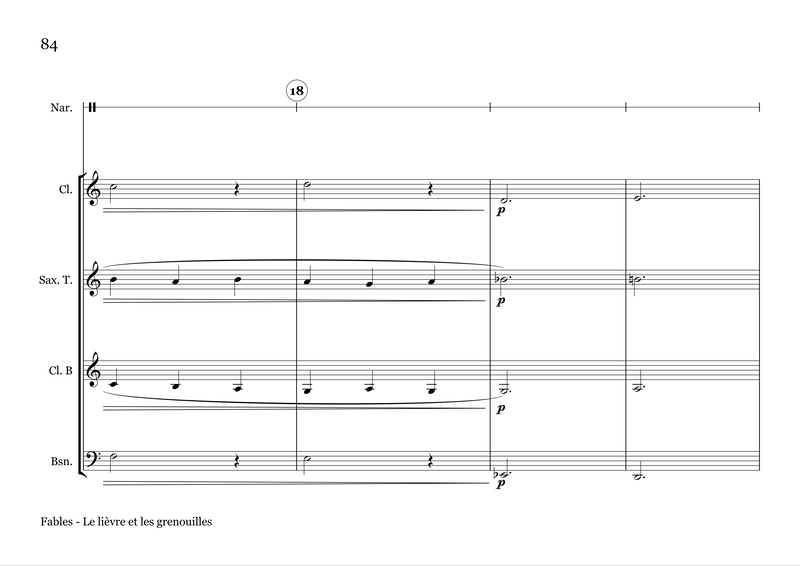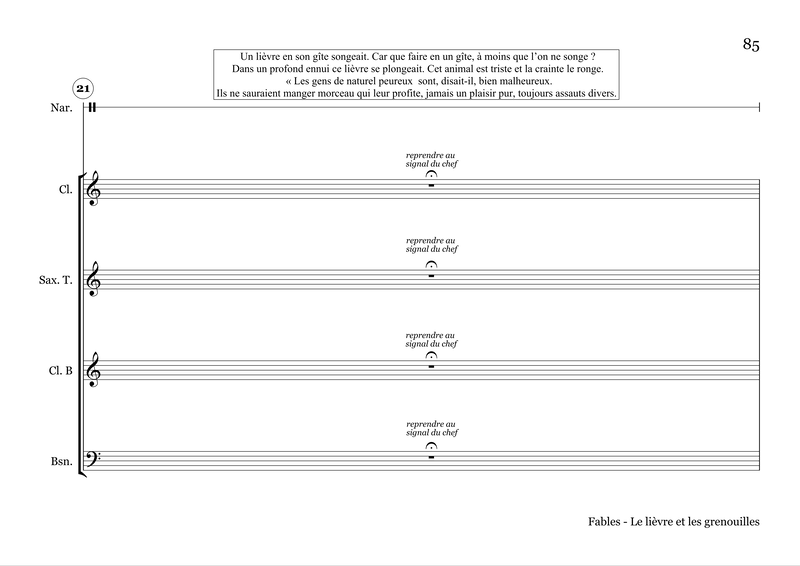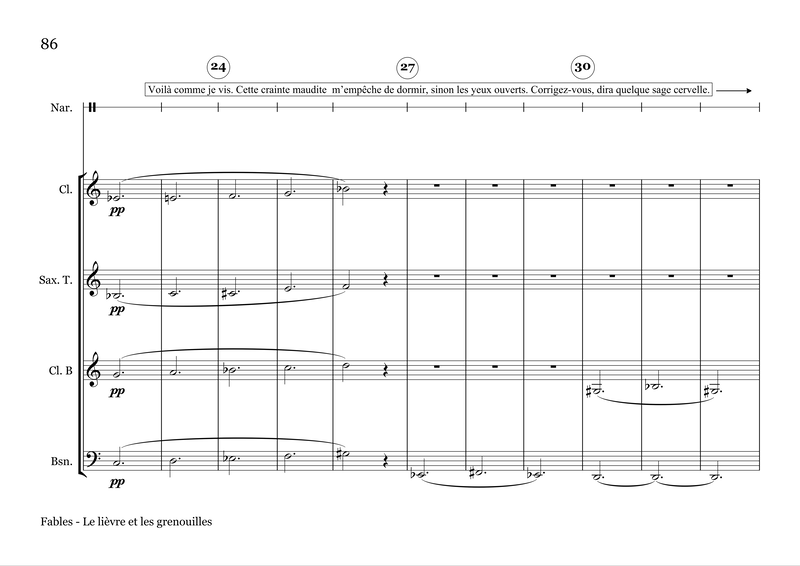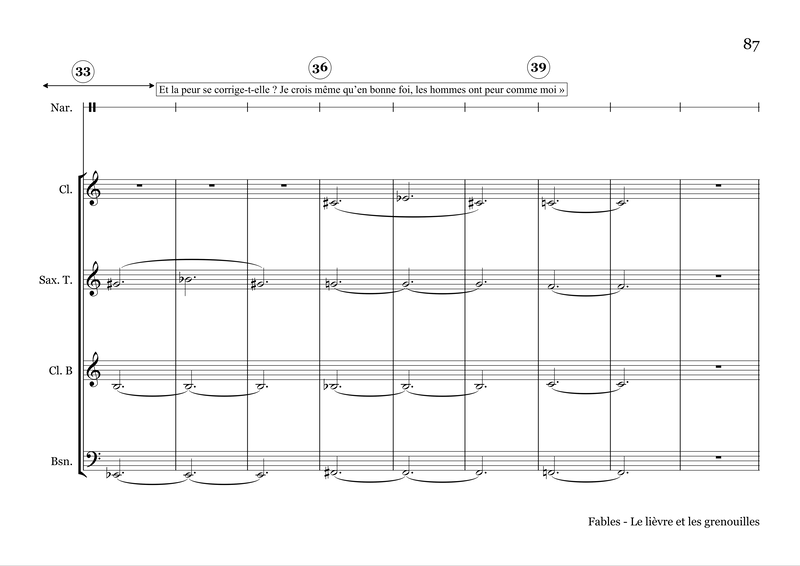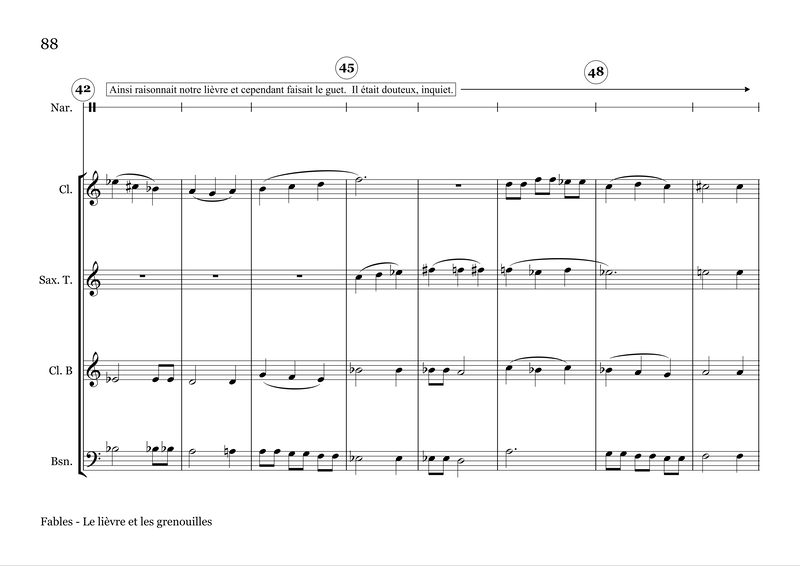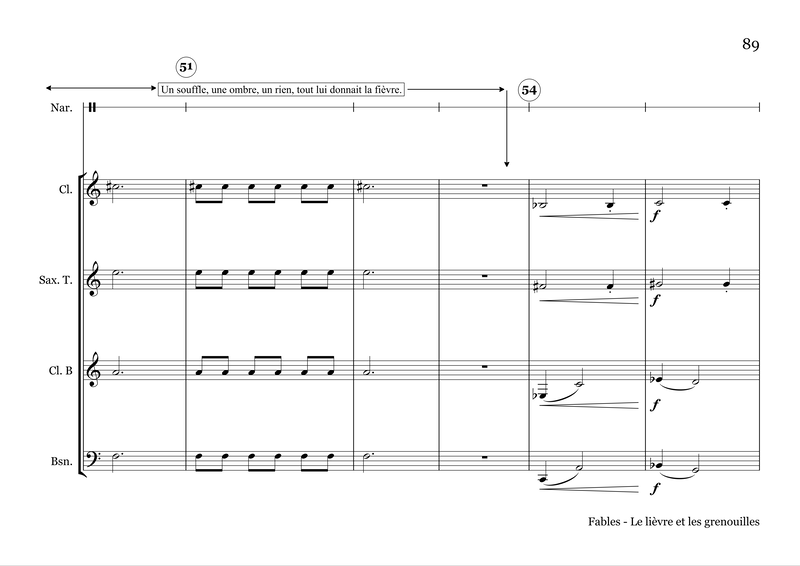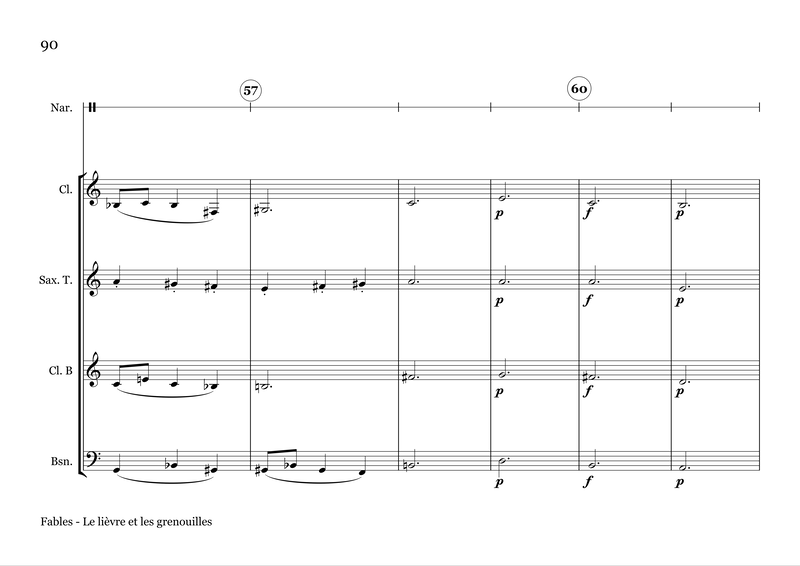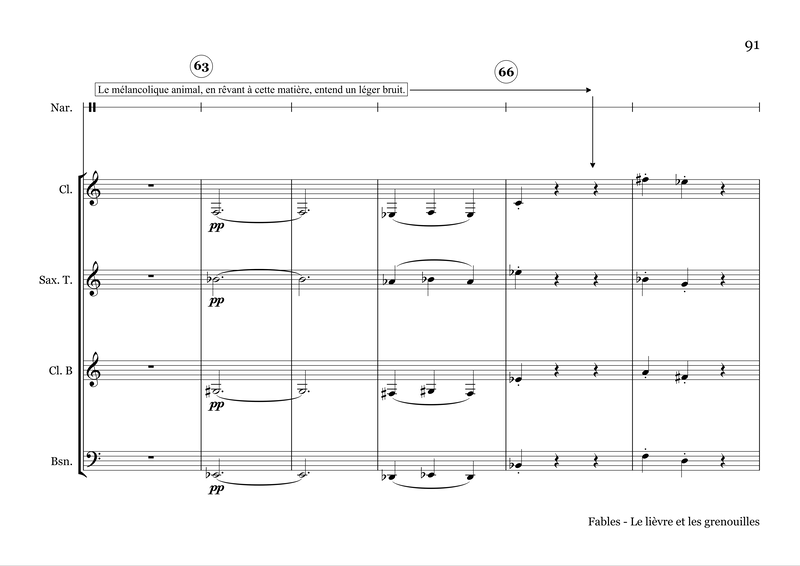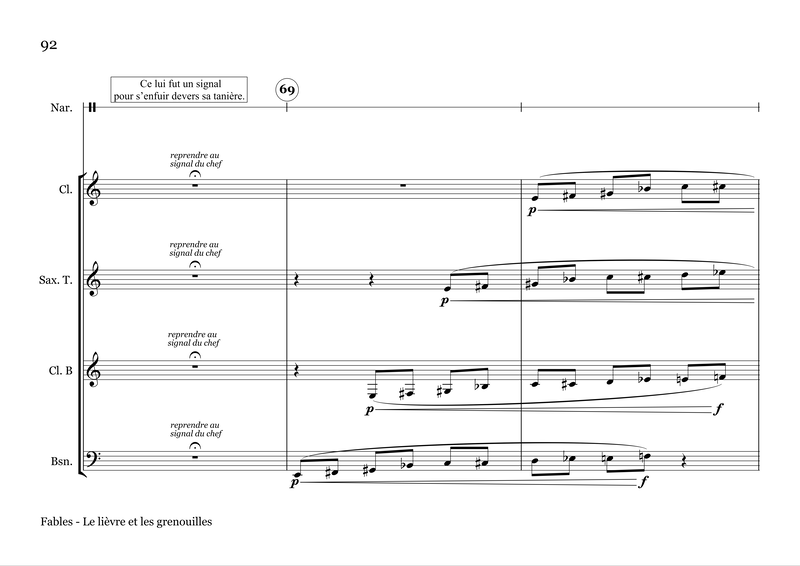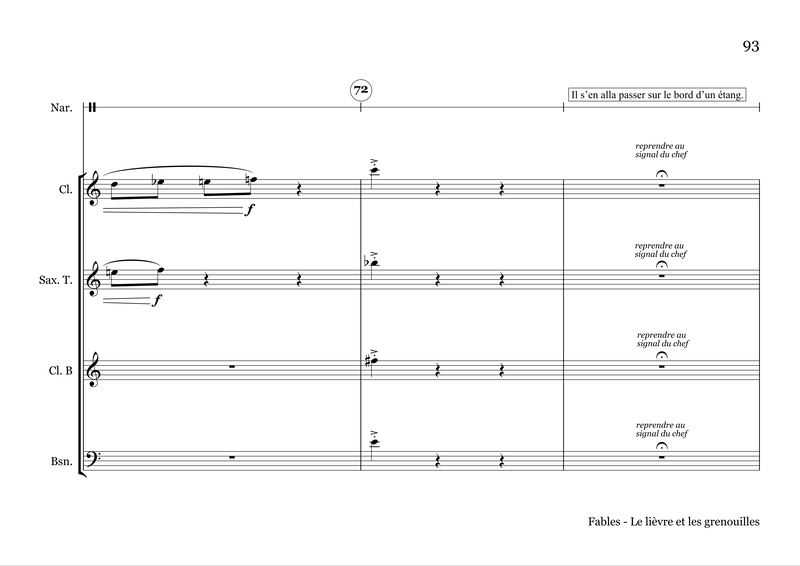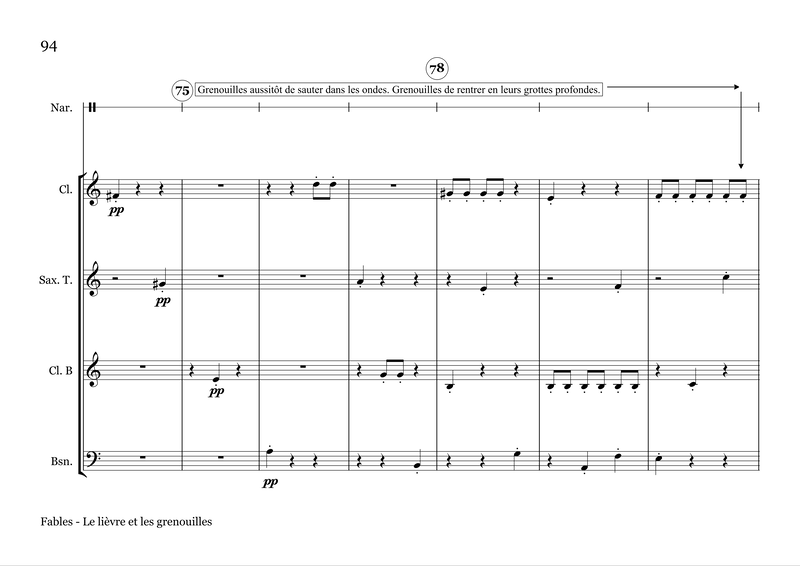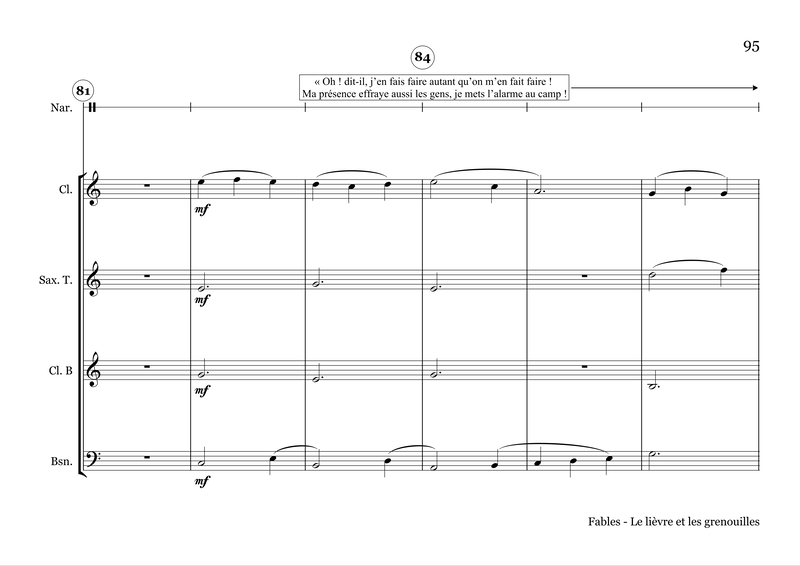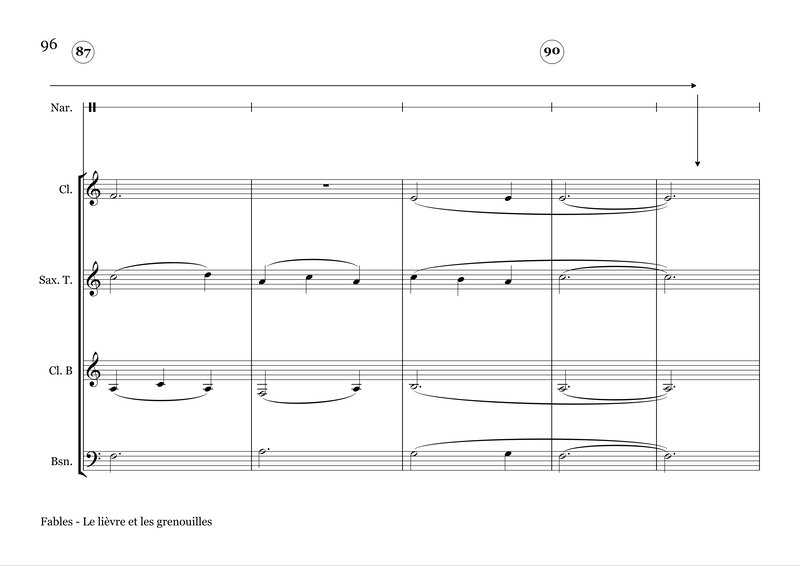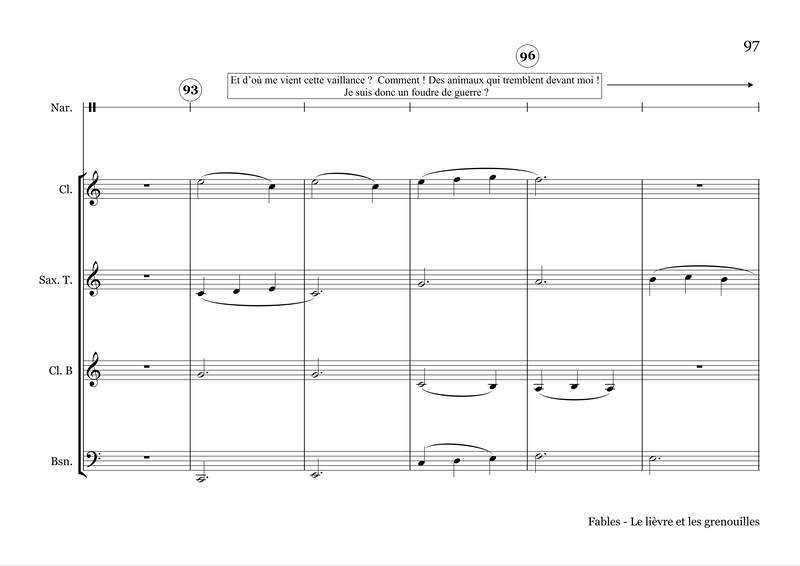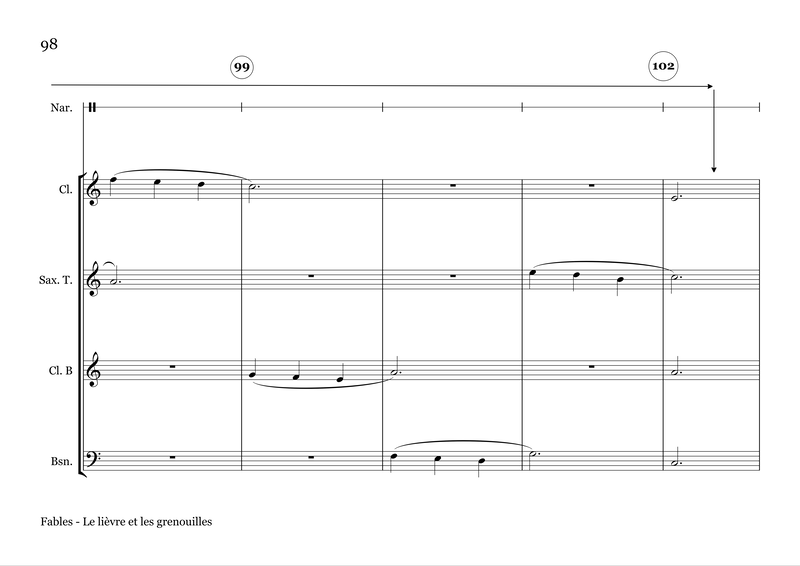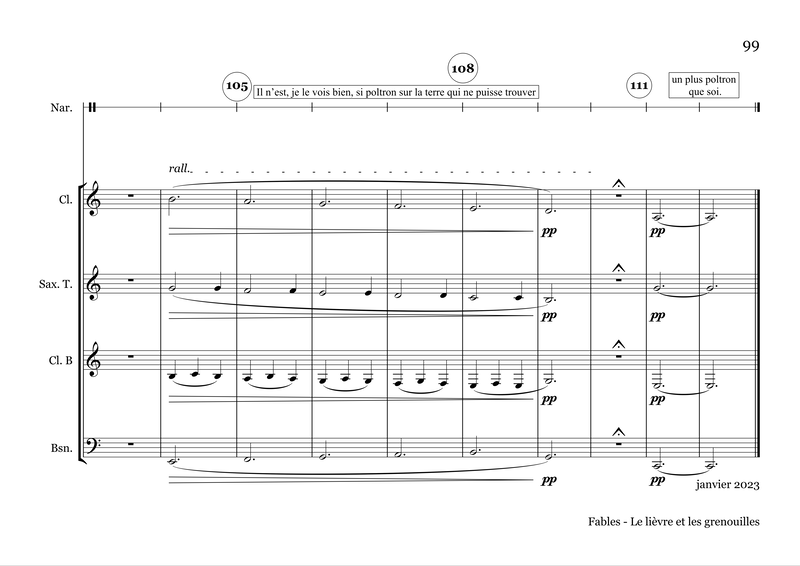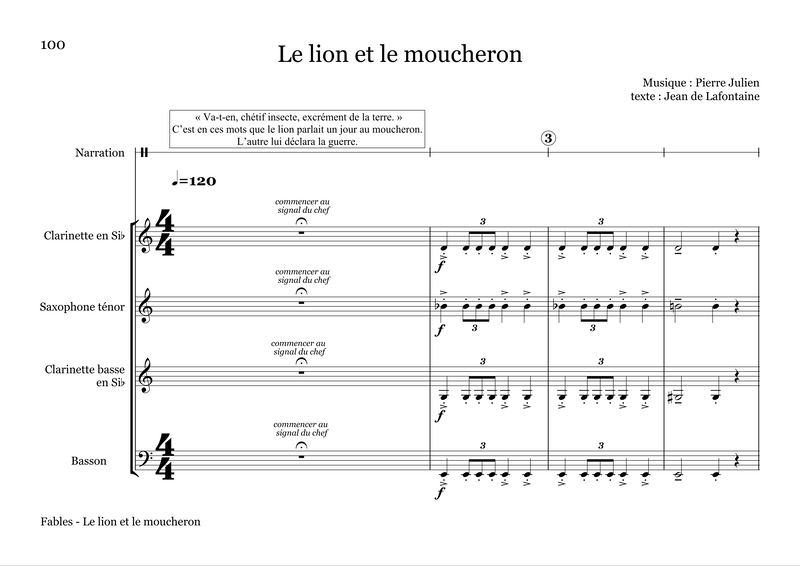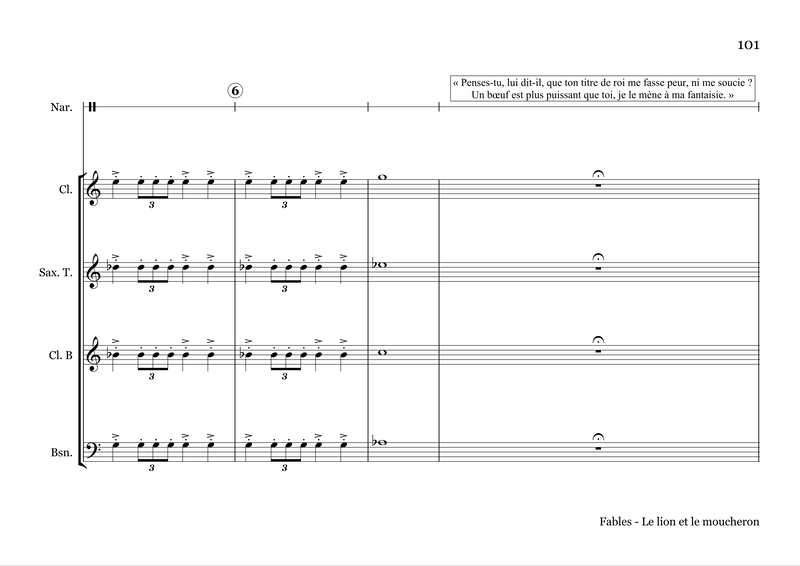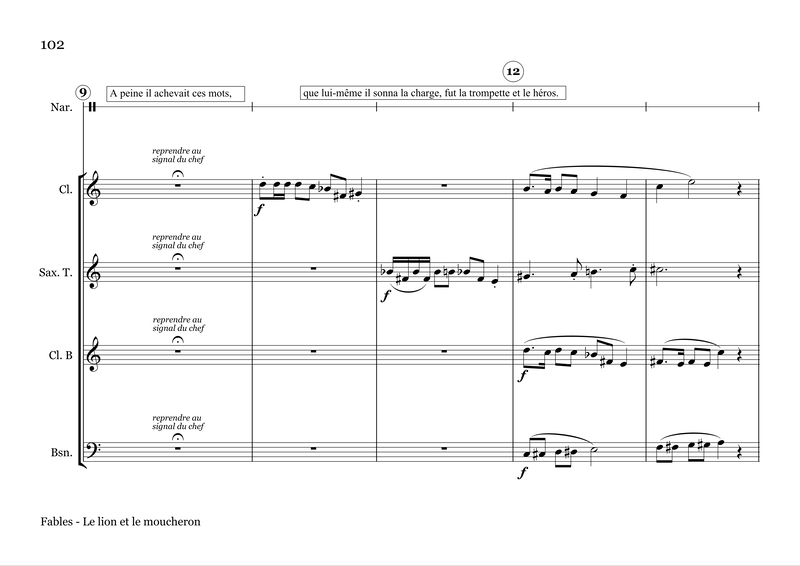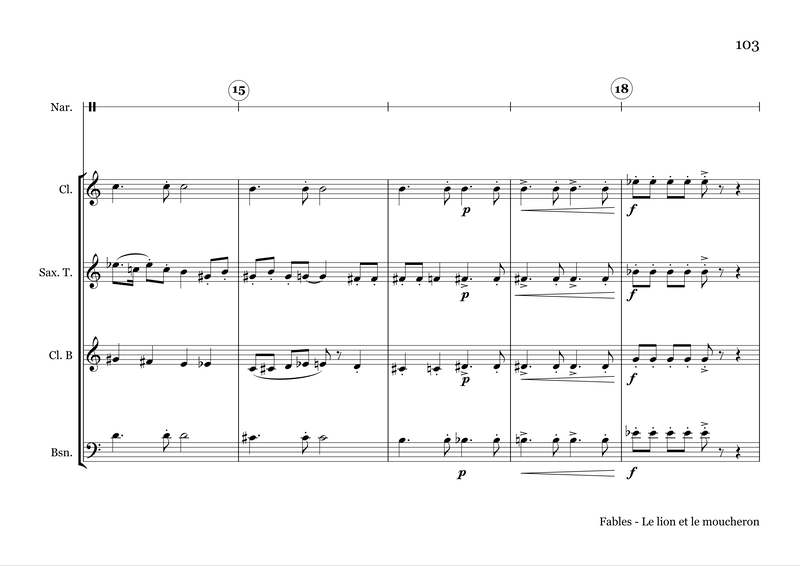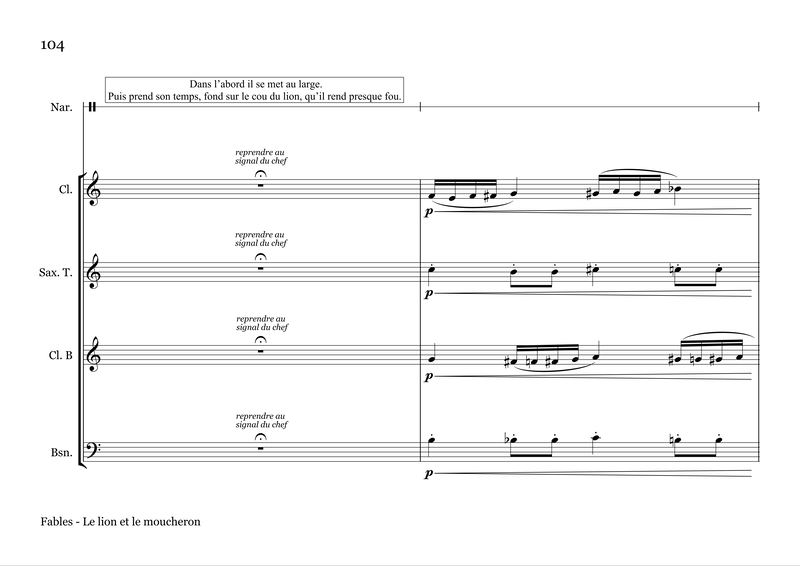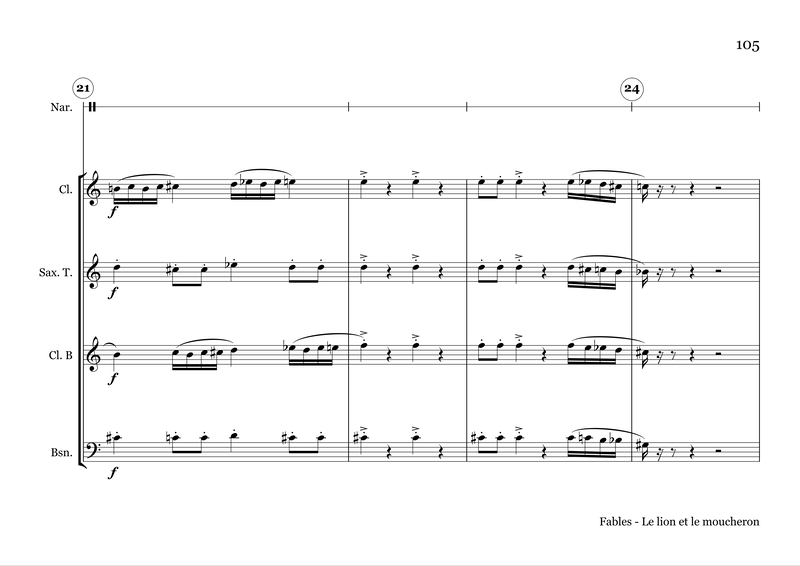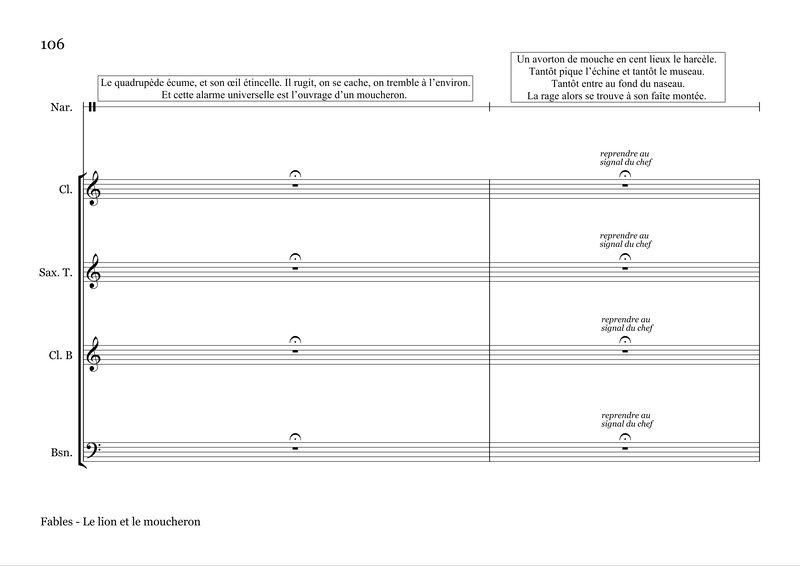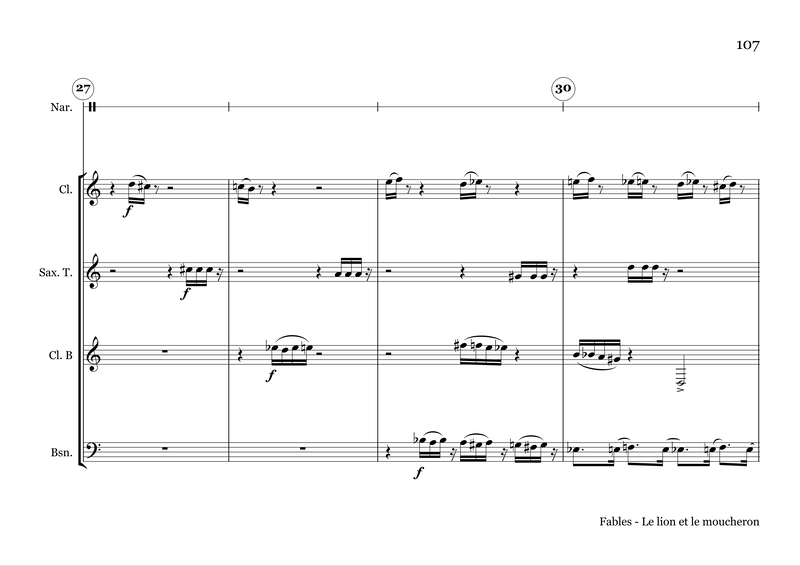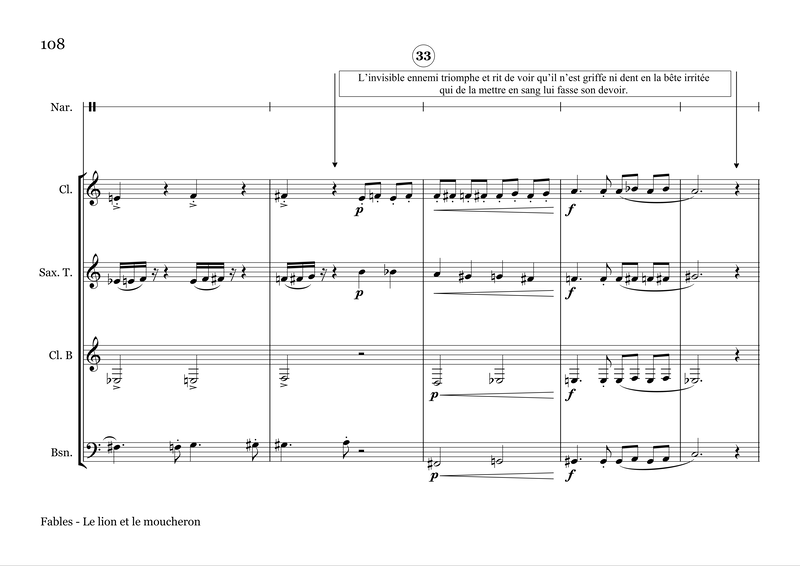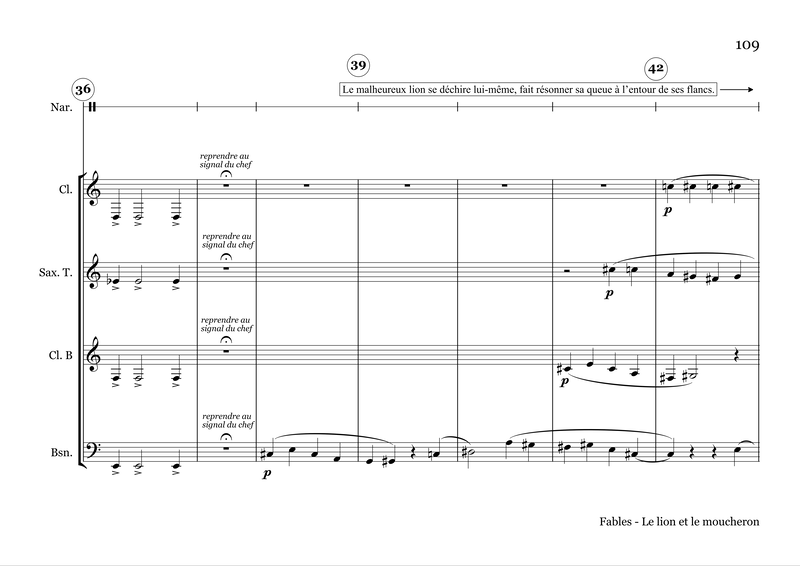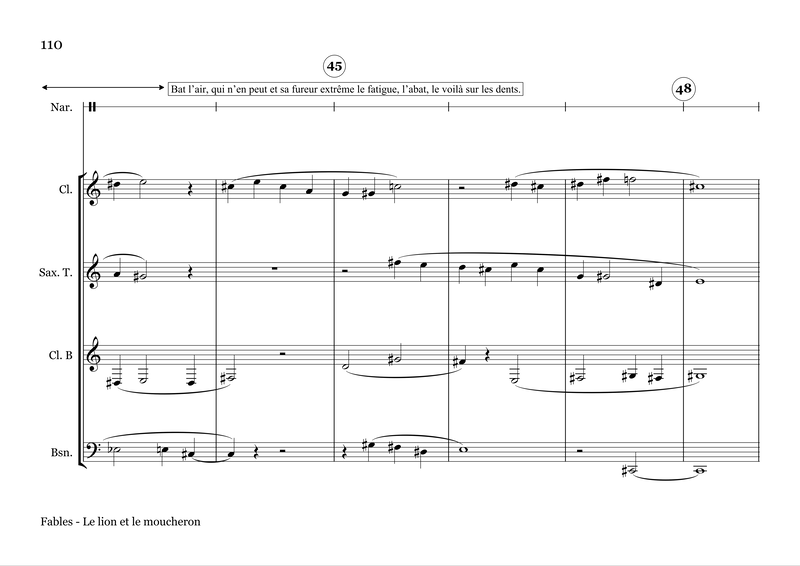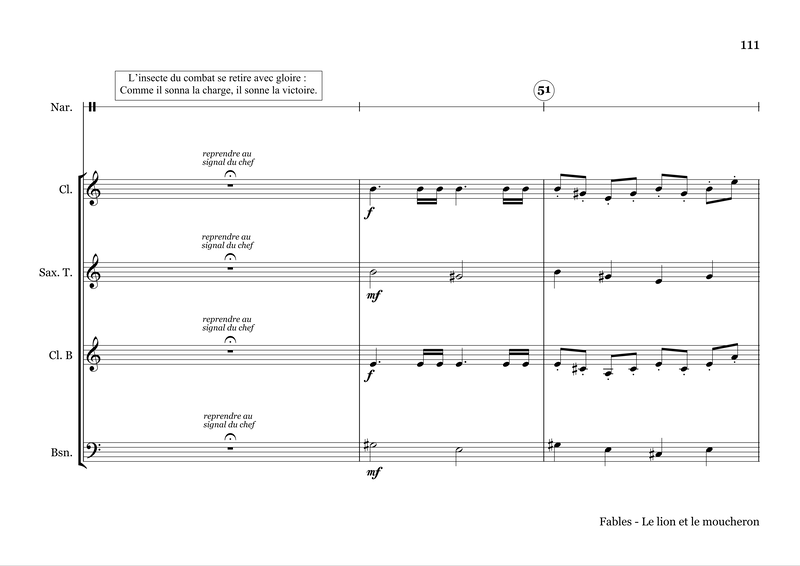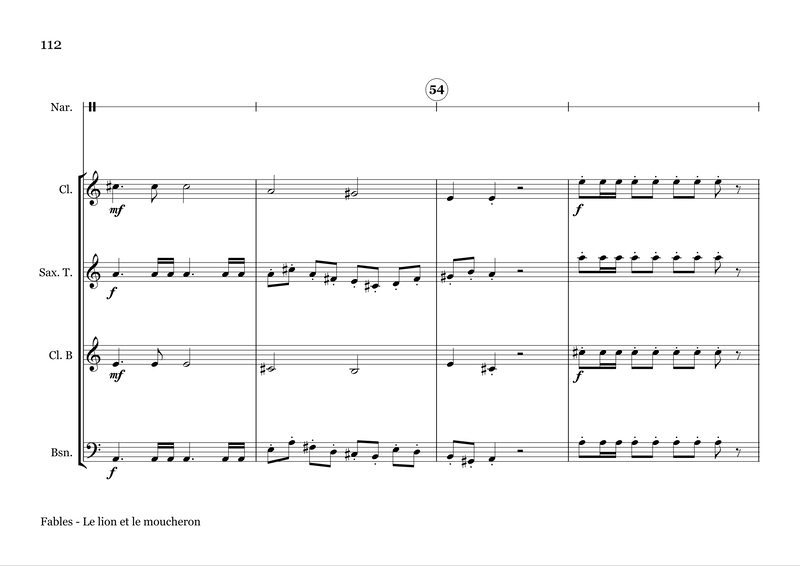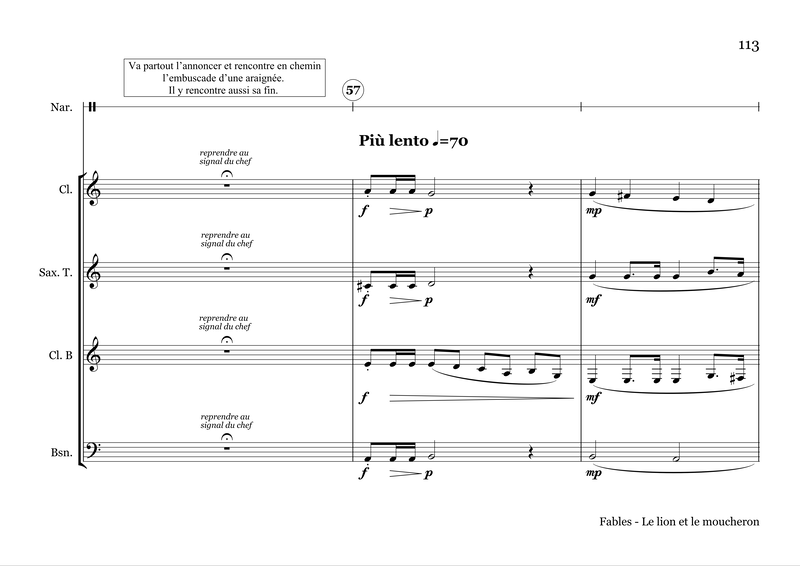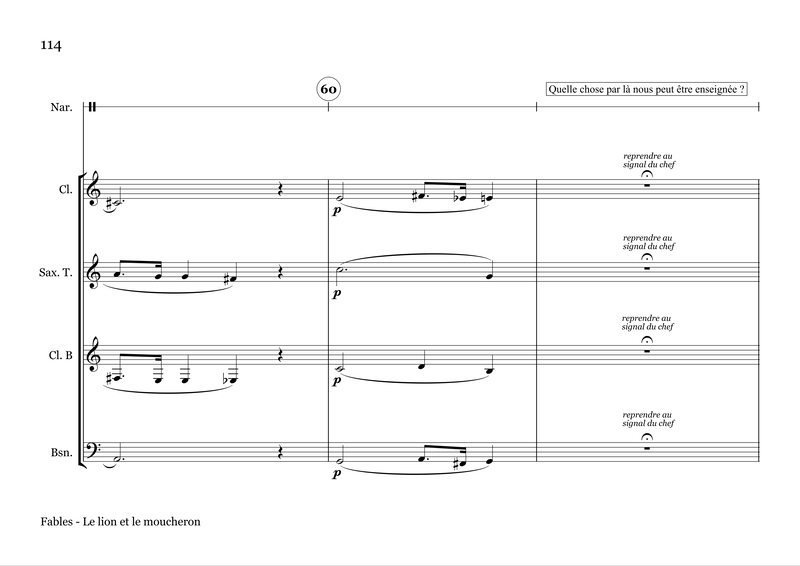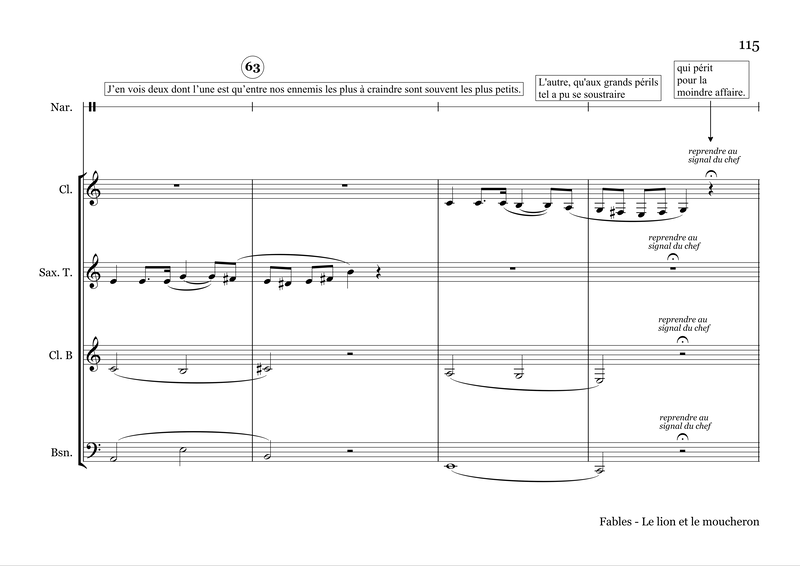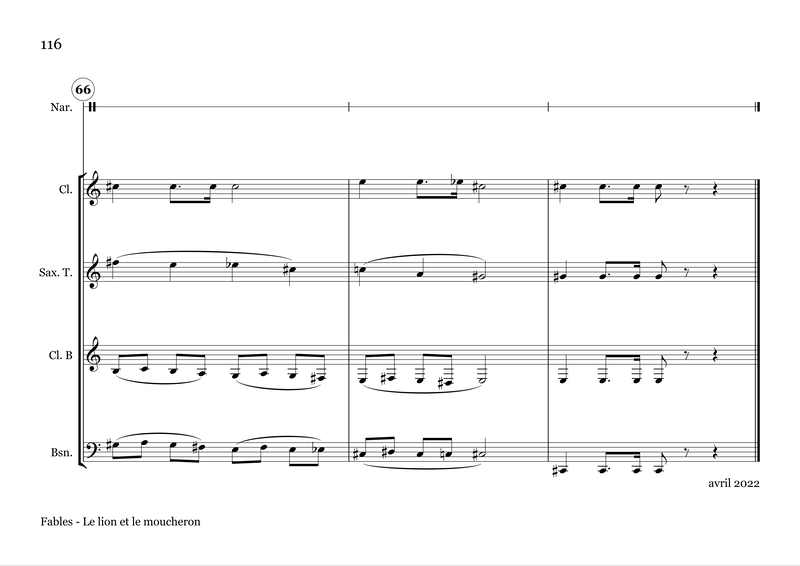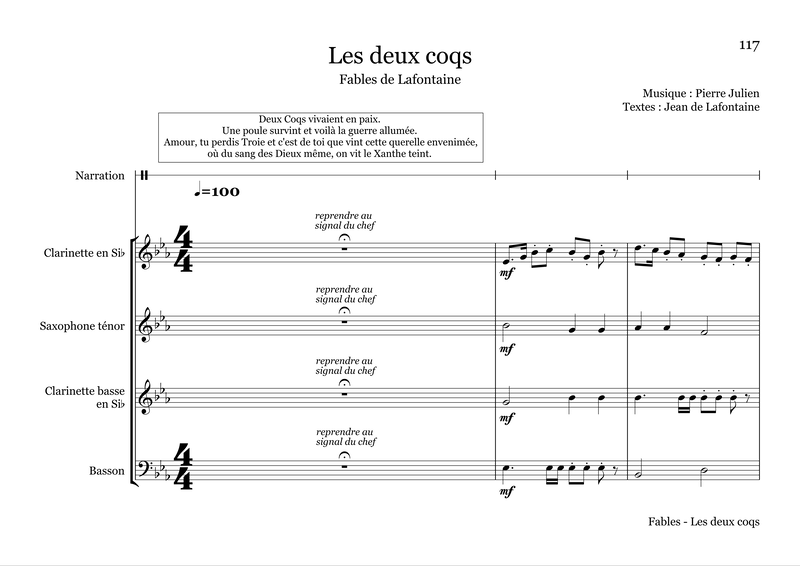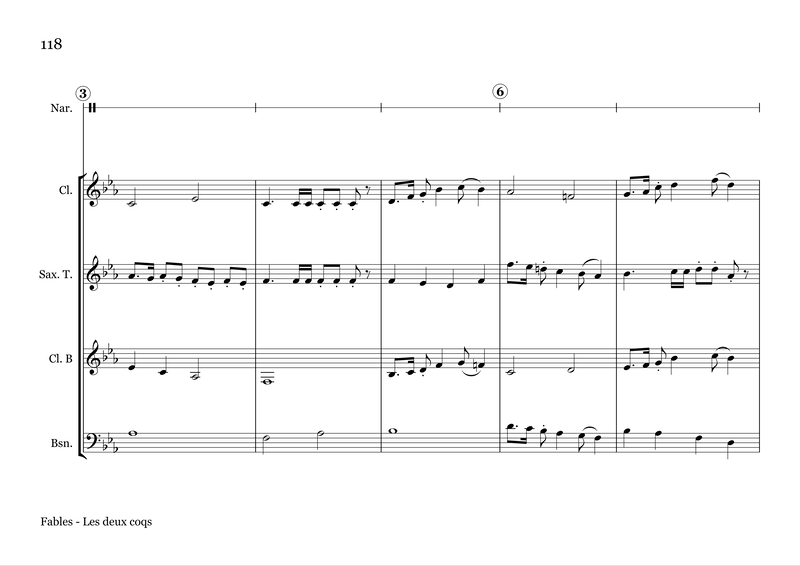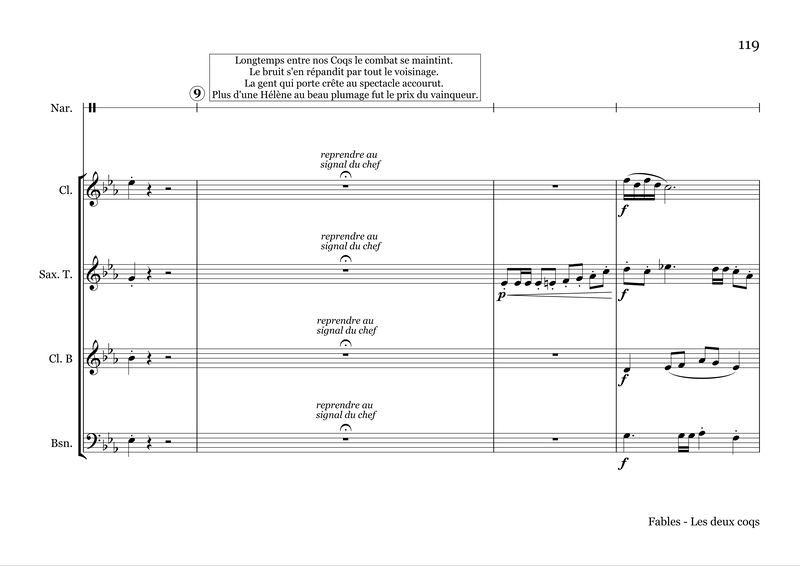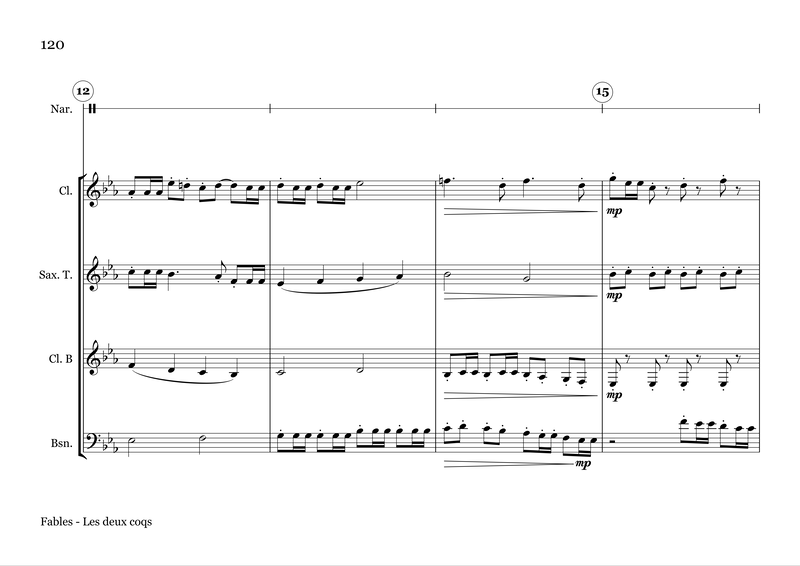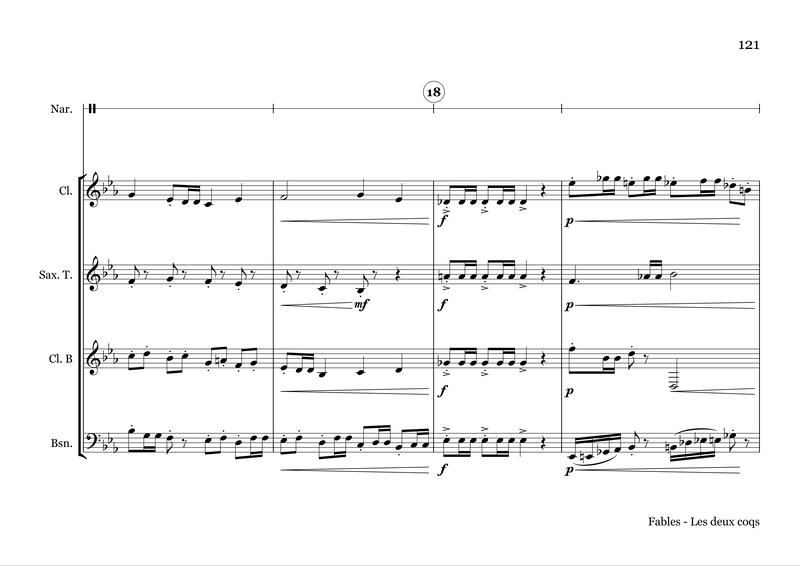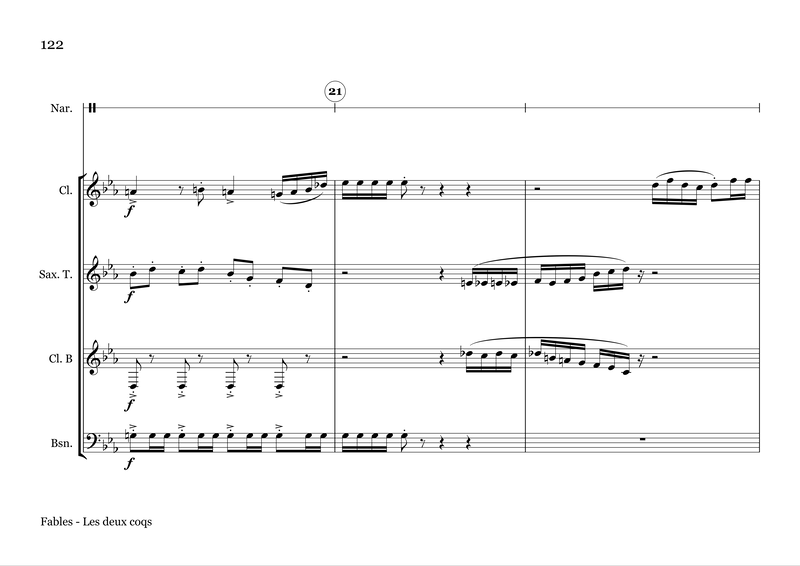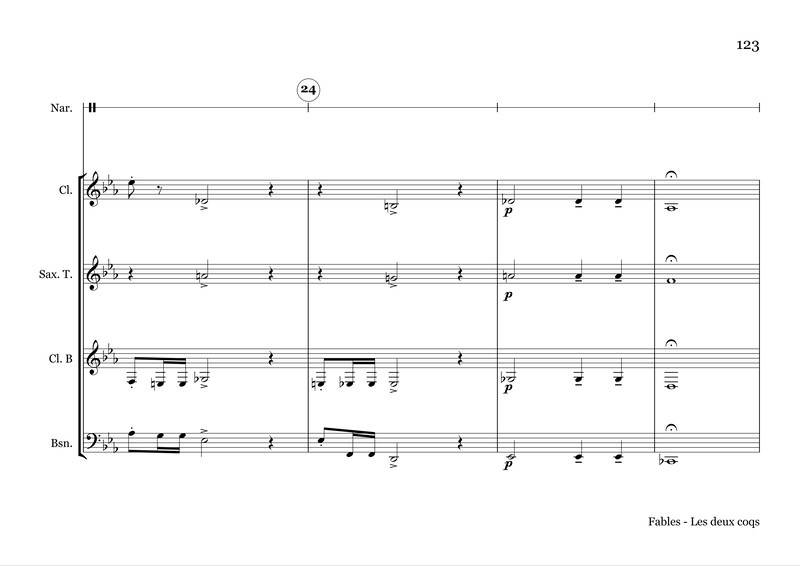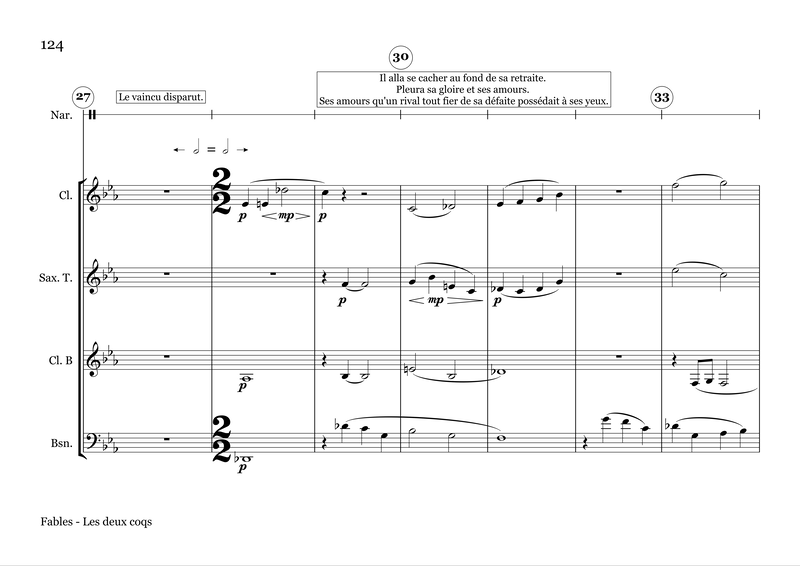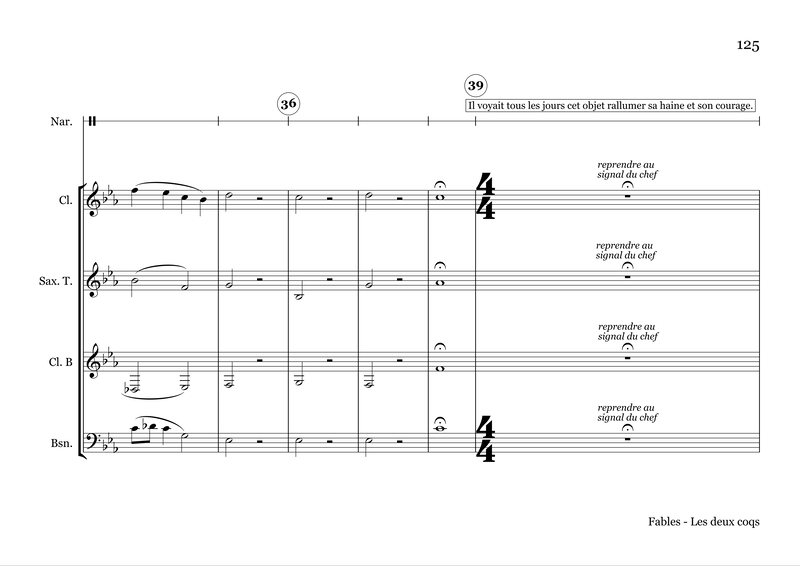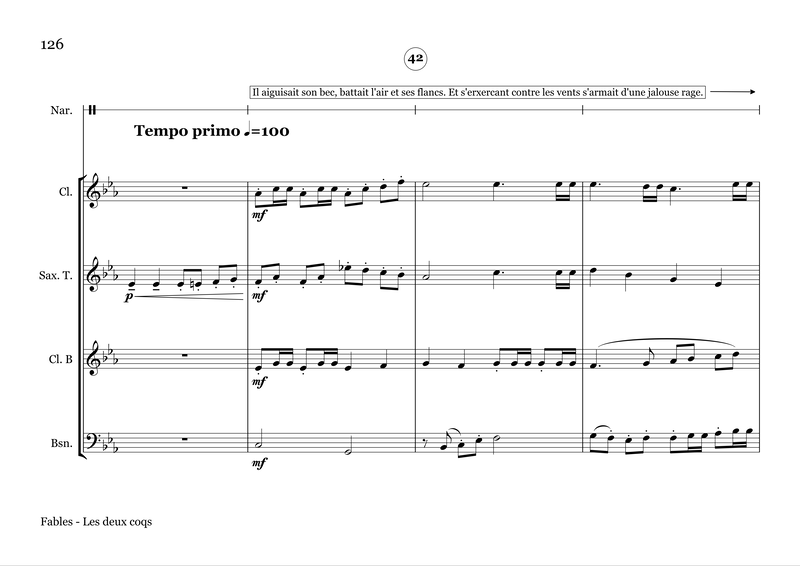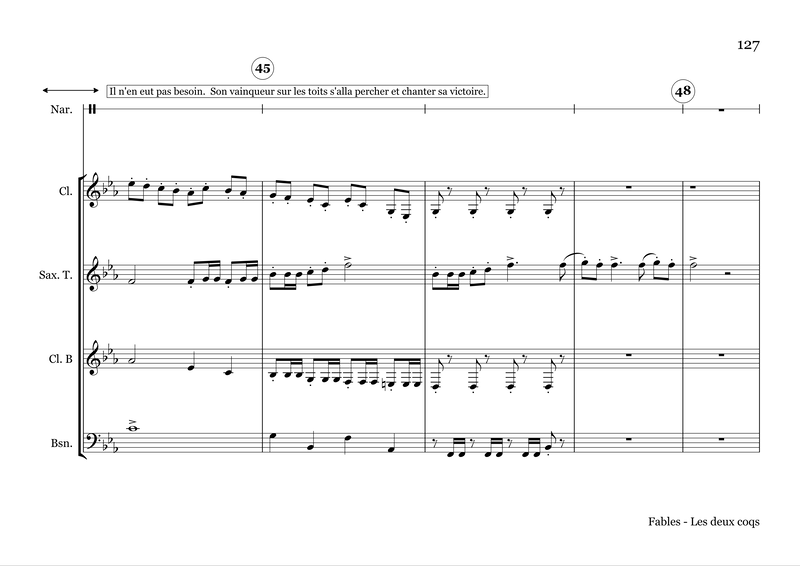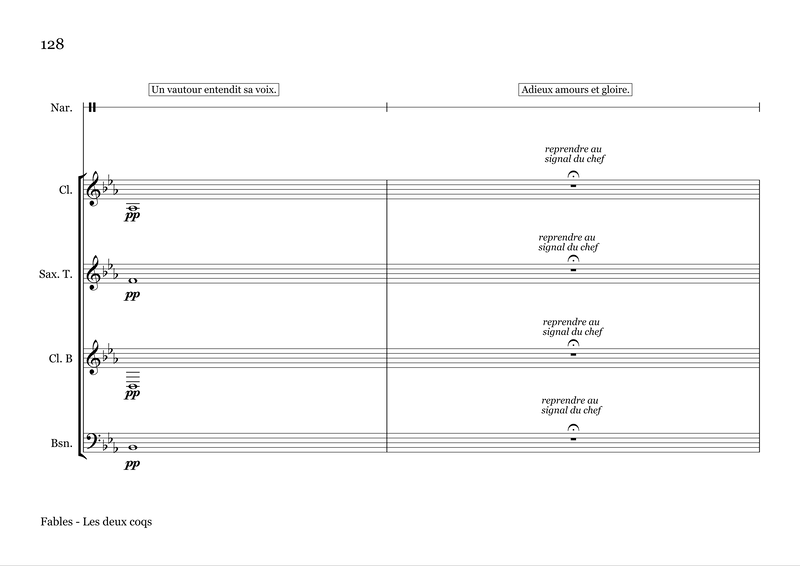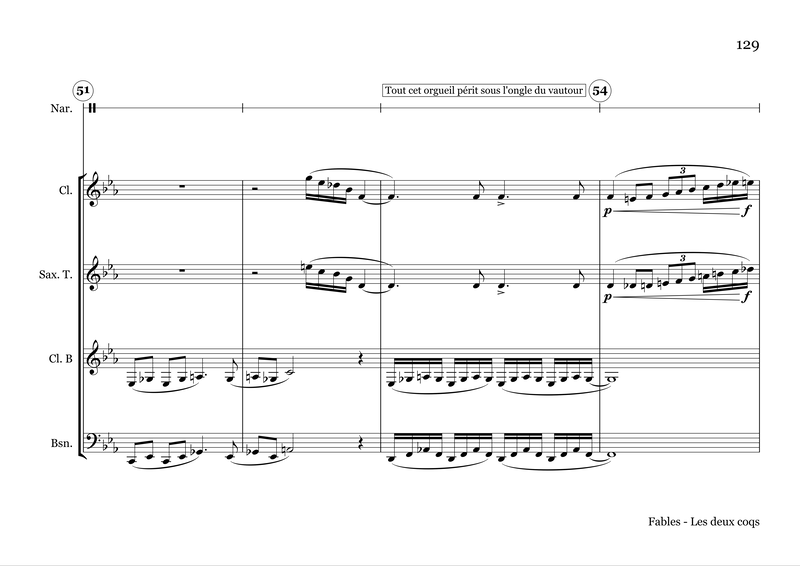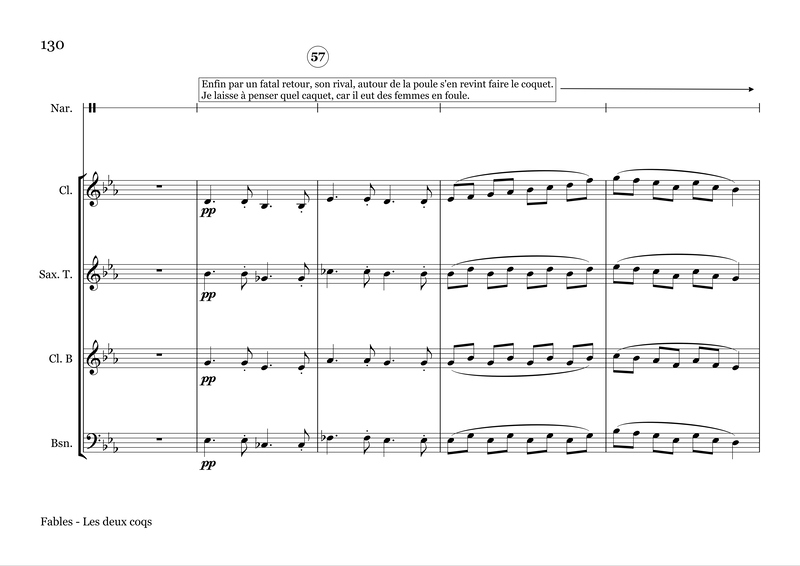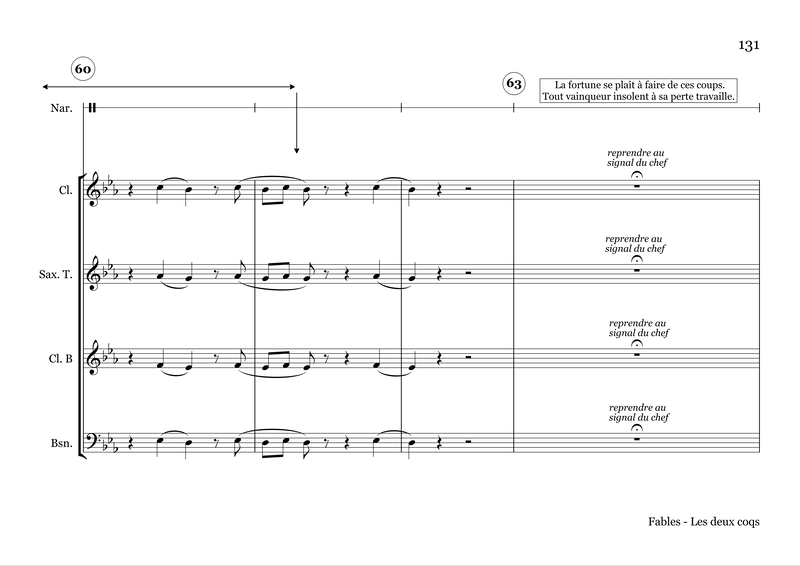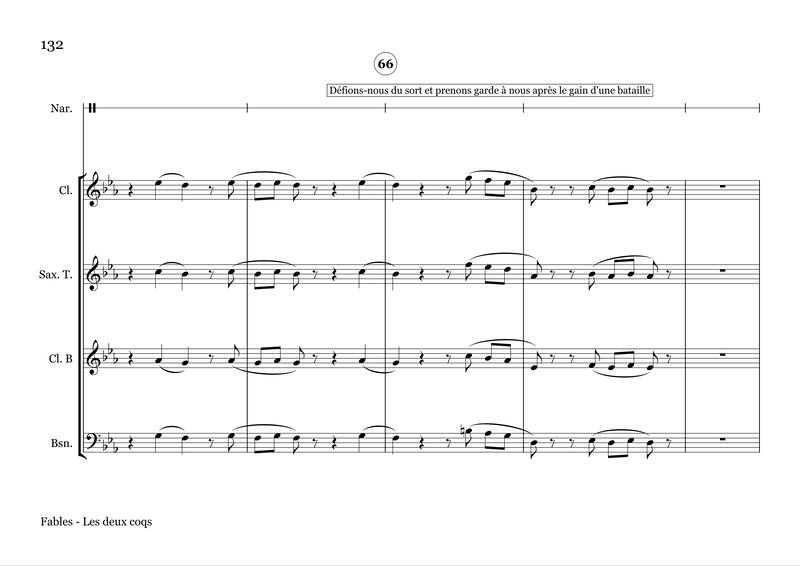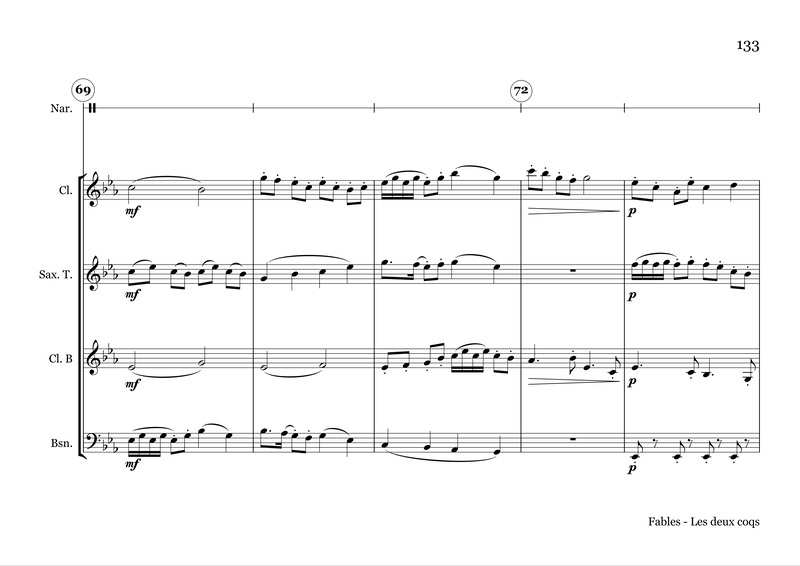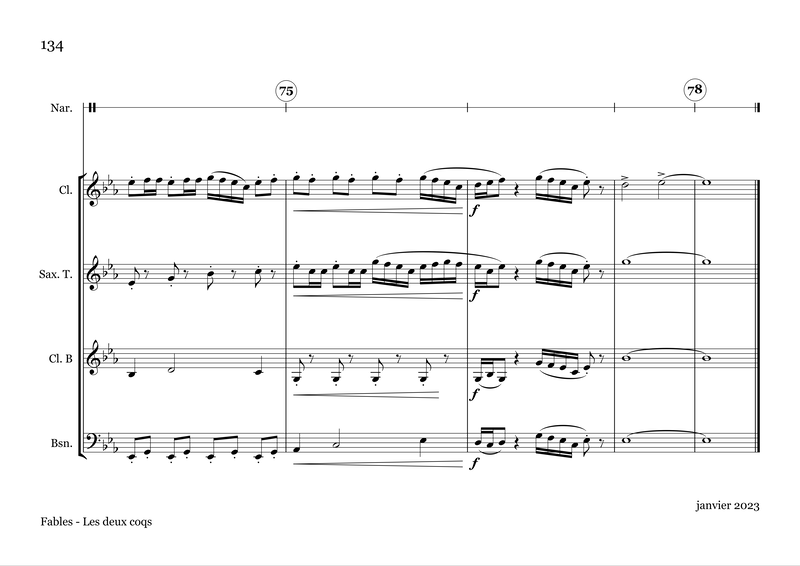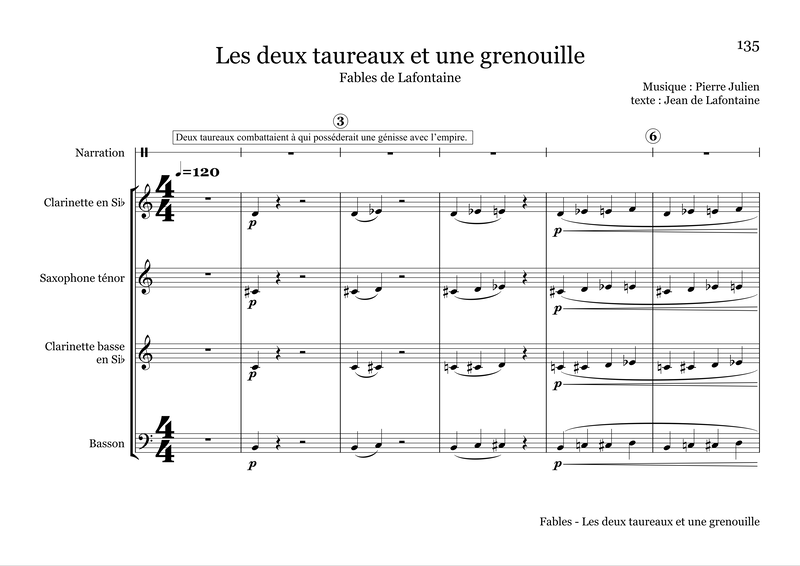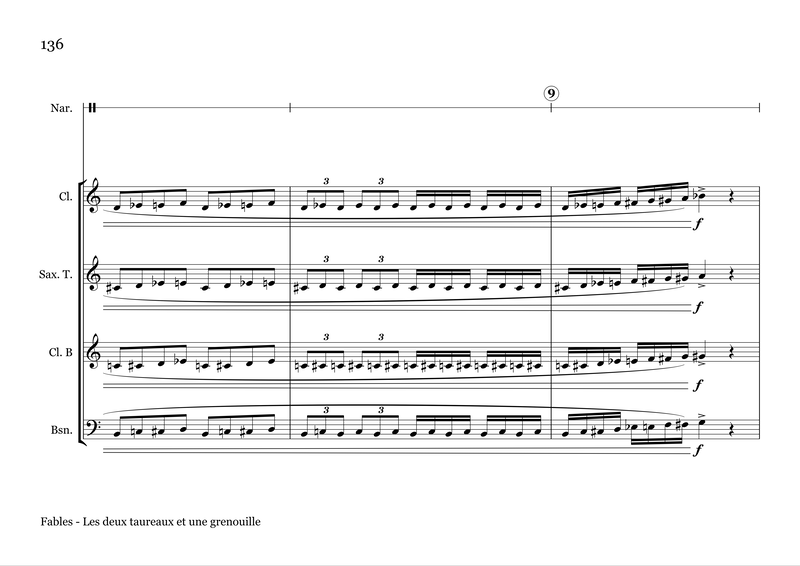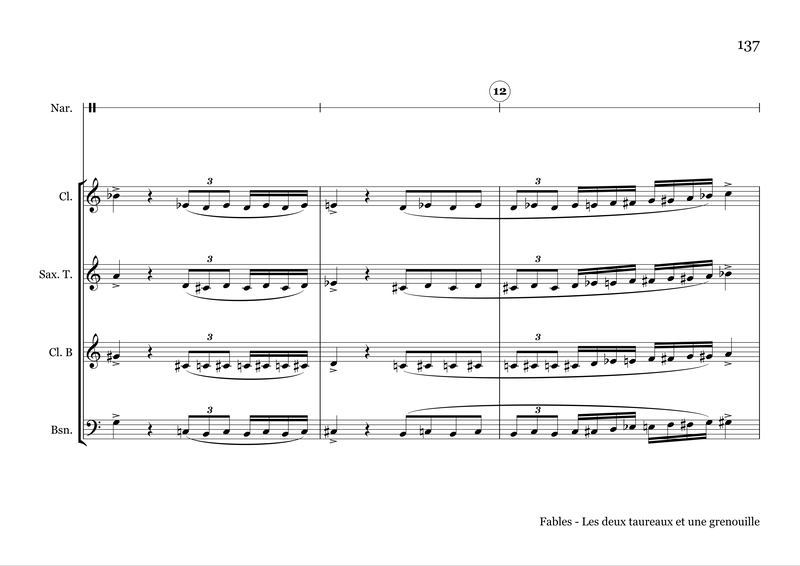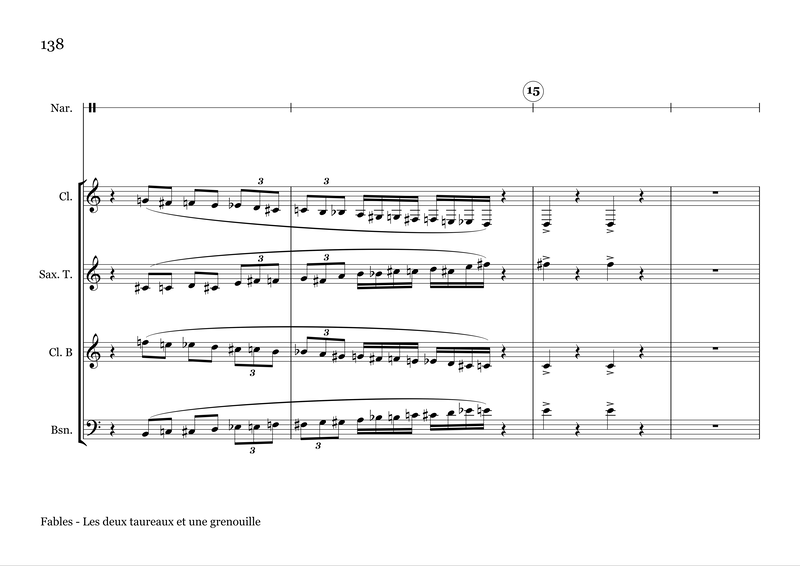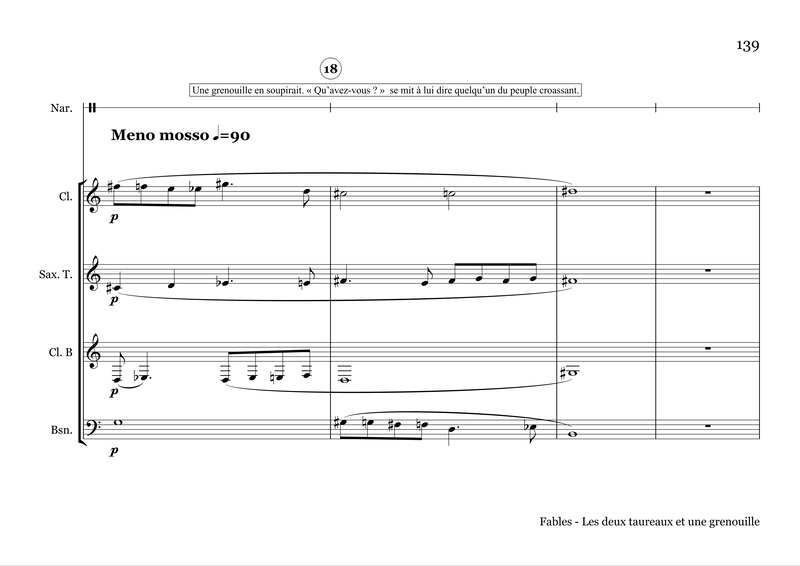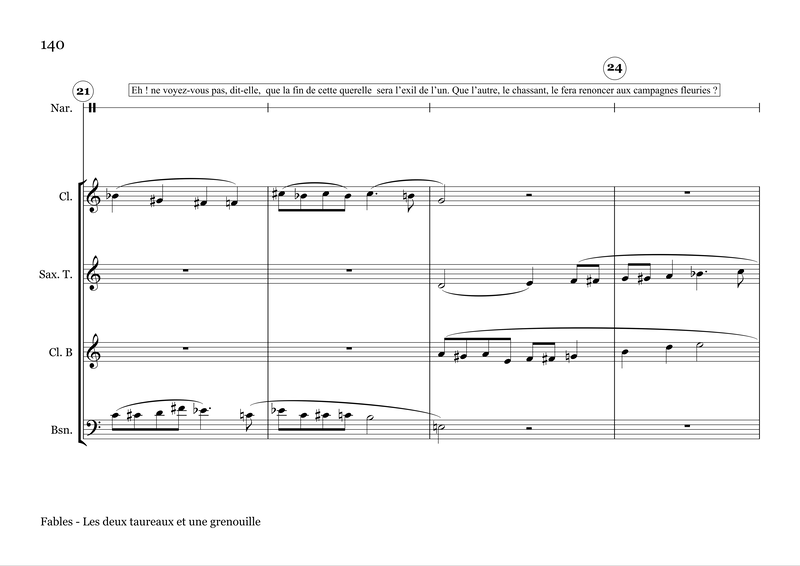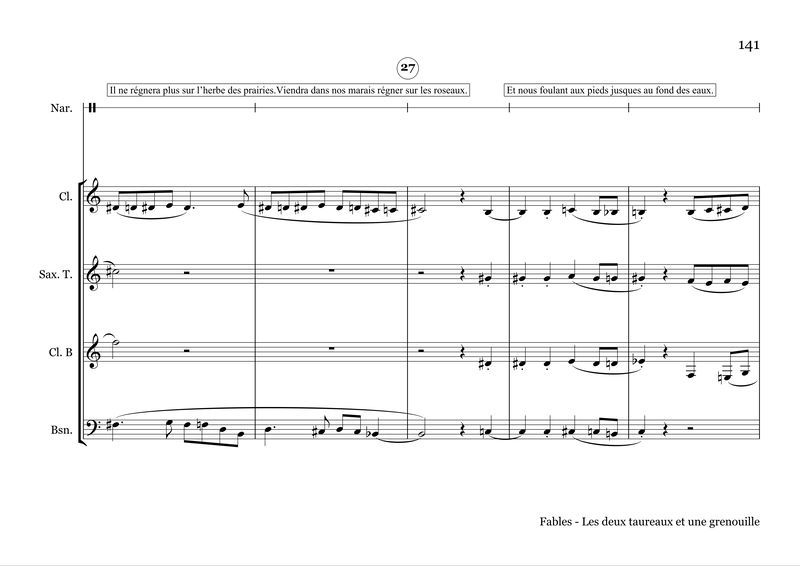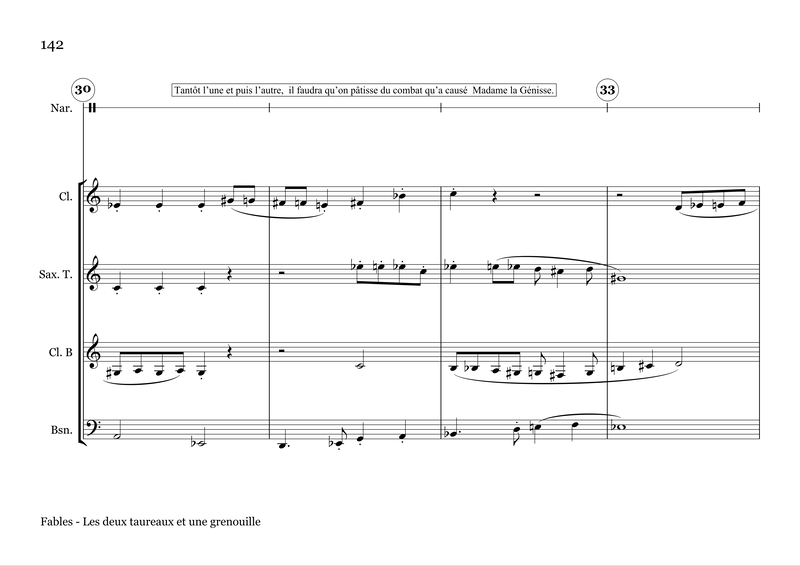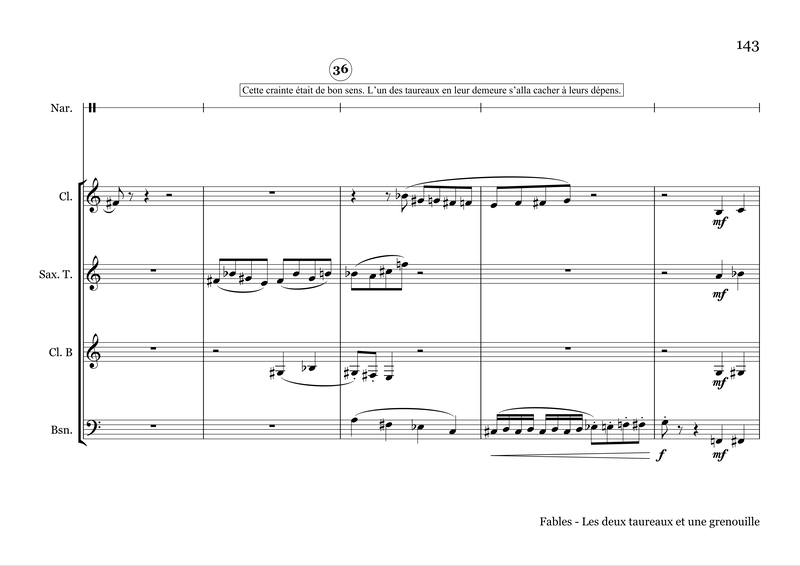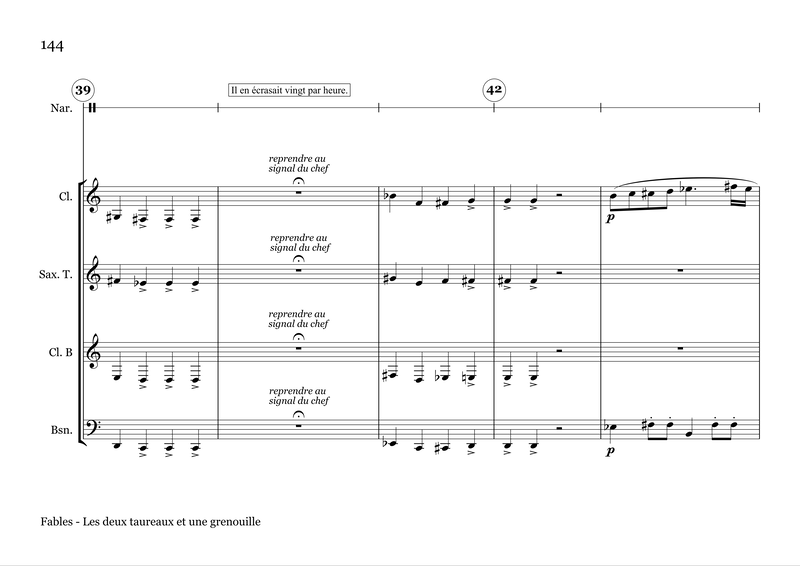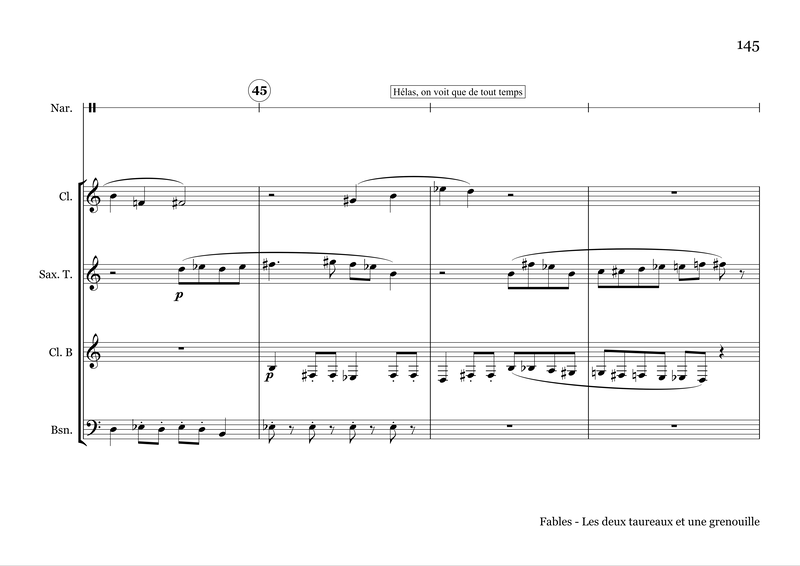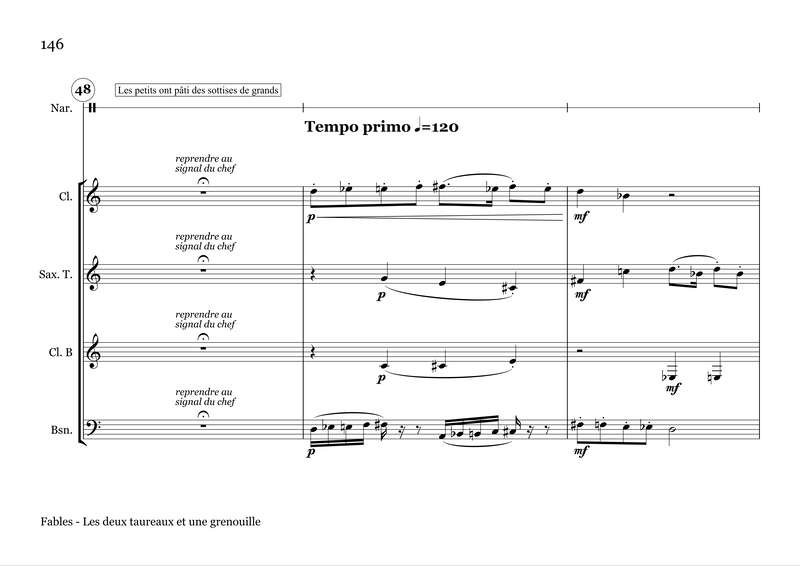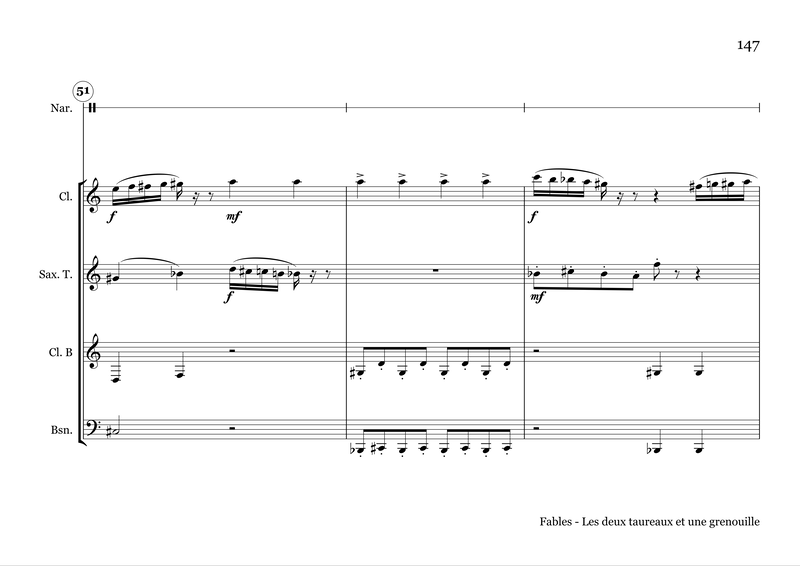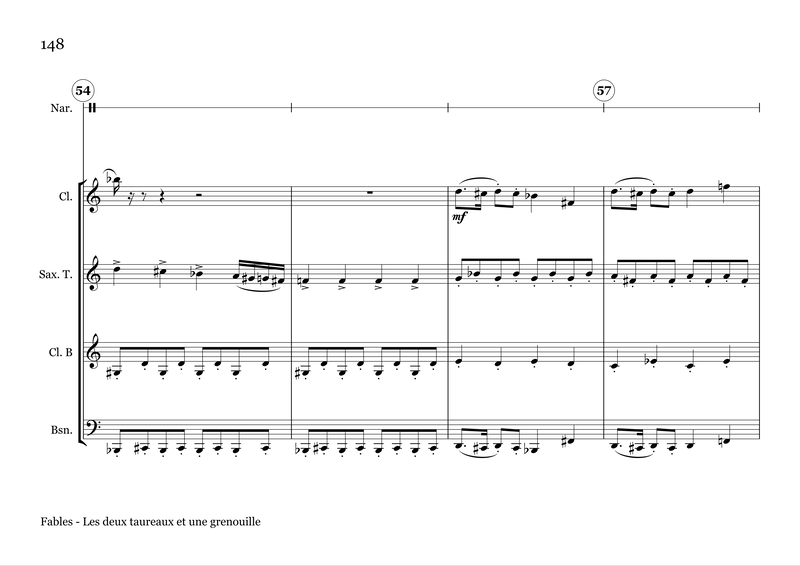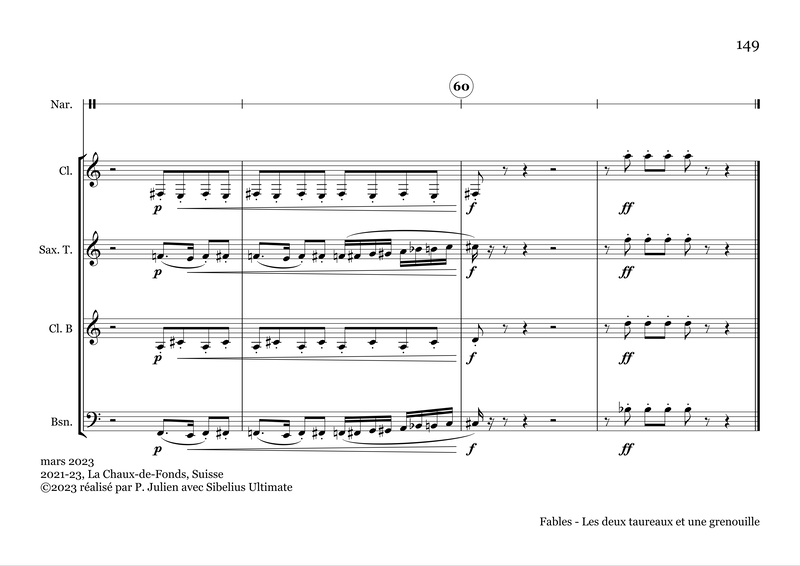Contemporary Classical
Compositions
Quintet
Fables op.56 (2021-2023)
dedicated to l'Ensemble 1ere classe
narrator, Bb clarinet, tenor saxophone, bass clarinet, bassoon
timing 31'30''
timing 31'30''
Fables Op.56 was composed between 2021 and 2023, for a project that unfortunately never saw the light of day. I decided to finish the pieces and integrate them into my catalog. Ten fables by Jean de la Fontaine were chosen and set to music for an instrumental quartet and narrator. For this version, I recited the texts myself. I wanted to compose music that could render "images" by trying to imagine as much as possible a suitable atmosphere for each fable.
scores in concert pitch
the fables are recited in French
The crow and the fox
Perch'd on a lofty oak,
Sir Raven held a lunch of cheese;
Sir Fox, who smelt it in the breeze,
Thus to the holder spoke:--
'Ha! how do you do, Sir Raven?
Well, your coat, sir, is a brave one!
So black and glossy, on my word, sir,
With voice to match, you were a bird, sir,
Well fit to be the Phoenix of these days.'
Sir Raven, overset with praise,
Must show how musical his croak.
Down fell the luncheon from the oak;
Which snatching up, Sir Fox thus spoke:--
'The flatterer, my good sir,
Aye liveth on his listener;
Which lesson, if you please,
Is doubtless worth the cheese.'
A bit too late, Sir Raven swore
The rogue should never cheat him more.
The grasshopper and the ant
A Grasshopper gay
Sang the summer away,
And found herself poor
By the winter's first roar.
Of meat or of bread,
Not a morsel she had!
So a begging she went,
To her neighbour the ant,
For the loan of some wheat,
Which would serve her to eat,
Till the season came round.
'I will pay you,' she saith,
'On an animal's faith,
Double weight in the pound
Ere the harvest be bound.'
The ant is a friend
(And here she might mend)
Little given to lend.
'How spent you the summer?'
Quoth she, looking shame
At the borrowing dame.
'Night and day to each comer
I sang, if you please.'
'You sang! I'm at ease;
For 'tis plain at a glance,
Now, ma'am, you must dance.'
The fox and the stork
Old Mister Fox was at expense, one day,
To dine old Mistress Stork.
The fare was light, was nothing, sooth to say,
Requiring knife and fork.
That sly old gentleman, the dinner-giver,
Was, you must understand, a frugal liver.
This once, at least, the total matter
Was thinnish soup served on a platter,
For madam's slender beak a fruitless puzzle,
Till all had pass'd the fox's lapping muzzle.
But, little relishing his laughter,
Old gossip Stork, some few days after,
Return'd his Foxship's invitation.
Without a moment's hesitation,
He said he'd go, for he must own he
Ne'er stood with friends for ceremony.
And so, precisely at the hour,
He hied him to the lady's bower;
Where, praising her politeness,
He finds her dinner right nice.
Its punctuality and plenty,
Its viands, cut in mouthfuls dainty,
Its fragrant smell, were powerful to excite,
Had there been need, his foxish appetite.
But now the dame, to torture him,
Such wit was in her,
Served up her dinner
In vases made so tall and slim,
They let their owner's beak pass in and out,
But not, by any means, the fox's snout!
All arts without avail,
With drooping head and tail,
As ought a fox a fowl had cheated,
The hungry guest at last retreated.
Ye knaves, for you is this recital,
You'll often meet Dame Stork's requital.
The hare and the tortoise
To win a race, the swiftness of a dart Availeth not without a timely start. The hare and tortoise are my witnesses. Said tortoise to the swiftest thing that is, 'I'll bet that you'll not reach, so soon as I The tree on yonder hill we spy.' 'So soon! Why, madam, are you frantic?' Replied the creature, with an antic; 'Pray take, your senses to restore, A grain or two of hellebore.' 'Say,' said the tortoise, 'what you will; I dare you to the wager still.' 'Twas done; the stakes were paid, And near the goal tree laid-- Of what, is not a question for this place, Nor who it was that judged the race. Our hare had scarce five jumps to make, Of such as he is wont to take, When, starting just before their beaks He leaves the hounds at leisure, Thence till the kalends of the Greeks, The sterile heath to measure. Thus having time to browse and doze, And list which way the zephyr blows, He makes himself content to wait, And let the tortoise go her gait In solemn, senatorial state. She starts; she moils on, modestly and lowly, And with a prudent wisdom hastens slowly; But he, meanwhile, the victory despises, Thinks lightly of such prizes, Believes it for his honour To take late start and gain upon her. So, feeding, sitting at his ease, He meditates of what you please, Till his antagonist he sees Approach the goal; then starts, Away like lightning darts: But vainly does he run; The race is by the tortoise won. Cries she, 'My senses do I lack? What boots your boasted swiftness now? You're beat! and yet, you must allow, I bore my house upon my back.'
The lion and the rat
To show to all your kindness, it behoves:
There's none so small but you his aid may need.
I quote two fables for this weighty creed,
Which either of them fully proves.
From underneath the sward
A rat, quite off his guard,
Popp'd out between a lion's paws.
The beast of royal bearing
Show'd what a lion was
The creature's life by sparing--
A kindness well repaid;
For, little as you would have thought
His majesty would ever need his aid,
It proved full soon
A precious boon.
Forth issuing from his forest glen,
T' explore the haunts of men,
In lion net his majesty was caught,
From which his strength and rage
Served not to disengage.
The rat ran up, with grateful glee,
Gnaw'd off a rope, and set him free.
By time and toil we sever
What strength and rage could never
The cock and the fox
Upon a tree there mounted guard
A veteran cock, adroit and cunning;
When to the roots a fox up running,
Spoke thus, in tones of kind regard:--
'Our quarrel, brother, 's at an end;
Henceforth I hope to live your friend;
For peace now reigns
Throughout the animal domains.
I bear the news:--come down, I pray,
And give me the embrace fraternal;
And please, my brother, don't delay.
So much the tidings do concern all,
That I must spread them far to-day.
Now you and yours can take your walks
Without a fear or thought of hawks.
And should you clash with them or others,
In us you'll find the best of brothers;--
For which you may, this joyful night,
Your merry bonfires light.
But, first, let's seal the bliss
With one fraternal kiss.'
'Good friend,' the cock replied, 'upon my word,
A better thing I never heard;
And doubly I rejoice
To hear it from your voice;
And, really there must be something in it,
For yonder come two greyhounds, which I flatter
Myself are couriers on this very matter.
They come so fast, they'll be here in a minute.
I'll down, and all of us will seal the blessing
With general kissing and caressing.'
'Adieu,' said fox; 'my errand's pressing;
I'll hurry on my way,
And we'll rejoice some other day.'
So off the fellow scamper'd, quick and light,
To gain the fox-holes of a neighbouring height,
Less happy in his stratagem than flight.
The cock laugh'd sweetly in his sleeve;--
'Tis doubly sweet deceiver to deceive.
The hare and the frogs
Once in his bed deep mused the hare,
(What else but muse could he do there?)
And soon by gloom was much afflicted;--
To gloom the creature's much addicted.
'Alas! these constitutions nervous,'
He cried, 'how wretchedly they serve us!
We timid people, by their action,
Can't eat nor sleep with satisfaction;
We can't enjoy a pleasure single,
But with some misery it must mingle.
Myself, for one, am forced by cursed fear
To sleep with open eye as well as ear.
"Correct yourself," says some adviser.
Grows fear, by such advice, the wiser?
Indeed, I well enough descry
That men have fear, as well as I.'
With such revolving thoughts our hare
Kept watch in soul-consuming care.
A passing shade, or leaflet's quiver
Would give his blood a boiling fever.
Full soon, his melancholy soul
Aroused from dreaming doze
By noise too slight for foes,
He scuds in haste to reach his hole.
He pass'd a pond; and from its border bogs,
Plunge after plunge, in leap'd the timid frogs,
'Aha! I do to them, I see,'
He cried, 'what others do to me.
The sight of even me, a hare,
Sufficeth some, I find, to scare.
And here, the terror of my tramp
Hath put to rout, it seems, a camp.
The trembling fools! they take me for
The very thunderbolt of war!
I see, the coward never skulk'd a foe
That might not scare a coward still below.'
The lion and the gnat
'Go, paltry insect, nature's meanest brat!'
Thus said the royal lion to the gnat.
The gnat declared immediate war.
'Think you,' said he, 'your royal name
To me worth caring for?
Think you I tremble at your power or fame?
The ox is bigger far than you;
Yet him I drive, and all his crew.'
This said, as one that did no fear owe,
Himself he blew the battle charge,
Himself both trumpeter and hero.
At first he play'd about at large,
Then on the lion's neck, at leisure, settled,
And there the royal beast full sorely nettled.
With foaming mouth, and flashing eye,
He roars. All creatures hide or fly,--
Such mortal terror at
The work of one poor gnat!
With constant change of his attack,
The snout now stinging, now the back,
And now the chambers of the nose;
The pigmy fly no mercy shows.
The lion's rage was at its height;
His viewless foe now laugh'd outright,
When on his battle-ground he saw,
That every savage tooth and claw
Had got its proper beauty
By doing bloody duty;
Himself, the hapless lion, tore his hide,
And lash'd with sounding tail from side to side.
Ah! bootless blow, and bite, and curse!
He beat the harmless air, and worse;
For, though so fierce and stout,
By effort wearied out,
He fainted, fell, gave up the quarrel.
The gnat retires with verdant laurel.
Now rings his trumpet clang,
As at the charge it rang.
But while his triumph note he blows,
Straight on our valiant conqueror goes
A spider's ambuscade to meet,
And make its web his winding-sheet.
We often have the most to fear
From those we most despise;
Again, great risks a man may clear,
Who by the smallest dies.
The two cocks
Two cocks in peace were living, when
A war was kindled by a hen.
O love, thou bane of Troy! 'twas thine
The blood of men and gods to shed
Enough to turn the Xanthus red
As old Port wine!
And long the battle doubtful stood:
(I mean the battle of the cocks;)
They gave each other fearful shocks:
The fame spread o'er the neighbourhood,
And gather'd all the crested brood.
And Helens more than one, of plumage bright,
Led off the victor of that bloody fight.
The vanquish'd, drooping, fled,
Conceal'd his batter'd head,
And in a dark retreat
Bewail'd his sad defeat.
His loss of glory and the prize
His rival now enjoy'd before his eyes.
While this he every day beheld,
His hatred kindled, courage swell'd:
He whet his beak, and flapp'd his wings,
And meditated dreadful things.
Waste rage! His rival flew upon a roof
And crow'd to give his victory proof.--
A hawk this boasting heard:
Now perish'd all his pride,
As suddenly he died
Beneath that savage bird.
In consequence of this reverse,
The vanquish'd sallied from his hole,
And took the harem, master sole,
For moderate penance not the worse.
Imagine the congratulation,
The proud and stately leading,
Gallanting, coaxing, feeding,
Of wives almost a nation!
'Tis thus that Fortune loves to flee
The insolent by victory.
We should mistrust her when we beat,
Lest triumph lead us to defeat.
Two bulls and a frog
Two bulls engaged in shocking battle,
Both for a certain heifer's sake,
And lordship over certain cattle,
A frog began to groan and quake.
'But what is this to you?'
Inquired another of the croaking crew.
'Why, sister, don't you see,
The end of this will be,
That one of these big brutes will yield,
And then be exiled from the field?
No more permitted on the grass to feed,
He'll forage through our marsh, on rush and reed;
And while he eats or chews the cud,
Will trample on us in the mud.
Alas! to think how frogs must suffer
By means of this proud lady heifer!'
This fear was not without good sense.
One bull was beat, and much to their expense;
For, quick retreating to their reedy bower,
He trod on twenty of them in an hour.
Of little folks it oft has been the fate
To suffer for the follies of the great.
